
- How to – guides
- Skills List
- How to – guides
- North America
- South America

Work and Travel in Japan
Help us grow. share what you know about getting work in japan for travellers., volunteer and paid work opportunities in japan for travellers.
Many foreigners, hold a lifelong desire to travel to Japan, perhaps because the culture is so unique and exotic, especially for westerners. It has a reputation for being expensive and difficult for outsiders to assimilate into, so it’s best to be well-prepared before attempting to work and travel here. However, for those that are willing to push through the culture shock, the rewards for working and travelling in Japan can be great. Read on through our guide to making the most of your adventure in the Land of the Rising Sun. 1. Work in IT in Japan The tech field, of course, is constantly expanding and evolving, and Japan is a country often on the cutting-edge of technological advances. If you have good programming or software engineering skills, you can often find work without speaking much Japanese, which is generally a barrier to entry for many foreigners seeking work in Japan. 2. Teaching English at cram schools Teaching English as a native speaker is the most common position for foreigners looking to work and travel in Japan. The jobs often don’t pay very well, but backpackers can find work teaching at any time of year, and therefore is a great starting point for new arrivals looking to learn about Japanese culture. 3. Caregiving in an ageing home It is common knowledge that Japan has the highest proportion of elderly citizens of any country in the world. This has created a busy and booming market for elder care, since many young people in the big cities live in cramped apartments are too busy with work to keep their parents at home. If you enjoy working with older people, you don’t necessarily need any experience or even great Japanese language skills to start working in elder care in Japan.
VOLUNTEER WORK VISA / PERMIT REQUIREMENTS FOR JAPAN
Japan allows several nationalities from having to obtain a tourist visa before entering the country. Citizens from most European countries, United States, Australia, and Argentina do not need to get the Japan Tourist Visa since they are considered visa-exempt countries for tourism purposes. Nationals from any of those regions can stay in Japan for a maximum of 90 days visa-free and are assigned Temporary Visitor status. Under the single-entry regulation, tourists can remain in Japan for up to 30 days, but this tourist visa is valid for a period of up to 90 days. Tourists can also apply for a double-entry visa for 2 short trips within a 6-month period. An E-Visa option is upcoming, but has yet to be released, likely due to the pandemic. Citizens of China, Russia, the Phillippines, Vietnam and CIS countries will need a tourist visa sorted before entering the country.
SEASONAL BACKPACKER SKILLS NEEDED IN JAPAN
Spring work.
For being a relatively small, island-based country, Japan enjoys a wide variety of climates. Visitors are attracted not only to the cities but to mountain resorts and organic farms in small rural villages. Backpackers have their choice from a variety of beautiful locations when finding work in hospitality. Springtime is the best point in the year to find hospitality work, with many visitors coming over to witness the cherry blossoms but before western tourists start to arrive on summer vacation en masse. There are hotels alongside hot springs where you can volunteer in exchange for a bed, as well as hostels in the big city of Hokkaido where you can learn the art of running a hostel.
SUMMER JOBS
We recommend finding a work and travel opportunity at one of Japan’s many organic farms in the summer months. There are the usual fruit and vegetable farms, but also bee farms where honey is harvested, and terraced farms for rice. You’ll learn unique growing methods that will give you an edge back home if you decide to continue in the gardening or landscaping field. Just be aware that summers in Japan can be extremely hot, so you should be in good physical condition.
Many people say autumn is the best time of year to visit Japan, since the weather is at its most pleasant and mild. It’s a great time to join historical conservation projects in the country. You’ll have the option of working in far off temples or hosting groups that visit these sites. All you need to partake in these projects is an interest in history and a willingness to work.
Japan has proudly hosted the winter Olympics before, and it is clear to see why - the ski resorts are very popular. Backpackers can find work and travel opportunities at these places in Nagano, Niigata, and Yamagata prefecture, even if you don’t have any winter sports experience. How? Often au pairs are needed to watch after children, or chalet cleaners to keep the resorts clean.
ATTITUDE TO FOREIGNERS WORKING OR VOLUNTEERING IN JAPAN
Japan is an extremely modern country, with all the comforts of home and then some. You shouldn’t have any concerns about health issues or safety while working and travelling in Japan. The challenges for a foreigner in Japan come with understanding the nuances of social behaviour within the culture. As a westerner, it can be difficult to grasp the priority of “the group” over the individual. You must learn to respect these social constructs, however, or you will not be embraced by your employers. Some ex-pats complain that even after years of living in Japan and learning the language fluently, they never truly feel welcome. Japan is certainly an enticing and mysterious bucket-list country for working travellers. So the only question remains - are you ready to start planning your Japanese adventure?
Recent Contributors
- Edited on Jun 4 2021 by
If you have worked in Japan or live here. Instead of saying `That information is not right` Please sign up to Working Traveller by clicking here and update this page with your opinions on the subject and your views on what the barter points should be. If your a host, you will have a SEO link added to the page directly to your own web site so viewers can see who provided the information. If you are a traveller it will link to your profile.

- Fukuoka-shi
- Hiroshima-shi
- Yokohama-shi
- Fukuoka-ken
- Fukushima-ken
- Ibaraki-ken
- Ishikawa-ken
- Kanagawa-ken
- Kumamoto-ken
- Miyazaki-ken
- Nagasaki-ken
- Niigata-ken
- Okayama-ken
- Okinawa-ken
- Saitama-ken
- Shizuoka-ken
- Tochigi-ken
- Tottori-ken
- Wakayama-ken
- Yamagata-ken
- Yamaguchi-ken
- Yamanashi-ken
WORKING TRAVELLER LTD 27, Lonsdale Rd, Blackpool, FY1 6EE, UNITED KINGDOM
Work and travel the world using your skills to gain work experience and references for a good job back home
Log in with your credentials, forgot your details.
- EN - English
- PT - Portuguese
- ES - Spanish
- How it works
- Become a Host
- Download the app
Top Destinations
- United States
- United Kingdom
What type of experience are you looking for?
- Non-Profit School
- Permaculture project
- Eco Village
- Holistic Center
- Guest House
- How Worldpackers works

Learn from the most experienced travelers of the community
Traveling with worldpackers, planning and budgeting for travel, make a living while traveling as a lifestyle, travel with worldpackers.
- Using Worldpackers
Work exchange
- Social impact
Plan your trip
- Women traveling
- Budget travel
- Solo travel
- Language learning
- Travel tips
- Get inspired
- Digital nomads
- Travel jobs
- Personal development
- Responsible travel
- Connect with nature
Top destinations
- South America
- Central America
- North America
- More destinations
- WP Life WP Life
- Exclusive discounts Discounts
Filtering by:
Destination.
- Chōsei District
- Iwanai District
- Minamikoma District
- Tone District
- Agatsuma District
- Haginochaya
- Hatsukaichi
- Kamikawa District
- Kitaazumi District
- Kitahama,Beppu
- Kumage District
- Minamitsuru District
- Minamiuonuma District
- Nakagami District
- Ochi District
- Takaoka District
Program Types
Exchange your skills for accommodation
Higher chance of approval
Hosts that recently have approved volunteers and are looking for more applications
Hosts that have good ratings and receive many worldpackers
Opportunities for couples and pairs
Hosts that welcome couples or two friends traveling together
Purpose of the trip
- Connect with the locals
- Immerse yourself in the local culture
- Connect with international travelers
- Practice English
- Expand your social consciousness
- Make a real social impact
- Expand your environmental consciousness
- Practice Spanish
- Learn about sustainability
Availability
Last minute.
Needs help immediately
How do you help
- Welcoming & Helping Guests
- Household Chores
- Building & Maintenance
- Kitchen & Bar Tasks
- Child or Elderly Care
- Communication & Marketing
- Arts & Culture
- Interacting & Entertaining Guests
- Housekeeping
- Kitchen Hand
- Painting & Decorating
- Building & Repairing
- Night Shift
- Teaching Languages
- Party Promoter
- Photography
- Video Making
- Administration
- Content Writer
- Social Media
- Social Work
- Teaching Sports
- Animal Care
- Private School
- Shared Home
- Contact with nature
- City & Town
- Adventure Sports
- Contact with animals
- Vegetarian / Vegan
- Yoga / Meditation
Hours of collaboration per week
Travel length.
Medium Term
- At least one
- All included
Accommodations
- Shared Dorm
- Private Room
Perfect for digital nomads
- Fast Internet Access
- Basic Internet Access
- Dedicated Workspace
Additional Benefits
- Use our equipped kitchen
- Free Laundry
- Bikes at your disposal
- Free Events
- Discounts on Drinks
- Get free drinks or beverages.
- Discounts on Accommodation
- Free Parties
- Language lessons
- Discounts on Restaurants
- Free Hiking Tours
- Discounts on Tours
- Discounts on Parties
- Discounts on Pubs
- Surf lessons
- Holistic Therapies
- Yoga classes
- Dance classes
Hostels, home stays and guest houses in Japan where you can exchange work for room and board
77 opportunities found

Hostel Nakagami District, Japan
Japanese learner welcomed at our hostel in Japan!
- Higher approval

Hostel Kitaazumi District, Japan
Winter season cleaning and clearing snow

Hostel nikko, Japan
Come help us in beautiful scenic natural riverside hiking area
A day in the life of a worldpacker.

First week volunteering in Thailand ✨

Volunteering on a farm in Croatia🐴

Volunteering in the Thai jungle ✨🍃

Volunteering at a shop in Finland 🌎✨

Guest House Ōtsu, Japan
Come help our guesthouse in Otsu, Japan!

Hostel Hakone, Japan
Enjoy outdoor hot spring every day! (Working Holiday Visa Holders Only)

Hostel Osaka, Japan
Cleaners wanted in friendly hostel in Osaka [Large size dorm bed]

Guest House Minamiuonuma District, Japan
Come help at a Japanese style inn in the countryside of Japan! :)

Guest House Hiroshima, Japan
Now recruiting guesthouse helpers in Hiroshima!

Homestay Fukuroi, Japan
Help around our garden and experience Japanese family house

Hostel Helper in Osaka city (It's needed working holiday visa)

Hotel Ochi District, Japan
Help in the morning, enjoy the afternoon on the island :)

Hostel Hiroshima, Japan
Help as a receptionist and cleaning staff

Let's enjoy interaction with guests from all over the world!!!

Hostel Nikko, Japan
Cleaning Helper ( Working Holiday Visa Holder ONLY)

Guest House Nagasaki, Japan
Help us with cleaning in Nagasaki, Japan! [Required work visa]

Homestay Iwanai District, Japan
All around player in a remote homestay in Japan - private room!
Join the community.
Create a free Worldpackers account to discover volunteer experiences perfect for you and get access to exclusive travel discounts!
How does Work Exchange work in Japan?
A work exchange trip is a type of trip where you’ll collaborate by performing some task in a hostel, guesthouse, or other type of lodging or institution. In exchange for your volunteer work, you’ll get accommodation and benefits. It can also happen in NGOs, farms, schools, communities, start-ups and more. Some hosts offer meals - from only one up to all meals in a day - and benefits like classes, free drinks, discounts or tours. It depends on each host and location. Work exchange is a cultural journey where mutual support, learning about new cultures and meeting people are the most valuable assets.
What is a work exchange and how does it work?
8 tips on how to immerse yourself in local culture (plus what NOT to do)
Best places to visit during my work and travel in Japan
If you’re doing summer work in Japan as a volunteer, you should visit Tokyo for a metropolis experience, but there are so many other interesting places in the country like Osaka, Nara, Arashiyama and of course Mount Fuji. Kyoto is also another interesting Japanese city. For several centuries it was the capital and cultural center, so palaces and temples are an inheritance of its rich history and are everywhere. Thus it’s not surprising that Kyoto is known as the "city of a thousand temples." Like the cold? Hokkaido is one of Japan’s most visited winter destinations, with ski resorts and volcanic hot springs. Hokkaido's ancient Ainu culture is like no other in Japan, so volunteering there is a great learning opportunity.
How to find cheap airfare anytime of year
Essential tips for traveling alone for the first time
How to find volunteer work exchange in Japan?
To find opportunities for work exchange in Japan, have a quick look at our host list. You can help with reception, administration, tour organizing, painting and decorating and a lot of other functions. Don’t worry about having previous experience. Work exchange isn’t about doing a perfect job, but learning by helping your host in the same way that your host can learn from you. In exchange for helping, you get accommodation and meals. Your host will offer you a shared dorm (with travelers and other volunteers), team dorm (just for staff and volunteers) or private room. Among the things you can earn in exchange for volunteer help are free laundry, bikes, free events and parties, language lessons, discounts on drinks, free tours, holistic therapies, surf lessons and more.
7 modern sabbatical ideas with Worldpackers
The best places to travel on a budget — an A-Z guide
How can I help at a Work Exchange program in Japan?
Fill in a japanese exchange teaching program application by talking to some of our hosts, especially schools, NGOs and other institutions that help people who don’t have the chance to pay for expensive english schools. Some hosts will ask you for a bit more information, some will be just happy to have you no matter what. Just know that you don’t need previous experience to teach English in Japan with Worldpackers! You can also help with other skills like cleaning, cooking, teaching art or sports, planting trees, talking about the environment, helping an animal shelter and much more. The sky's the limit, as long as you have energy and compassion to make the best of your work exchange in Japan!
Letter to my former self: 7 things I learned traveling
25 amazing adventures for solo travelers to meet like-minded people
Opportunities in Worldpackers to be a volunteer in Japan
With Worldpackers you can do volunteer work in Japan for a year, a month or a few weeks. You can travel as much as you want to any place you like, paying for membership just once a year. Worldpackers allows you to have an affordable trip, even to a country that is usually expensive for tourists, like Japan. Check our host list and talk to our experts for more info and to get all the information you need. Become a member and we’ll help you make your trip happen ;)
How Worldpackers works: the complete guide
How do Worldpackers trips work?
As a member, you can contact as many hosts and travel safely as many times as you want.
Choose your plan to travel with Worldpackers as many times as you like.
Complete your profile, watch the video lessons in the Academy, and earn certificates to stand out to hosts.
Apply to as many positions as you like, and get in contact with our verified hosts.
If a host thinks you’re a good fit for their position, they’ll pre-approve you.
Get your documents and tickets ready for your volunteer trip.
Confirm your trip to enjoy all of the safety of Worldpackers.
Have a transformative experience and make a positive impact on the world.
If anything doesn’t go as planned with a host, count on the WP Safeguard and our highly responsive support team!
After volunteering, you and your host exchange reviews.
With positive reviews, you’ll stand out to hosts and get even more benefits.

How to Live ( And Sometimes Work) in Japan on Working Holiday: The Ultimate Guide The best way to get a working visa for Japan and then spend most of your time vacationing
July 30, 2019 • words written by Julia Mascetti • Art by Aya Francisco
If you're an independent soul and would like your time in Japan to be flexible and adventurous, a working holiday could be your best option.
Want to live in Japan but don't fancy being an English teacher? Can't do the JET Program because you're not a native English speaker or don't have a university degree? Or maybe you've saved up a little money and want to travel around Japan while working part-time? If you're from an eligible country, a Working Holiday visa for Japan might be just your ticket. It allows you to live and work in Japan without a full-time job, a university course, or a visa sponsor.
If you're an independent soul and would like your time in Japan to be flexible and adventurous, a working holiday could be your best option. Mine was one of the most memorable years of my life: from teaching English to freelance writing and entertainment work, I held many different jobs. I studied Japanese hard, partied harder, and in the end managed to get employed in my field and convert to a regular Specialist in Humanities visa.
What follows is the full guide—from applying for your visa, to work and housing options, and even how to convert to a standard working visa if you want to stay in Japan—all from someone who has done it. I'm British, so I'll be writing from that perspective, but most of my advice and experiences apply to any nationality eligible for a Working Holiday visa (and now more countries than ever have joined the party). When in doubt, check with your country's Japanese embassy.
Am I Eligible?
How to apply for working holiday in japan, time of year, be careful with jobs, money in the bank, housing tips, registration and insurance, work options, can i leave and come back, staying in japan after working holiday, testimonials from working holiday participants, on to the best vacation of your life, about working holidays in japan.

In Japan, a working holiday is a visa classification that falls under the "Designated Activities" category. It allows you to live, travel, and work in Japan for a limited period of time, usually about a year, although it varies by country. Working holiday programs are bilateral agreements Japan enters into with individual countries, which means that if you're working in Japan, there's a Japanese counterpart working in your country too.
According to Japan's Ministry of Foreign Affairs , this kind of visa allows young people to enter Japan "primarily for the purpose of spending holidays while allowing them to engage in employment as an incidental activity of their holidays for the purpose of supplementing their travel funds." This means the visa is specifically designed for you to work part-time or freelance, all while having the time of your life.
Even if you're interested in the visa just to have a holiday, there is no limit on the number of hours you can work per week—unlike, say, the student visa, which forbids you from doing more than twenty-eight hours during term time. On a standard working visa, you're restricted to a certain type of work (such as teaching in public schools on the Instructor visa). By contrast, with a Working Holiday visa, you can do any kind of work as long as it's not at "businesses which may impact public morals" (e.g., host bars ). Working holiday is one of the only visa types in which a foreigner can do "unskilled" labor in Japan, such as working at a café or factory.
Working holidays aren't new. The first country to enter into this bilateral agreement with Japan was Australia, in 1980, but many others have followed suit—Iceland and Chile joined in as recently as 2018. If you're a citizen of any of the following countries, you may be eligible to take a working holiday in Japan. You'll also find a link to your country's embassy with the relevant information.
Check the specific conditions of the Working Holiday visa with your Japanese embassy using the links above. Age limits in particular can vary depending on nationality, but the following are the normal eligibility requirements:
- Being between eighteen and thirty years old at the time of application.
- Able to prove you have sufficient funds in the bank to pay for your stay in Japan (around $3,000, or $2,000 if you apply with a return plane ticket).
- Traveling without dependents, although married couples can apply together if they both meet the criteria.
- Being in good health. Some countries require you to submit health information or have insurance coverage. I didn't have to do this.
- You must "be of good character." This is vague, but if you don't have a criminal record, you're probably fine.
Compared to other visas, the working holiday application process is relatively straightforward. I was living in the UK when I applied, which was convenient since applicants must apply from their own country. And although I was worried because I had worked in Japan before and thought it might negatively impact my application, it never came up.
The first step was to gather my documents and head to my nearest consulate—in my case, the Embassy of Japan in London. I brought the following:
- Passport photo for the application
- Completed application form, which can be downloaded from your embassy's website .
- "Outline of Intended Activities." This was my itinerary: where I planned to travel, what I planned to do, etc.
- "Written Reason for Applying," typed on A4 paper. These were my intentions and reasons for wanting to spend a year in Japan.
- Three months of bank statements showing I had the necessary funds (in pounds, in my case).
- Return plane ticket. (Because I had this, the amount of funds I had to prove I had was lower.)
Compared to other visas, the working holiday application process is relatively straightforward.
Be aware that you need photo ID to enter the embassy and that your bags will be checked for dangerous objects. Once inside, I took a ticket and waited for my number to be called. I brought my documents to the counter where they were inspected by a staff member. When the embassy was satisfied everything was in order, a cheerful man took everything (including my passport), gave me my application receipt, and told me to come back in ten days. Another plus for the Working Holiday visa is that it's issued quickly—waiting times are usually between one and two weeks.
I made sure not to lose my application receipt and came back in ten days. I was accepted! It was spring, and I celebrated by buying some takeaway sushi and heading to the park opposite the embassy, where I enjoyed it with a little rare British sunshine!
Tips for Getting Your Application Accepted

The good news is that almost everyone who applies for a Working Holiday visa for Japan gets accepted if they meet the eligibility criteria . I wanted to book my return flight before applying so I could show evidence of the spent funds, but I was nervous of doing so in case my application was rejected. Talking to other people who had been through the process made me feel more confident, however, as did reading stories online. Although there is very little cause for concern, it's still wise to do everything you can to ensure your application gets accepted.
I'm not an immigration lawyer, but I've picked up a few tips from people who've been through the process.
Depending on your home country, there may be a limit to how many people can do a working holiday per year . The visa application process usually operates on the Japanese financial year (April to March)—if you're concerned, it might be a good idea to get your application in early. I applied in May and had no trouble. But when I checked the embassy website in December, I saw that the quota for British nationals had been filled for that year.
Remember that the stated purpose of the Working Holiday visa is for a holiday . Japan wants you to come and spend your foreign money in every corner of its beautiful country, then to do a little work so you can go out and spend some more. What they don't want you to do is go to Tokyo and work at the same company for a year and not travel anywhere. From their perspective, if you want to do that, you should be seeking a standard working visa. Once your visa is accepted and you arrive in Japan, if it works out that you do end up working at one company and not traveling, that's fine. But for your "outline of intended activities," it doesn't hurt to err on the side of being adventurous!
A good itinerary should be vague enough to allow for flexibility in your travel plans, yet detailed enough to show you've done your research and aren't just flying to Japan on a whim. Demonstrating that you intend to go somewhere that's not the capital and that you know a little about the tourism specialties of multiple prefectures can't hurt. Again, your itinerary can be vague—skiing in Hokkaido, beaches in Okinawa, etc.
No one will check up on you, so while I don't encourage bald-faced lies, if you think there's something that sounds cool but you're not fully committed to doing it, go ahead and put it in! On my itinerary, I claimed I was going to spend three months as a chalet girl in Niseko—which sounds really fun—but that certainly did not happen. Also, if you don't know how to format your outline, the Japanese Embassy in the UK provides this handy layout .
Is this you? "I've already got a job offer from a company in Japan, so I'll show immigration how serious I am by mentioning it in my application letter!" No, no, no! Aside from applicants with criminal records, this is one of the most common reasons people get rejected.
I'll say it again: the purpose of a working holiday is for the work part to be incidental . I've heard of less scrupulous companies, who really should be sponsoring proper working visas for full-time employees, asking their new hires to get a Working Holiday visa instead because it's less work for the company. This is the kind of situation immigration wants to avoid. Once you're in Japan, it's absolutely fine if you end up working full-time. But if you have a job offer, keep it to yourself at the application stage.
Unfortunately, in this world, money talks: if your bank account shows you've got more than the minimum required amount by a safe margin, it looks good for your application. Overdrafts, loans, credit cards—these aren't accepted as proof of sufficient funds. Some people get a family member to lend them the amount for the purpose of the application, but be careful. Depending on your home country, you may need to show three months of bank statements. If you're in the red and a suspiciously large transfer appears in your account one week before you apply, that's not going to look good. Arrange your funds so that you give yourself the best chance for success.
Life on Working Holiday in Japan

One potential downside to the Working Holiday visa is that you'll have very little support. Although some employers do offer assistance, for the most part you won't have any visa sponsor to hold your hand through the arrival process. However, managing your life in Japan independently is easy enough with a little research, even if you don't speak Japanese. Doing it will actually give you a better understanding of the country than if a company did it for you.
Here is some information you'll need.
Housing can be a little tricky on a Working Holiday visa. You probably don't have a full-time job with a company that can act as a guarantor, and the time limit on the visa can also count against you. Still, working holiday-ers have many viable options. If you're working a ski season (or similar), your job might be able to help you find housing or put you up in a company dormitory. Otherwise, "share houses" (シェアハウス) could work for you.
If your language skills are strong, you might get a better deal by searching for share houses in the same way a Japanese person would.
Share houses are communal living spaces (rooms) you rent month to month (or every three months). You're not usually required to have a guarantor to stay there, and many share houses actively welcome foreigners. And while they used to have a bit of a reputation among Japanese people for being spartan, they've been gaining popularity in recent years. Today you'll find a wide variety of share house options, from budget rooms to downright luxury (I have seen a share house with an honest-to-god grand piano in the communal space), as well as women-only share houses and "concept" share houses such as this share house/exhibition space for artists .
The main advantage of a share house is that you don't have to pay a deposit or the dreaded reikin (key money) , and utilities are usually included. And while this makes share houses great for shorter stays, it also means the monthly rent can be higher than a regular, similar-sized apartment. For many people on working holiday, however, the pros of share houses outweigh the cons.
Here are some housing agencies for share houses that offer services in English. Many share house companies have self-contained apartments too.
- Oakhouse : Share houses and apartments in Tokyo, Saitama, Chiba, Kyoto, and Hyogo
- Leopalace : Small, self-contained apartments in Tokyo, Osaka, Nagoya, Fukuoka
- C's Share House : Women-only share houses in Osaka and elsewhere in Kansai
- Sakura House : Share houses and apartments in Tokyo and Yokohama. Short-stay guest houses and hostels are also available.
- Tulip Real Estate : Women-only share houses in Tokyo
If your language skills are strong, you might get a better deal by searching for share houses in Japanese. You'll sacrifice the foreigner-friendly service but, as long as you can communicate, your nationality isn't usually a problem. Sometimes individual listings will claim that they don't accept foreigners, but in my experience this is far more of a rarity with share houses than with apartments.
Here are some Japanese-only links to search for share houses:
- Hitsuji Fudōsan : Kanto
- Guest House Bank : Kanto, Nagoya, Kyushu, Okinawa
After finding a place to live, within fourteen days you are legally obliged to visit your local ward office to register as a resident . This will give you access to a range of government services, including national health insurance. For most full-time employees in Japan, including foreign nationals, their employer pays their social insurance as part of a system called shakai hoken . If you don't have a full-time job, like most people on working holiday, you will have to pay it yourself. Fortunately for you, it's calculated based on your earnings from the previous year, and as you were most likely not in Japan at that time, it will be very cheap. Note that if you change your address during your time in Japan, you'll have to register at the ward office nearest your new location. (This only applies to apartments and share houses, not hotels. If you're just traveling, you're good!)
The great thing about the Working Holiday visa is that it allows you to do almost any kind of work. Unless you speak native-level Japanese, however, some types of work are easier to come by than others.
Teaching English: Don't think that the JET Program is your only option. Japan has eikaiwa (English conversation schools) across the country, which offer part- and full-time positions to English speakers, including people on Working Holiday visas. Try a job board for foreigners such as Gaijinpot or Jobs in Japan to find out about opportunities in your area.
Ski Seasons/Resort Jobs: Japan boasts beautiful beaches in the summer and some of the world's best powder snow in the winter. It's not surprising, then, that many working holiday-ers opt to spend a season working at ski or beach resorts. This can be a good option for those with imperfect Japanese, since in these tourist areas you can often get by working in English. boobooSKI is an agency through which you can apply for resort jobs; they will help with accommodation as well.
Internships: If you're working in a big city such as Tokyo or Osaka, consider improving your skills and your Japanese by doing an internship. Bear in mind that although they are becoming more common, internships aren't yet the norm amongst Japanese companies, so you may have better luck applying at international companies, nonprofits, or embassies. (The Australian embassy and British embassy both offer highly-regarded internship programs.) Some agencies such as SJIP or ICC will organize an internship for you, but bear in mind that you may have to pay for it (and it's often not cheap). The EU-Japan Center for Industrial Cooperation has a list of recommended agencies .
Remote Work: Some people on Working Holiday visas don't feel the need to get a local job at all. I know some who simply asked their employer in their home country if they could work remotely for a year, allowing them to live in Japan without taking a career break.
Entertainment Agencies: Enjoy being in front of the camera? In bigger cities, entertainment agencies are eager to sign young foreigners to work as extras, models, and small-time actors. As the Entertainer visa is difficult to come by, plenty of these agencies have working holiday-ers on their books. This article has some good advice on how to submit to agencies, as well as some good ones to apply to. You could even become the next big foreign talent. I mean, it's unlikely, but it could happen…
Service Industry: A Working Holiday visa is one of the few visa types that allow foreigners to do "unskilled labor." This includes working in cafés or factories or as cleaners. Even if you don't speak fluent Japanese, Japan has a labor shortage and is accepting more and more foreigners into these roles, especially in touristy areas where your native language will come in handy. Plenty of nationwide job boards such as YOLO Japan advertise service roles to people on working holidays.
When doing your research, bear in mind that the information on Working Holiday visas on certain websites, even official ones, can be out of date. One example is whether people on working holiday can leave Japan and come back without forfeiting their visa. I remember being confused because I wanted to go back to Europe for a couple weeks to attend a friend's wedding, and even on embassy websites I found contradictory information about whether I could or not. I was under the impression that I would have to pay ¥5,000 for a re-entry permit, but when I went to the Shinagawa immigration bureau to get one, I was told it wasn't necessary.
Turns out it's completely fine to leave Japan while on a working holiday, so feel free to take that trip to Seoul or go home for Christmas. Just remember that your visa expiry date won't change, so consider whether your trip home is worth sacrificing your precious Japan time for!

You're nine months into your working holiday and having the time of your life. You'd intended to have twelve wild and wonderful months in Japan then go back home, but you're finding that you're falling in love. Could it be you want to stay in Japan?
The process is similar to sponsoring a new employee without a visa—with the added convenience that you're already in the country!
The Working Holiday visa is not designed for you to stay long-term. One of the application prerequisites is that people on a working holiday "intend to leave Japan at the end of their stay." Don't be deterred though. If you decide you want to stay, converting to a standard working visa such as Specialist in Humanities is entirely possible. I did it and so have many others. The process is similar to a visa status change if you wanted to convert from, say, a student visa to a working visa. The main thing you need is a company willing to sponsor you.
Four months before my visa was due to expire, I started dropping hints to one of my employers about how much I would love to stay longer. When this didn't work, I threw caution to the wind and decided to formally apply for a full-time position. After I was accepted, my company helped me apply for a working holiday henkō (amendment). They did most of the paperwork, but from what I could gather, the process is similar to sponsoring a new employee without a visa—with the added convenience that you're already in the country! Documents I had to submit included my new employment contract, degree certificate, and a detailed application form.
A working holiday in Japan has the potential to be life-changing. But don't take my word for it! Two working holiday alumni from opposite sides of the world share their thoughts and experiences:
Anne-Marie is from Australia and spent most of her working holiday working as a performer.
I came to Japan on a Working Holiday visa so I could both work and travel with relative ease. When I arrived, I signed up to several agencies working as a model, actress, session singer, and narrator. My backup plan was to teach English, but I never ended up teaching a single lesson. Different jobs from agencies started coming in, and before I knew it I was starring in random commercials on Japanese national TV and was the female voice narrator for children's textbooks. It wasn't always easy: some weeks I had no work and others I was working thirteen-plus-hour days and hardly getting a break. It was a really fun experience, and I enjoyed it a lot, but for me it wasn't a sustainable lifestyle in the long run. After eighteen months on the visa, I felt it was time to go home. I would definitely recommend taking the opportunity of coming here on the Working Holiday visa because it offers the most freedom to figure out if you really want to live in Japan or not.
Agathe is from France and spent the first part of her working holiday baking in a bakery before traveling around Japan for four months.
The best part of the experience for me was the food and meeting unique people—not only Japanese people, but interesting characters from around the world. On the downside, when I started my job as a pastry chef in Tokyo, I felt like some of my coworkers treated me as if I were a cute animal. They were very nice to me, but I could not gain their trust completely. This was frustrating as I was already a trained pastry chef in France. After I finished working, I looked for the cheapest ways to discover Japan. Sometimes I stayed in a farm (mainly in Hokkaido), and I also slept a lot in my tent. The Japanese countryside can be very wild, and that was something else I liked about my time there. Traveling felt very safe, so I slept well even if sometimes I was the only woman (and the only foreigner) at the campsite. For people considering a Working Holiday visa, I would advise you to learn a bit of Japanese before arriving and spend some time with a Japanese person to try to understand how it works over there.
A Working Holiday visa isn't for everyone. Programs like JET offer more stability and support, or you may have your heart set on getting a full-time job at a Japanese company . There are many ways into Japan, which is good because more people want to live in Japan than ever before. But if you value flexibility, have a little money in the bank, and don't want the type of work you can do to be restricted, a working holiday in Japan could be your next adventure.
If you're interested, your first stop should be the working holiday page on MOFA Japan's website or the links to your Japanese embassy listed earlier in this article . Good luck!
- Bahasa Indonesia
- မြန်မာဘာသာစကား

Work and Travel in Japan with a Working Holiday Visa (2023)
“ I want to work and travel in Japan ,” is what many people think. Did you know you can actually do that with Japan’s working holiday system? With a working holiday visa, you too can work and travel in Japan.
With Japan opening its borders, the working holiday programme has restarted too! It’s too late for this year, but you can still aim for the working holiday visa in 2023! In this article, we will explain the visa type and requirements for working holidays in Japan you’ll need to know! If working whilst travelling in Japan is exactly what you are looking for, then check out this article.
Table of Contents
Working Holiday in Japan Eligible Countries and Regions
- How many people do working holidays in Japan? (2022 Statistics)
- How long can I stay in Japan on a working holiday visa?
Working Holiday Visa Japan Requirements and Application
Important things to know about working holiday in japan, change from working holiday visa to work visa, what is japan’s “working holiday” programme.

Based on bilateral agreements with partner countries and regions, the working holiday programme’s primary objective is to allow youths from Japan and other countries to spend their holidays in a foreign country whilst engaged in employment to supplement funds for their travel and stay . The aim is to deepen mutual understanding by providing opportunities to understand the culture and lifestyle of the destination country or region.
As of November 2022, as published on the Ministry of Foreign Affairs of Japan’s website , 26 countries/regions have been granted working holidays to Japan. Since the first working holiday agreement between Australia and Japan in 1980, Japan has continued making agreements with other countries over the years.
Each country / region has a maximum number of working holiday visas issued per year, aka yearly issue quota, so check carefully and apply early if you want to make the cut.
Working Holiday in Japan Statistics (2022 Updated)
According to the Ministry of Foreign Affairs’ “2019 Visa Issuance Statistics (ビザ(査証)発給統計)” , a total of 18,955 people have obtained working holiday visas to Japan. South Korea, or the Republic of Korea, held the highest number at 5,903, followed by Taiwan with 4,707 people, indicative of its high popularity among neighbouring countries. More than 1,000 people from Australia, the United Kingdom and France have obtained working holiday visas to Japan. Although not as many as the top 2 countries, it seems that working holidays in Japan are relatively popular in English-speaking countries and Europe.
Due to the pandemic that hit Japan and the rest of the world, the number of working holiday visas issued in 2020 and 2021 were low. In 2020, less by around 15,000, only 3,715 working holiday visas were issued. Whereas in 2021, the numbers dropped even lower to a mere 210 working holiday visas issued, 207 of which were to South Korea, 2 to Canada, and 1 to Australia.
[Note] Statistics for 2022 will be made available in May, 2023.
Working Holiday Period in Japan
The maximum period of stay in Japan on a working holiday is one (1) year . The period of stay cannot be extended . Those who want to work and travel in Japan should check their schedule in advance to make adjustments so they can stay for the maximum period. Many people take a long break (months or a year) from work.
Writer's Pick

Feeling Blue in May? You’ve Got Japan’s May Blues, Gogatsubyo

Introducing Kumamoto Prefecture in Japan - What is it like in Kumamoto...

[Company Spotlight: Skylark Holdings] JLPT N4 is Enough to Work at Fam...

Spring in Japan: Japan Holidays in March, April and May

What is Kafunsho? Surviving Hay Fever in Japan

“Working Holiday” is a specific activity and categorised as a type of “designated activities (特定活動)” visa . A working holiday visa allows the visa holder to spend a certain period of time on vacation to learn about Japanese culture and lifestyles, or work to supplement living expenses.
Here are the requirements for a working holiday visa in Japan:
- Be a citizen or resident of a country / region that has a working holiday agreement with Japan
- Main intention is to spend a holiday in Japan for a certain period of time
- Must be between 18 and 30 years old at the time of application (restrictions vary by country)
- Cannot bring children or dependents
- Have a valid passport and a return ticket (enough funds for ticket purchase is also acceptable)
- Possession of funds necessary to maintain livelihood during the initial period of stay
- Be in good health
- Never been issued a Japanese working holiday visa before
Vist the nearest Japanese embassy or consulate in your home country to apply for a working holiday visa. Please note that the requirements differ slightly depending on the country / region, so inquire with your embassy or consulate beforehand.

As we mentioned above, the number of times you can use the working holiday system is limited to 1, and the procedure may vary depending on your country of origin, so it is necessary to check in advance. Here are some additional points to note when visiting Japan on a working holiday.
Occupation Prohibitions
Yes, you can work whilst on a working holiday, but not in the entertainment industries . Jobs related to entertainment business include snack bars, host/hostess clubs , and pachinko parlours .
Since the main purpose of the working holiday visa is to travel in Japan and learn about Japanese culture and lifestyle, with working being an incidental activity to support that purpose, there are no restrictions on work type other than prohibition of entertainment industries. There is no restriction on working hours unlike international students with status of residence “student (留学)”, so you can freely choose working hours, employment type, occupation, etc.
Working holidays can only be done once per country . In other words, people who have come to Japan on a working holiday visa before cannot do so again. On their next visit to Japan, it must be on a different type of visa or status of residence.
Working holidays are the only type of visa that allows you to stay in Japan for up to 1 year with almost no work restrictions. Therefore, schedule it carefully to make the most of it. After returning from Japan, it is possible to go to a different country on a working holiday visa, provided your home country has a bilateral agreement.

Did you know that depending on the country of origin, it is possible to change to a working visa after coming to Japan on a working holiday ? Countries that are possible to do this include Australia, Canada, and South Korea . Applications need to be submitted 3 months before the working holiday visa expires , so prepare in advance and schedule properly.
As for Taiwan, France, the United Kingdom, etc. countries, working visa holders must return to their home countries after the period of stay ends. If you want to return to Japan to work, you will need to use the regular work visa route and seek visa sponsorship in which your employer will apply for a “Certificate of Eligibility” on your behalf. Or, if you simply want to come to Japan on vacation, then a Japan short-term stay tourist visa (unless you are from a visa-exempt country) .

A working holiday visa is a great option for those interested to travel and work in Japan. Some important things to keep in mind about this programme is that you can only use it once per country, only 26 countries / regions have agreements with Japan, and there are age and other restrictions, so check the conditions beforehand and prepare accordingly. With Japan reopening and border measures loosening, take the opportunity to apply for a Japanese working holiday visa and come to Japan in 2023!
Recommended Reading

Enjoying the Four Seasons in Japan

Why do you want to work in Japan? Reasons to Start a Career in Japan
Related articles 関連記事.

Can I change from a tourist visa to a working visa in Japan?
Features 特集.

A Second Home: Interview with Filipinos Living & Working in Kumamoto,...

17 Tokyo Sakura Spots for Cherry Blossom Viewing
Top articles 人気記事.

What is the average salary in Japan for foreigners? (2024)

Kaichou, Shachou, etc. Company Positions and Job Titles in J...

Japan’s Work Culture: Things to Know Before Working in a Jap...

What is a Japanese Salaryman? The Stereotype Male Japanese O...

How to Become an Architect in Japan

Modeling in Japan: How to Become a Model in Japan for Foreig...
Kaichou, shachou, etc. company positions and job titles in japanese, japan’s work culture: things to know before working in a japanese comp..., what is a japanese salaryman the stereotype male japanese office work..., modeling in japan: how to become a model in japan for foreign national..., our social media ソーシャルメディア.
Where we share the latest news about Japan in 9 languages!

Our YouTube channel brought to you from Shibuya! Don't miss our videos, covering everything from culture, entertainment, Japanese lessons, sightseeing, etc.
We share both useful and the latest information about Japan. Please give us a follow before coming to Japan!
Our WeXpats Team share their experiences and things they love in Japan. A must-check for people interested in the latest trends & the real side of Japan.
Fun videos covering Japanese lessons and relatable experiences in Japan. You can pick up many practical phrases and information you can't find in textbooks.
일본의 최신 뉴스 & 도움되는 정보를 전합니다. 일본에 오기 전에 꼭 팔로우해두세요!

Kênh YouTube từ thành phố Shibuya! Có rất nhiều video mà bạn không thể bỏ lỡ, chẳng hạn như tiếng Nhật, văn hóa, thông tin giải trí và địa điểm tham quan,v.v...
Chúng tôi chia sẻ những thông tin hữu ích và mới nhất về Nhật Bản. Hãy theo dõi chúng tôi trước khi đến Nhật Bản nhé!
Các video thú vị bao gồm các bài học tiếng Nhật và trải nghiệm thực tế ở Nhật Bản.Nơi chứa đầy những thông tin, kiến thức thực tế mà bạn không thể tìm thấy trong sách giáo khoa.
ဂျပန်နိုင်ငံ၏နောက်ဆုံးရသတင်းများနှင့်အသုံးဝင်မည့်အချက်အလက်များကိုတင်ဆက်ပေးပါမည်။ ဂျပန်နိုင်ငံသို့ မရောက်မီ ကျွန်ုပ်တို့pageကိုFollowလုပ်ပါ
Kami Berbagi informasi berguna dan terbaru tentang Jepang. Jadi Follow dulu sebelum kalian datang ke Jepang!
Tim WeXpats kami berbagi pengalaman dan hal-hal yang dialami di Jepang. Jadi orang-orang yang tertarik dengan tren terbaru dan sisi nyata dari Jepang harus banget Check!

起源於澀谷的YouTube頻道!日語、文化、娛樂情報、街頭訪問等等,各種影片不容錯過。
介紹日本最新資訊和實用情報。來日前請追蹤吧!
WeXpats團隊分享日本生活點滴。想了解最新潮流和真實的日本生活的人必看。
Le ofrecemos las últimas noticias e información útil sobre Japón. Asegúrese de seguirnos antes de venir a Japón!

Canal do Youtube direto do centro de Tóquio, no bairro de Shibuya! Não deixe de conferir nossos vídeos sobre cultura, entretenimento, lugares turísticos, aulas de japonês e muito mais!
Nós trazemos informações úteis e também as últimas tendências do Japão! Siga-nos para não perder nenhum detalhe!
เราแบ่งปันข้อมูลที่เป็นประโยชน์และข้อมูลล่าสุดเกี่ยวกับประเทศญี่ปุ่น เพื่อที่จะไม่พลาดข่าวสารสำคัญ อย่าลืมกดติดตามเราที่ WeXpats Thailand!
คลิปสนุกๆเกี่ยวกับภาษาญี่ปุ่น เรื่องแปลกๆในญี่ปุ่นและประโยคเด็ดที่คุณไม่สามารถหาได้จากหนังสือเรียน
Our website uses Cookies with the goal of improving our accessibility and quality. Please click "Agree" if you agree to our usage of Cookies. To see more details about how our company uses Cookies, please take a look here.
- Tokyo Cheapo (繁體中文)
Guide to Working Holidays in Japan
A Working Holiday in Japan is the OG workation. This visa type allows you to both travel and work in Japan — legally . Imagine a gap year, but with the ability to work and top up your travel funds as you go. Yeah, they’re pretty great.
However, before you get too excited there are a few things you need to know. For example, not everyone can get a Working Holiday Visa, and you have to apply in advance. There are also a few bureaucratic things you should know about to make sure you’re doing everything by the book. But don’t worry, a few of us here at Tokyo Cheapo started our lives in Japan with Working Holiday Visas, and we’ve compiled our knowledge here for you.
NOTE: We are not visa experts. While we do our best to make sure all information presented here is accurate, we’re not perfect. Before making any decisions about visas be sure to consult official sources like the Ministry of Foreign Affairs of Japan .
What is a Working Holiday Visa?

A Working Holiday Visa (often abbreviated to WHV) is a type of visa that allows you to holiday in Japan for an extended period of time, and work to supplement your travels.
Unlike other categories of working visa, a Working Holiday Visa doesn’t require a company to sponsor you. You file the application by yourself in your home country. There also aren’t as many restrictions on the type of work you can do on a WHV, compared to a regular working visa.
It’s not uncommon for people to come to Japan on a Working Holiday Visa, and then decide to stay. However, if you do that you will need to follow the correct immigration procedures to switch visa type — and you may have to leave the country in the meantime.
A quick terminology breakdown
Let’s just make sure we’re clear on a few key terms before we go any further.
Working Holiday Visa: This is what we’re here to talk about. A special type of visa that allows holders to work while on holiday in Japan. They are usually valid for six months to a year.
Working Visa: A visa category that allows holders to live and work in Japan long term. There are numerous types of working visa, usually specific to the type of work you’re allowed to do. These visas are often sponsored by your employer, and are usually valid for one to five years.
Residence Card: A card that is issued to foreign residents of Japan by the Japanese Government. It serves as an identity card, and includes details like your name, nationality, visa type, address in Japan and period of stay.
City/Ward Office: A local government office that handles various bureaucratic tasks including the registration of residents, health insurance, and pension/welfare benefits. Not all City/Ward Offices have English speaking staff or resources, especially those in regional areas.
Period of stay: The number of months or years that your visa is valid for. For Working Holiday Visa holders it’s usually six months or one year. Your Residence Card will have the period, and the visa expiration date, written on it.
Who can go on a working holiday in Japan?
There are 26 countries that have Working Holiday Visa agreements with Japan. The earliest countries to sign on were Australia, New Zealand and Canada in the 1980s. After that, a fair few European countries joined the program including the U.K., Germany and France. The only Asian countries that have WHV agreements with Japan are the Republic of Korea, Taiwan and Hong Kong. There are also two South American countries on the list — Chile and Argentina. Notably, the U.S.A does not have a Working Holiday Agreement with Japan.
You can find the full list of countries here . If your country isn’t one of the 26, then unfortunately a Working Holiday isn’t an option for you. However, the list is steadily expanding with the most recent additions of Sweden, Estonia and the Netherlands in 2020, so don’t give up hope.
What are the requirements?
While the requirements for a Working Holiday Visa are similar, there are some differences depending on your nationality. For the most accurate information check the website of your country’s Embassy or Consulate-General of Japan. Here are some of the general requirements though, to get you started:
- Be aged 18 to 30 years old at the time of application (this goes right up until the day before you turn 31).
- Have proof of a return ticket OR proof you have enough money to buy one.
- AND have proof of enough funds to support yourself for the first few months after arrival.
- Be in good health.
In addition to these, you must never have recieved a Working Holiday Visa for Japan before, and you should be “intending primarily to spend your holiday in Japan for a specific length of time” (source: Ministry of Foreign Affairs website ). Basically, don’t hop around between Japan and other countries too much, or spend most of your time in Japan working. Oh, and while you can go on a Working Holiday with your partner (if they also meet the requirements), you can’t bring dependents (children) with you.
How do you apply for a Working Holiday Visa?

Your first step should be to check the Embassy of Japan or Consulate-General of Japan website for your country. Here is where you’ll find country specific requirements. Keep in mind that in most cases you have to apply in person from your country of citizenship. For example, if you’re an Australian citizen currently living in the U.K, you have to return to Australia to be able to apply, even though both Australia and the U.K have Working Holiday Agreements with Japan.
The website will have a list of documents required for your application. Again there are some differences between countries, but some of the documents you might need to prepare include:
- A valid passport
- A completed Visa Application Form and 35 mm x 45 mm passport style photo
- An up-to-date CV or resume
- Flight details
- A proposed itinerary/schedule
- A statement of purpose
- Proof of funds*
- Proof of good health
*Your Embassy or Consulate-General will usually have a suggested amount. It varies a lot though, expect anywhere from ¥ 200,000 to ¥ 400,000 for a single person with no return ticket.
Once you’ve filled out all your documents, you’ll need to submit them to your Embassy/Consulate-General of Japan. This is usually done in person, but some countries may accept postal or online applications.
Then it’s just a matter of waiting. Usually, you’ll be contacted regarding the outcome after one or two weeks. The next steps normally involve handing over your passport to get your Visa stamp, and possibly more form-filling.
But once all that’s done, congratulations! You’re ready to get on the plane.
What jobs can you do on a working holiday in Japan?

The Working Holiday Visa has surprisingly few restrictions regarding what kind of work you can do, or how many hours you can work. You can’t work in “premises affecting public morals” — think bars, nightclubs and gambling establishments — or you risk deportation. However, pretty much anything else is fair game.
Common jobs for Working Holiday Visa holders include English teaching, and hotel/hostel and ski resort work, as these can be more accommodating of short term workers. Also, because of the COVID-19 pandemic remote work has become more common in Japan. You might be able to find remote work jobs in the tech or games industries, in addition to education, sales and translation.
Finding a job
Nobody likes job searching, but in the context of a Working Holiday Visa it can actually be kind of exciting. It’s an opportunity to gain experience in a completely new industry, or get international experience in your industry.
If you’re especially keen you could start looking online for work before you arrive in Japan. There are lots of job search websites out there, including a large number of English language sites specifically for foreigners.
However, if you start looking for jobs after arriving you can visit in person job search centers like Tokyo Employment Service Center for Foreigners and Hello Work (website in Japanese only).
Extending your stay
Working Holiday Visas come with an initial period of stay that’s usually around six months. Often, Working Holiday Visa holders can apply at the Immigration Office to have their visa extended by another six months.
If you want to stay on after using up your extension, you may be able to change to another visa type. A Working Visa is a popular choice, especially if you’ve found an employer that you like, or a Student Visa if you’d like to study at a Japanese language school or graduate school. However, depending on your nationality, you may not be able to change visa type from within Japan. Instead, you may have to return to your home country and apply for another visa from there.
In case we haven’t said it enough in this article, check the requirements specific to your nationality .
Pro tips for making the most of your Working Holiday in Japan

So, here we are. You’ve got your Working Holiday Visa and you’re ready to live your best (Working Holiday) life. Here are some tried and tested pro tips from us here at Tokyo Cheapo to help you make the most of it.
- Get a Japanese phone number before you arrive. Even if it’s only temporary, it will save you some hassle, especially when trying to open a bank account.
- Get a room in a sharehouse or homestay to start out. You can’t register a hotel or a AirBnb address at your City/Ward Office. And without an address you can’t open a bank account.
- Speaking of which, open a bank account with Japan Post Bank (Yūcho Ginkō). Some other banks won’t allow you to open a bank account until you’ve been in Japan for six months. JP Bank lets you do it right away.
- Pack smart: Some medicines and products might be hard to get in Japan (just make sure you get the proper paperwork for medicine). Also keep in mind that Japanese clothes tend to be on the smaller side — good luck if you are tall, have big feet or wide hips.
- Seasonal work, at ski resorts for example, is a great way to start out.
- Know your rights as a worker in Japan. Here some of the basics: The minimum hourly wage depends on the region you’re in but it’s usually ¥ 850 to ¥ 1,000 . If you work more than six hours in a row you’re entitled to a 45 minute unpaid break, if you work for eight hours you get a 1 hour break. Generally, you shouldn’t work more than 40 hours per week (excluding breaks).
- You are allowed to leave Japan during your period of stay, but you need to get a re-entry permit from the airport on your way out.
Pros and cons of a Working Holiday in Japan
We know this is all a lot of information to take in. Maybe you’re even questioning whether you want a Working Holiday Visa after all. Here’s a quick run down of the pros and cons of a WHV to help you make up your mind.
Starting your life in Japan

To get off on the right foot, here are some things you’ll need to take care of after arriving in Japan.
- Get a SIM card
- Open a bank account
- Consider transfering money to your new bank account
- Find a place to stay
- Visit the City or Ward Office to: register your address, and sign up for National Health Insurance and the National Pension
Now, you might have noticed we bolded that last point. That’s because it’s a legal requirement to register your address at the City or Ward Office within 14 days of moving in. The address will be printed on your Residence Card, and when you move out you have to go back and notify them that you’re moving. This is what we meant when we said moving a lot will mean a lot of paperwork. Signing up for National Health Insurance and the National Pension are also legal requirements. Even if you have insurance and a pension in your home country, you still have to sign up for the Japanese ones while you’re here. Both of these things will involve regular payments after signing up.
NOTE: City/Ward Offices don’t always have English speaking staff or resources, especially in regional areas. The camera function on Google Translate, while imperfect, can be really helpful when filling out paperwork.
Frequently asked questions
Is it hard to get a Working Holiday Visa? If you meet all the requirements and submit the correct documentation, it’s normally pretty easy. However, some countries have a maximum number of applicants that are accepted each year, so that might be something to consider.
How many times can you get a Working Holiday Visa? You can only get it once. However, if you are impacted by unforeseen circumstances (like COVID-19 travel restrictions), you might be able to apply again.
Is it worth getting a Working Holiday Visa? Our biased answer is yes! It’s a great way to travel in Japan while still being able to earn some money.
Can you get a JR Pass while on a Working Holiday Visa? Nope. Working Holiday Visa holders are considered residents of Japan, and therefore aren’t eligible for country-wide JR Passes. However, there are some regional JR Pass available to foreign residents of Japan .
How much does a Working Holiday Visa for Japan cost? Working Holiday Visas are free. However, you Embassy/Consulate-General of Japan may charge a processing, issuing, or visa fee of some kind. If you extend your visa after arriving in Japan, you will have to pay a fee of ¥ 4,000 at the Immigration Office when you pick up your new visa.
Get our Tokyo Cheapo Hacks direct to your inbox

Hidden Gems: 4 Unique Tokyo Bars You MUST Try!

Narita Airport to Tokyo

Hidden Gems: Tokyo's BEST Underrated Shrines and Gardens

Hakone Day Trip from Tokyo

When to See Cherry Blossoms in Japan

The Suica Card in 2024: How and Where to Buy Tokyo's IC Card

Asakusa: A Guide to Tokyo's Traditional Center

Taste of Hakone: Easy Day-Trip Itinerary
From hot springs and museums to shrines and pirate ships, here's our DIY guide.

English-Speaking Hospitals in Tokyo — And How To Visit Them
Absolutely everything you need to know about seeing a doctor in Japan.

Yozakura: 8 Best Nighttime Cherry Blossom Illuminations in Tokyo
Light-ups have been extended, since the blossoms were so late this year.

Updated Forecast: 2024 Tokyo Cherry Blossom Dates
They've been teasing us — but looks like they're about to bloom, at last.

The Hokuriku Arch Pass: Taking the Slow Route Between Tokyo and Osaka
Meander along Japan's "golden route" — exploring Nagano, Kanazawa and more.

Spring Escapes: Top 7 Day Trips from Tokyo
Must-see cherry blossom, moss phlox, and wisteria locations — all easily accessible from Tokyo.

Ashi Angels: Hakone for Evangelion Fans
Explore the real Tokyo-3.

Finding the Best Transport From Narita Airport to Tokyo
How to get from the plane to your accommodation.

5 Stunning Spring Bus Tours From Tokyo
Take a ride to experience the best of the season.

Top 25 Easy Day Trips From Tokyo
Add a few of these to the wander list.

Tokyo to Osaka: Fast and Creative Ways of Getting There
Full guide to taking the bullet train, buses, and low-cost flights.

The Best eSIMs for Visiting Japan — Tested and Compared
See which provider offers the best deal.

Close without accepting

Work in Japan
No language skills required. Our Work Japan program allows you to move to Japan for up to 12 months with visa help, accommodation and job support – including a pre-arranged English-speaking ski season job
Why do a working holiday in Japan?
Why follow crowds when you can follow snow-capped peaks, conveyors belts of sushi and one of the most awe-inspiring cultures in the world.
When you think of traditional working holiday destinations, you normally think of the UK, Australia, New Zealand and Canada. But where’s the fun in ‘normal’? Home to avenues of cherry blossom, trains as quick as bullets, and rent-a-cuddle cafés – Japan is where ancient meets futuristic, strange meets beautiful, and no one bothers to bat an eyelid.
While Japan can be an assault on the senses, it’s also one of the friendliest and safest countries to live and travel – making a Japanese working holiday a one-time opportunity to earn money and get job experience while immersing yourself in a culture that’s completely different to your own. Oh, and spend a ski season working amongst the freshest and lightest powder in the world. Pow!

A working holiday in Japan is always in season
Our Work Japan program supports you with finding work in Tokyo for the whole year, with the option for a pre-arranged ski season job in Niseko, Rusutsu or Furano over the winter. We’ll train you on Japanese etiquette, help you out with accommodation, and sort all your working holiday essentials such as a tax file number and Japanese bank account.
The need to know before you go
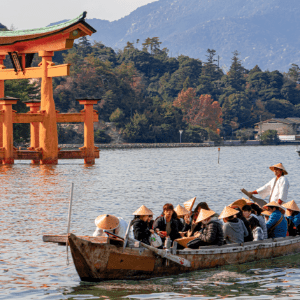
Who can apply
If you’re aged 18-30 and have an Austrian, Australian, German, Irish, New Zealand or UK passport, then you can apply for a working holiday visa that allows you to work in Japan for up to 12 months. Other nationalities may also be eligible for a work visa and our Work Japan program. For the full list, please visit our visa page .

Spring (Mar-May) and autumn (Sep-Nov) bring mild weather and scenery bursting with either pastel blossom or brilliant red leaves. Summer in the cities can be hot and humid, so if you’re working in Tokyo, it’s a good time to take a break. Winter brings dumps of snow and ski job offers for our Ultimate travellers.
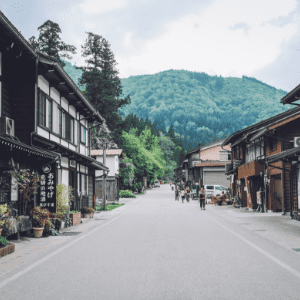
Where to go
City or ski? Why compromise. Our Work Japan program has two options. The Essential Japan supports you with finding work in and around Tokyo for the duration of your visa, with the Ultimate Japan adding on the option of a pre-arranged ski season job in Niseko, Rusutsu or Furano over the winter months (Nov/Dec-Apr).
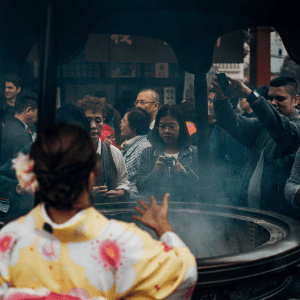
Type of work
With typical jobs including hospitality, tourism and ski season jobs, it’s not a requirement to speak Japanese to join our Work Japan program. However, some language skills will improve your experience immeasurably. We’ve partnered with a Tokyo language school to offer paid 4-12 week courses when you arrive.
Japan can seem intimidatingly unfamiliar to travellers, especially when it comes to cultural and business etiquette. From intercultural training to translating your CV into Japanese, our Work Japan program helps to embrace the differences and navigate the hurdles.

Ultimate Japan
Welcome to the powder playground! All the Essential job inclusions, plus a pre-arranged 3-4 month winter seasonal job with subsidised staff accommodation in either Niseko, Rusutsu or Furano – Japan's top ski resorts.

Essential Japan
Based out of Tokyo, the Essential Japan includes 5 weeks' accommodation, plus everything you need to start working in Japan: including ongoing job support, help getting your residence permit, tax number, bank account and more.
More zen than a Japanese rock garden, our BUNAC team and trusted in-country partners take the stress out of applying for your visa, finding a job and sorting out all the legal formalities of working in Japan.

We provide step-by-step guidance with filling out your visa form, checking it before it’s submitted to make sure everything is correct.

Don’t want the stress of finding a job? The Ultimate Japan includes a pre-arranged ski season job in Niseko, Rusutsu or Furano.

Your personal translators, our Tokyo team take you via banks, tax and employment offices to sort the essentials when you first arrive.
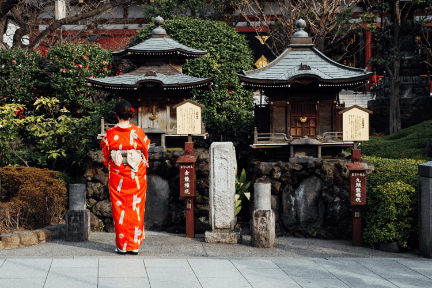
Leave your shoes at the door
When it comes to good manners, we bow down to the standards set by the Japanese. Social etiquette is very important in Japanese society, and it’s important to understand the culture and customs before you go. From taking your shoes off at the door, to finishing your food and not leaving a tip – we include a pre-departure intercultural session before you go that focuses on living and working in Japan.

Let’s get piste together
Ski seasons aren’t just for seasonnaires. You don’t need to be able to ski or board to work a ski season. Most of our employers take on working holidaymakers for non-skiing roles, such as guest services and restaurant work. If you do want to learn, then you’ll usually get a lift pass and free or subsidised lessons thrown in with your job. And if you don’t, just sit back and enjoy the clean air and mountain views.
Travel with confidence

Total peace of mind with our Booking Guarantee *

Book with a deposit and pay the balance when recruitment starts

24/7 emergency help and support at home and abroad

60+ years of work, learn and intern abroad expertise

Book now to secure your spot for 2024 with a deposit

- Intensive Japanese Courses
- Lite Intensive Japanese Courses
- Part-time Japanese Classes
- Private Lessons
- JLPT Prep Courses
- Online Japanese Lessons
- JLPT Online Instruction & Exercise – 6 Month Course
- Self-Study Courses
- About Coto Japanese Academy
- Iidabashi Japanese Language School
- Shibuya Japanese Language School
- Yokohama Japanese Language School
- Minato Japanese Language School
- Our Teaching Philosophy
- Student Visa Support
- Meet the Coto Team
- Corporate Solutions
- Japanese Blog
- All articles
How to Travel, Work, and Study in Japan on a Working Holiday Visa

Whether you’re interested in exploring the country’s rich cultural heritage, indulging in its delicious cuisine, or simply soaking up the local way of life, you’ll find that Japan has something to offer to everyone. Thanks to Japan’s Working Holiday Visa program, you can have a taste of what’s living and working in Japan like without needing to commit to a full-time job, join a university course, or have a visa sponsor.
Every year, over 15,000 people come to Japan as part of the country’s Working Holiday Visa program. This program represents a dream come true for many young people interested in discovering a different and vibrant culture, whether it be exploring Tokyo or experiencing the quiet serenity of the Japanese countryside.
If you want to come to Japan on a Working Holiday Visa, this article will guide you on the main things you need to know to get this visa, including the requirements you need to fulfill, as well as useful information on how to find a job, housing, and other key essentials to start your life in Japan.
What’s a Working Holiday Visa in Japan?
Let’s start with some basics—according to the Ministry of Foreign Affairs of Japan, the Working Holiday Visa is “intended to make it possible for the youth of Japan and its partner countries/regions to enter each country/region primarily for the purpose of spending holidays while allowing them to engage in employment as an incidental activity of their holidays for the purpose of supplementing their travel funds.”
The main keyword here is incidental activity and supplementing travel funds. In other words, while you can engage in paid activities while in the country, the main purpose of this visa is for you to explore the country and enjoy its culture. A working holiday in Japan is designed for foreigners who want to have fun in Japan while they do part-time or freelance to supplement their day-to-day expenses.
Working holiday programs are bilateral agreements Japan made with specific countries, in which Japanese people can work in that country under the same visa type, too. The Working Holiday Program was first launched in 1980, with Australia being the first country to benefit from it. As of 2023, the program has been expanded to 26 countries and regions. Every year, about 15,000 individuals benefit from it, according to Japan’s Foreign Ministry.
For more reference, head to the working holiday page on MOFA Japan’s website .
Am I Eligible for a Working Holiday Visa in Japan?
The Working Holiday Visa allows you to work in Japan during the duration of your visa to supplement your travels in the country. You don’t need a sponsor to apply and can do it directly from your home country. However, you can only apply if you have a passport from one of the 26 listed countries that take part in this program.
As of 2023, here is the updated list, as divulged by the Foreign Ministry of Japan:
- Australia
- New Zealand
- Canada
- Denmark
- France
- Germany
- Ireland
- Norway
- South Korea
- United Kingdom
- Hong Kong SAR
- Taiwan
- Portugal
- Poland
- Slovakia
- Austria
- Hungary
- Spain
- Argentina
- Chile
- Iceland
- Czech
- Lithuania
- Sweden
- Estonia
Also, there are a few other preconditions . First, you must be between 18 and 30 years of age, both inclusive, at the visa application time. For Australia, Canada, and the Republic of Korea, an applicant should be between 18 and 25 years of age, except in those cases where the competent authorities of Japan agree to extend the age limitation to 30 years. If you are from Iceland, you can only apply between 18 and 26 years of age.
You can’t come accompanied by children or other dependents. This means you can’t sponsor your spouse or family to come to Japan.
Next, you must present a return travel ticket or sufficient funds to purchase such a ticket. The other thing would be needing to prove to have enough funds to support your stay in the country.
Finally, the last one might sound obvious, but you have to be in good health.
How to Apply for a Working Holiday Visa in Japan?
To apply, you need to directly contact the Embassy or Japan’s Consulate in your country. In most cases, you must apply in person from your country of citizenship. Even though, there are some differences between countries, here is some basic documentation that you need to prepare:
- A copy of your passport.
- A completed Visa Application form was obtained from Japan’s Embassy in your country.
- Flight details and proposed itinerary/schedule in Japan.
- A statement of purpose.
- Proof of good health and proof of funds.
- Your updated resume.
Do I Need a Job to Go to Japan?
No, you don’t need to have a job before applying for this visa—you can start finding employment once arrive in Japan. Keep in mind, however, that you are “strictly prohibited from working at bars, cabarets, nightclubs, gambling establishments, and other premises affecting public morals in Japan,” according to the Foreign Ministry. If you happen to be found engaging in such activities, you could be deported back to your home country, so, better to follow the rules.
The good news is besides these prohibited occupations, you are pretty much free to engage in all other types of jobs, which gives you great flexibility to follow your goals and build up your CV while working in Japan. Also, there’s no limit to the number of hours you can work, and you can choose to work part-time or even full-time in Japan.
What You Can Do in Japan During Working Holidays
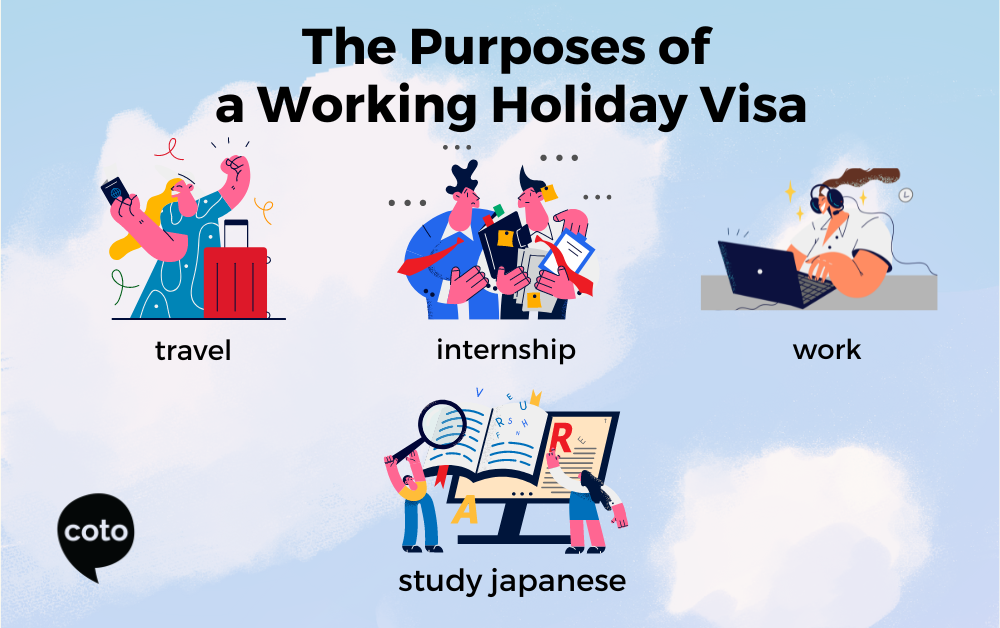
The purpose of a Working Holiday visa is for you to have a great time in Japan while doing some side hustle to support this. While applying for this visa, you will need to provide an outline of your intended activities. This should be detailed enough for you to show that you’re truly intending on exploring Japan — visiting onsen towns , skiing in Hokkaido, or sightseeing in Okinawa.
At the same time, you can make it vague enough to allow for flexibility in your travel plans. You don’t need to show a rundown of your day-to-day schedule!
1. Travel Around Japan
The main purpose of this visa is technically still traveling, so do travel as much as you can and as your budget allows! After all, Japan has plenty to offer, from North to South.
Most people come to Japan under a Working Holiday visa so they could both work and travel with relative ease. There is no limit on how many hours or days per week or how many months you can work on a Working Holiday Visa in Japan, so you can technically work full-time in Japan.
3. Internship
If you are interested in pursuing an internship in Japan, it’s important to research different programs and companies, as well as prepare your application materials, such as a strong resume and cover letter. With dedication and effort, an internship in Japan can be a truly rewarding experience. A lot of big, international companies in Japan have amazing internship programs.
4. Study Japanese
Studying Japanese is the ultimate way to fully immerse yourself in the vibrant culture of Japan! Not only will it help you communicate with the locals and make the most of your working holiday, but it’ll also open doors to exciting new experiences and adventures.
If you are only visiting Tokyo for a few months, it may be hard to find a language school to study Japanese with due to rigid start and finish dates
Coto Academy is the perfect place for foreigners who want to come to Japan on a working holiday visa to learn the language and culture of this fascinating country. You will not only improve your language skills but will also gain a deeper understanding of the customs and traditions of Japan, making your experience in the country more enriching and enjoyable.
How Long Can I Stay in Japan Under a Working Holiday Visa?
All Working Holiday Visas in Japan are up to one year. Citizens of Australia, Canada, and New Zealand must, however, extend their visas after six months.
In principle, you cannot review your Working Holiday Visa after one year. However, you could apply to change your visa into a working visa given certain conditions. The final decision will ultimately depend on the Japanese Immigration Bureau. It’s not uncommon for many foreigners to upstart their Japanese life under a Holiday Working visa to then change to another type of visa, such as a working visa or other types.
For more information, it is better to consult with the local immigration office once in Japan.
Life in Japan with a Working Holiday Visa
Accommodation in japan.
Finding a place to rent in Japan can be challenging, especially if you are new to the country and don’t have a local support system. Yet, there are several options available to those living in Japan on a Working Holiday Visa.
One popular option is to use a real estate agency, which can help you find a suitable apartment or house based on your needs and budget. Another option is looking for a place through online listings, such as Suumo or Craigslist. Finding housing through local contacts, such as friends, acquaintances, or language exchange partners, is also possible.
To simplify your house-hunting experience, share houses are probably your best option. Besides that, there are great short-term accommodations that are both foreign and English-friendly.
Mobile Number and Bank Account
Besides housing and a job, there are a few other essential things you need to solve to start your new Japanese life well. You probably need a local phone number, an Internet connection, a Japanese bank account, and a public transportation card.
Getting a phone and internet connection in Japan is relatively straightforward. Besides the major mobile phone companies such as NTT Docomo, Au, and SoftBank, there are also newer firms such as Rakuten Mobile and Line Mobile, which offer cheaper plans. Check the different options to find the one that suits you better.
You can sign up for a plan online or in person at the store, and most companies will require a Japanese address and proof of identity. It’s important to carefully consider your needs and budget before choosing a plan, as some companies may charge extra for international roaming or data usage.
Opening a bank account in Japa n is another critical step, as it will allow you to manage your finances and, most importantly, get paid in the country in local currency. Mitsubishi UFJ, Sumitomo Mitsui, and Mizuho are among the major Japanese banks, although other financial institutions such as SBI Shinsei Bank are popular among foreigners for being more expedited in their processes.
Once again, you need to check different options to find the one that fits you better
Transportation
Getting your Suica Card or Pasmo Card, Japan’s main prepaid cards that allow you to pay for your subway, buses, trains, and even groceries at most konbini around the country (and coffees at Starbucks) is perhaps the most straightforward process.
To obtain one of those cards, simply go to one subway or train station and look for the ticket vending machine. Find the Suica or Pasmo option on the ticket machine’s menu, and select it. Choose the amount of money you wish to load, with a minimum of 2,000 yen, insert the cash, and wait for the card to be delivered to you almost instantly.
If you are wondering about the differences between the Suica and the Pasmo, or wish to know more about other available public transportation cards, this article can help you out. Spoiler—the main difference between Suica and Pasmo is that they are provided and managed by different companies, yet they are quite equal in terms of coverage.
Staying in Japan After a Working Holiday Visa
So you have obtained your Working Holiday visa. You might find yourself enjoying your life in Japan and starting to wonder if you can stay in Japan to settle here. Would this be possible?
The short answer is yes! The Working Holiday visa is not intended for long-term stays. In fact, it’s designed for people who “intend to leave Japan at the end of their stay.”
However, you can continue living in Japan after your visa expires by changing your visa status. Converting to a working visa (such as a humanities visa) is a possible and very common case among foreigners.
You will have to find a company that is willing to sponsor you. The good news is that this might be easier because of the added convenience of already living in Japan. If you’re already working for a company, either part-time or full-time, it’s good to communicate your desire to continue working under a sponsored working visa at least 2-3 months before your Working Holiday visa expires.
If you haven’t worked yet, you might be wondering how to find a good job in Japan . Japan’s local labor market can be broadly divided into two main categories: The mid-career job market, and the fresh graduate job market. Understanding this difference can be essential to define your job-hunting strategy.
To look for a job in Japan, you can try different online portals for job hunting , or attend one of the many job fairs in different cities. Here are a few English-language boards where you can find several job openings.
- Daijob
- Jobs in Japan
- Work Japan
- Japandev
- Tokyodev
Those who feel confident with their Japanese level can also try to explore Japanese-only online job boards.
Job fairs are other good options. Among them, I recommend the CFN Tokyo Career Forum, held in June and December, and the Daijob Career Fair, held in February, March, and July. Last but not least, you can also try to rely upon a recruiting agency. These agencies are usually free of charge for the job seeker, although recruiters are primarily active in the mid-career job market.
Check out our article about obtaining a Japan work visa!
What’s so great about the Working Holiday visa if you’re eligible) is that it offers more flexibility. You can get a full-time job along the way, learn Japanese, or stick to traveling around the country when you want. While this isn’t for everyone — particularly those who want to come to Japan with more stability and support — it’s certainly the perfect option if you’re looking for an adventure!
If you want to take Japanese language lessons on your working holiday schedule, check out the courses at Coto Academy! You do not need a student visa to study Japanese with us on a short-term basis – and we can accommodate a start date that fits your schedule. We also offer a free course consultation.
Head to this page to view our booking calendar. Good luck!
What is a working holiday visa?
A working holiday visa is a special visa for young people between the age of 18 and 30 (25 in the case of some countries), to stay in Japan for up to one year.
Can you work part-time or full time in Japan under a working holiday visa?
There is no limit on how many hours or days per week or how many months you can work on a Working Holiday Visa in Japan, so you can technically work full-time in Japan.
Can you extend your working holiday visa?
The Working Holiday visa is not intended for long-term stays and is only designed for a stay up to one year. However, you can continue living in Japan after your visa expires by changing your visa status. Converting to a working visa (such as a humanities visa) is a possible and very common case among foreigners.
Test your Japanese level!
Recent Articles


Japanese Language & Cultural Immersion Course: Learn and Experience Japan

Start Learning Japanese With Coto Online Today, Available 24/7

Master Japanese In 4 Weeks With Intensive Japanese Course

Best Japanese Anki Decks: Easy ways to remember Japanese

Work Remotely In Japan

- Jobs Abroad
Jobs in Japan
+ ADD LOCATION FILTER
+ ADD FIELD FILTER
13 Jobs in Japan
Browse programs that match your interests

Jump start your teaching career with us and start the experience of a lifetime!

Find work-from-home jobs teaching English on Teach Away

TEFL Classes + Job Search Guidance to Teach English Online & Abroad

Best TEFL Course, globally recognized. up to 50% off!

Top Provider of the Month
Get tefl certified & explore the world as a professional english teacher with international tefl academy.
9.55 22 reviews
Get TEFL Certified & Teach English in Japan!
Do you want to get paid to teach English in Japan? ITA offers top-level accredited TEFL courses in Japan, in addition to award-winning online TEFL courses and in-person classes in 20+ additional locations. I...

International TEFL Academy
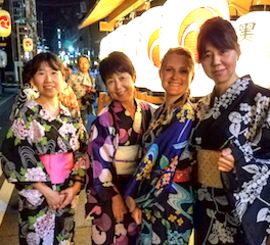
8.5 4 reviews
Become a Ski Instructor in Japan, with Training and Job
EA Ski & Snowboard are looking for eager skiers to join us in Japan! If you love the outdoors, travel, and have a passion for skiing; this is for you.What is the ski instructor internship course?This program has been designed to set you up as a qualified ski instructor within ...

EA Ski and Snowboard Training
0 0 reviews
Powder & Culture: Ski/Snowboard Instructor Course in Japan
Our 11-week ski and snowboard program is for those looking to pack the most into their season. If you've never skied before, check out our Learn to Ski course, The Primer. With expert instruction, cultural i...
Project Snow

Ski Instructor Japan – Live and Work on Japan’s Ski Slopes
Niseko, Japan, known as the powder capital of the world, has snow-covered mountains and ski slopes galore. On this trip, you’ll become a qualified ski instructor, so you can get paid to ski in one of the most futuristic countries in the world!Spend three weeks training for you...
Global Work & Travel
8 1 reviews
Teach Abroad Jobs in Japan
Japan is one of the most popular options for new graduates and certified teachers looking to teach English abroad, as English teachers continue to be in high demand. English teaching jobs in Japan within public and private schools offer ESL teachers the opportunity to experien...
Teaching English in Japan - 12 Months Adventure
Take control of your teaching adventure in Japan! Turn your dreams of experiencing the Land of the Rising Sun into a well-paid reality on this 12-month immersive teaching adventure.With its quirky culture, orderly cities, age-old tradition, and stunning scenery, Japan is the...
9 3 reviews
Paid Teaching in Japan & Lifetime Placement Guarantee
Set off on a complete teaching journey in Japan with TEFL Heaven. We provide a guaranteed job placement at one of our trusted partner schools, with a salary ranging between $1,400 - $2,000.We provide extensive support before your departure, offer round-the-clock assistance in ...
TEFL Heaven
Teach English Abroad with OnTESOL
There’s no better way to earn income, make an impact on others, and discover the world than by teaching English abroad! This is exactly what we offer at OnTESOL—the opportunity to take on a teaching job at your desired location in Asia, Europe, Central and South America, and t...
Hotel and Ryokan Jobs in Japan
Have the opportunity to work at a ryokan, a traditional Japanese hotel, doing fully remunerated work as part of a working holiday in Japan. Learn about traditional Japanese culture and culinary arts and what is probably the highest service level in the world. Ryokans are typic...
World Unite!
Ski Resort Jobs in Japan for Canadians
Do you love the ski and snowboard season? Spend this winter at Japan's number-one ski resort! Famous for its wide-open powder bowls, backcountry runs, and light powdery snow, the Niseko Ski Resort. Located in northern Japan's Hokkaido region, the town is known to have the coun...

Want to Get Matched with Programs?
Video of the month.
Get TEFL Certified & Explore the World as a Professional English Teacher International TEFL Academy Learn More
More Programs to Check Out
Your options are endless
- International TEFL Academy Get TEFL Certified & Explore the World as a Professional English Teacher Premier TEFL Search + Apply for TEFL Internships & Our 100s of Jobs Online & Abroad
A Guide to Jobs in Japan
Japan is a country rooted in history, tradition, and religion, yet has distinctly placed itself as a leader in modern-day technology. Its regions offer a span of landscapes to those seeking jobs in Japan, from the fairytale-like winter snows in Hokkaido to the flashing city lights in Tokyo to the serene oceans of Okinawa. Curious, adventurous job seekers are intrigued by the distinguished culture in Japan and also its distinct work culture. After spending a few months working abroad in Japan, workers will learn the incredible work-ethic that runs deep in the Japanese culture and lifestyle.
Best Cities for Expats
The usual “go-to” for foreigners looking for work abroad in Japan is often the biggest city in the country, Tokyo . While many foreigners assume that they are only able to teach English in Japan, with some Japanese language skills, foreigners can find work in education, business, recruiting, journalism, and entertainment.
Osaka is the one of the most famous culinary destinations in Japan. With cheap and delicious food options, people can find themselves stuffed in food heaven. Culinary connoisseurs can find a variety of jobs in Osaka at local restaurants, cafes, and bars for cooking classes and possible apprenticeships.
Okinawa may surprise some as a location for foreigners to work in Japan. The pristine jade-green waters of Okinawa attract tourists from all over Asia. Individuals looking to work in Japan can find job opportunities utilizing their customer relations skills in the tourism and hospitality industry.
Nara is a tranquil, countryside prefecture that was the former capital of Japan. This is the perfect place for a job-seekers wishing to be immersed in a quaint, historical area while working in Japan. The biggest industry in Nara is tourism, and accordingly, there is a need for foreigners to work in the hospitality industry.
Popular Job Types
Japan is one of the most developed countries in the world. They are leaders in technology, famous for their culinary and traditional arts, and also a country set on improving their English fluency.
Teaching English is by far the biggest industry that foreigners work in Japan. The three main English teaching options include the government-sponsored JET program, corporate companies, and international English schools. All three options help with visas and housing.
Technology is a hugely successful industry in Japan. They are highly praised for their mobile phone technology, automobiles, and electronics. It is home of the international corporations like Panasonic, Sony, Fuji, Nintendo, Toyota, and Honda. Many of these corporations recruit from their international offices outside of Japan.
For those seeking a more Hollywood-type of experience, people can also find themselves working in the entertainment industry. Being from a different cultural background and having a unique physical look, you can find agencies seeking models and actors for advertisement, runways, television shows, and movies.
Estimated Salaries
Average salaries vary greatly depending on the type of position and the location of your work abroad in Japan. Working in the tourism and hospitality industry can earn you an average of $3,000 per month in Tokyo. Working in hostels and hotels often provide a lower salary, but offer you free housing. A typical teaching salary can earn you around $2,300 per month in Osaka. English teaching positions definitely offer enough to get by, but how much you save depends on your saving habits and travel intentions.
Accommodation & Visas
Many individuals who work abroad in Japan live in apartments, or tiny apartments sometimes called “rabbit-houses.” Most places require that you pay “key money” and a security deposit. The key money is usually a one-time non-refundable payment of two to three months rent that goes directly to your landlord. While apartment hunting, you might see terms like “1LDK” which are are used to indicate (1: Number of Bedrooms, L: Living Room, D: Dining Room, K: Kitchen).
In order to legally work abroad in Japan, foreigners must obtain a visa—a college degree is required for a work visa, which is necessary for working in Japan. Citizens of certain countries, including Australia, New Zealand, Canada, and a few countries in Europe, between 18 and 30 years old can obtain a working holiday visa to work in Japan for up to a year. Citizens of the United States can visit Japan for a period of 90 days or less, during which they can find job opportunities in Japan. If a company that is willing to sponsor your visa, the visa process is very streamlined and not difficult to obtain. Find all of the most up-to-date visa information for working in Japan by contacting your Embassy !
GoAbroad's Inside Scoop
People in Japan often work many hours of unpaid overtime. Being prepared for this work-life imbalance is crucial to understanding Japanese corporate culture. Even though this may be a challenge, you will learn so much by working within a completely unique work culture. The experience you gain will help you in your future career anywhere you go. Insider tip:Using the correct honorific speech, keigo, toward elderly bosses and co-workers demonstrates your respect for them. This concept is very difficult for Western people to grasp and utilize, but it is incredibly important to understand and be aware of when working abroad in Japan.
Japanese people are incredibly accepting of foreigners. They will treat you as a guest to their country and value the specialized experience and skills that you bring. However, even after years of living and working in Japan, you will always be treated as a guest which can be quite alienating. Once in Japan, however, you can take advantage of free Japanese language classes offered at local community centers which may help you connect with your peers. Despite the challenges, working in Japan is a great opportunity to leave your comfort bubble, and learn to live in a new routine.

Come stay at Home & Co and live the easy living experience

Popular Searches
Here are some popular links curated for you
- South Korea
- Philippines
- Hospitality
- Fujinomiya City

to get exclusive discounts on meaningful travel programs!
Travel Tools
Hand-picked travel resources for you
Related Jobs Abroad Articles
Read more tips before you travel
5 Questions Every American Is Asked While Working In Japan
How to work in japan, 10 best countries to work in the world in 2024, for travelers, travel resources, for partners.

© Copyright 1998 - 2024 GoAbroad.com ®
- Study Abroad
- Volunteer Abroad
- Intern Abroad
- Teach Abroad
- TEFL Courses
- Degrees Abroad
- High School Abroad
- Language Schools
- Adventure Travel
- Online Study Abroad
- Online Volunteer Programs
- Online Internships
- Online Language Courses
- Online Teaching Jobs
- Online Jobs
- Online TEFL Courses
- Online Degree Programs
- Meet the Team
- Work with Us
- Czech Republic
- Netherlands
- Switzerland
- Scandinavia
- Philippines
- South Korea
- New Zealand
- South Africa
- Budget Travel
- Work & Travel
- The Broke Backpacker Manifesto
- Travel Resources
- How to Travel on $10/day
Home » Asia » Japan » Everything You Need to Know about Working Holidays in Japan | 2024
Everything You Need to Know about Working Holidays in Japan | 2024
Working holidays abroad are a dream scenario for travel addicts. Normally our mind jumps to well-known destinations such as Australia and New Zealand. Did you know about working holidays in Japan?
You can fulfill that life-long dream of traveling around Japan long-term, with the added bonus of not depleting your hard-earned cash!
Japan is known worldwide for its amazing culture, jaw-dropping landscapes, next-level cities, and of course, its mouth-watering cuisine. Imagine spending a year abroad, chowing down on authentic Katsu, and admiring the cherry blossoms while they’re in season.
You’ll not only have the time of your life (this I can guarantee) but you’ll make life-long friends, learn about a new culture like never before, and probably learn some valuable life skills while you’re at it too.
If this sounds like something you’d be up for, then keep on reading. We’ve got an article choc-full of tips, handy bits of info, and even options for some great working holidays.

The Broke Backpacker is supported by you . Clicking through our links may earn us a small affiliate commission, and that's what allows us to keep producing free content 🙂 Learn more .

Do You Want to Travel FOREVER??
Pop your email in below to get a FREE copy of ‘How to Travel the World on $10 a Day!’.
Taking a Working Holiday in Japan
Top 5 tips for a working holiday in japan, japan working holiday visas , insurance for a working holiday in japan, working holiday in japan budget, earning money on a working holiday visa, pre-planned working holiday jobs with global work and travel, diy working holiday in japan, final thoughts .
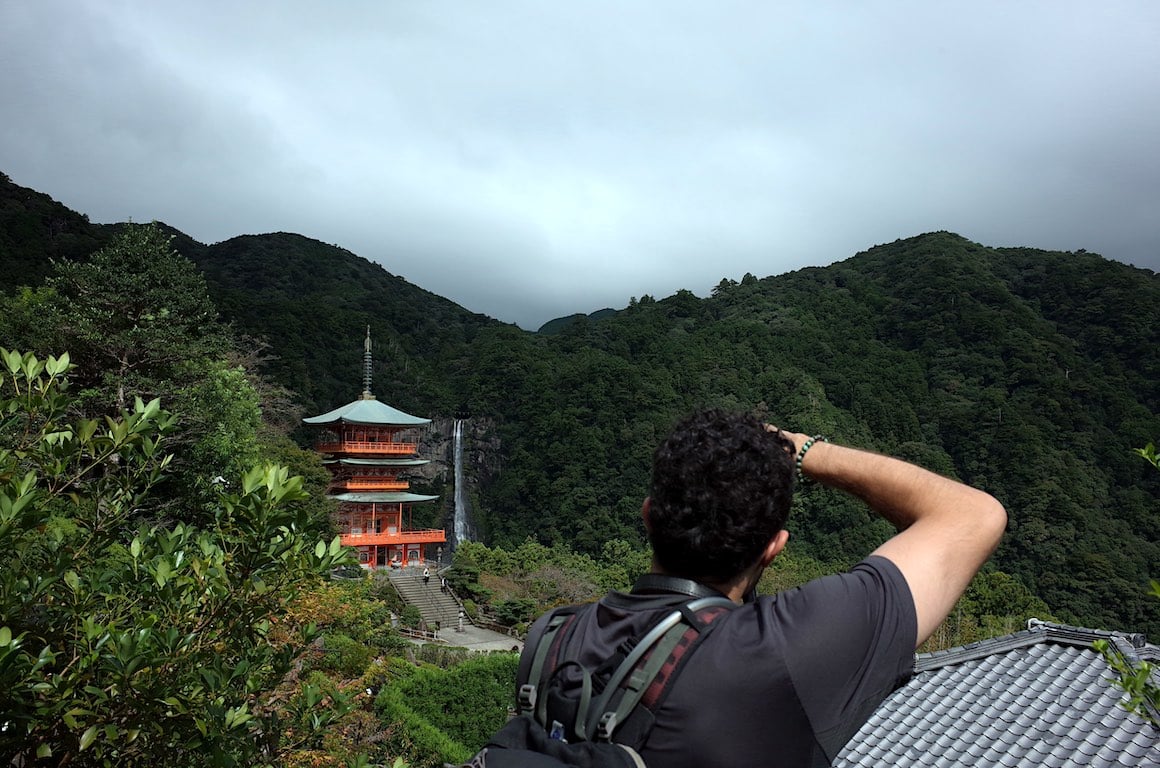
Japan has a working holiday agreement with several countries. If you’re a citizen of one of the lucky nations then rejoice, because the process is easy as matcha cream pie, and you can find yourself with sexy travel job whilst being fully immersed in Japanese culture!
More often than not, we limit ourselves by thinking that working holidays are only for gap year students or new graduates. This couldn’t be farther from the truth. If you’re tired of your mundane job or just want a little breather for a year, then taking this kind of trip could be just the ticket. Grown up gap years are becoming more and more popular.
Working holidays abroad are an amazing choice for people who want to experience a country long-term, but are a bit strapped for cash to simply lounge around for an easy gap year in Japan (a girl can dream). The beauty of this kind of trip is that you’ll be making money as you go , so you don’t have to worry about having mega savings in the bank.
Best of all, your weekend and days off will be spent doing all the fun stuff. Imagine heading to the mountains for a short ski trip over winter, or relaxing in a Japanese onsen? Yes, yes, there will be some serious work going on too, but hey, if you could go away for up to a year, isn’t it worth it?
What kind of work could you be doing? Well, there are loads of opportunities available with only a small number of prohibited jobs. The most popular working holiday jobs are low-skill work such as waiting tables in a restaurant, working in sales, or in the hospitality industry. But teaching English in Japan is also very common. Some people even use their time to focus on learning Japanese, enrolling in lessons and courses.
This may all seem like a bit much, taking the leap and moving abroad can be a bit scary after all. But to ease your anxiety, there are some fab agencies out there to hold your hand throughout the entire process.
Go with Worldpackers
Worldpackers is an online company that connects travelers with foreign volunteer hosts who then work in exchange for housing . That being said, Worldpackers does do more than just connect volunteers to hosts. It offers a plethora of additional resources, a great support network, a blogging platform for collaboration, and a whole lot more.
Sounds pretty rad, right? But wait, there’s more!
According to their mission statement, Worldpackers is “ a community based on collaboration and honest relationships that make travel more accessible to those seeking a profound cultural experience. ” They value environmentalism , authenticity , growth and working together above all else and make a great effort to provide the best experience possible.
And even better – Broke Backpacker readers get a special discount of $10 ! When you use our special hookup, it makes even more sense to pay. Just use this Worldpackers discount code BROKEBACKPACKER and membership is discounted from $49 a year to $39.

Worldpackers: connecting travellers with meaningful travel experiences.
Go with Global Work and Travel
Here at The Broke Backpacker, we are all about Global Work and Travel . These guys ROCK! They are really trustworthy, truly care about your experience, and will give you assistance to make sure your working holiday in Japan is top-notch!
It’s got a bit of a different approach than Worldpackers, but it offers JUST as many amazing opportunities for travellers.
It provides working holidays, teaching abroad, volunteering, au pair and student internship packages . On top of that, the agency plans, sorts and assists with visa requirements, connections to local businesses, accommodation search and job interviews.
Most products even come with flights and basic medical insurance, a 24/7 Emergency line and payment plans.

Yes! You’re really really thinking about leaving it all behind and setting up in Japan for a while! What else do you need to know? Here are my 5 top tips to see you through:
- Know the duration of your stay. It’s a good idea to know roughly how long you plan on being in the country. If you only have time for a couple of months, a tourist visa will be a better fit for you, especially since in Japan, you will struggle to find short-term jobs. Citizens of certain countries have the option to extend their stay after an initial 6-month period.
- Getting the correct visa. If you are some of the lucky countries that are a part of the Japan working holiday visa programme, then applying for this visa is THE best choice by far – unless you are only going for a short while. If you are not eligible, you could consider teaching English in Japan using a work visa, studying on a student visa and working part-time, or just visiting Japan on a tourist visa.
- Finding accommodation. Accommodation in Japan , especially Tokyo can get pretty pricey. For some types of jobs such as teaching or working in a ski resort, you may get assistance with finding discounted accommodation, but otherwise, the search will fall to you. A great option to save on housing costs is to think about shared houses. These are quite popular in Japan amongst young people (both locals and foreigners). Tokyo Share House is a great place to look, but bear in mind that some of these houses can have up to 30 people living in them!
- Have a rough plan. Unlike the road trip culture of an Australia or even New Zealand working holidays , you will find it difficult to find short-term employment in Japan. If you want to use your Japan working holiday visa to explore the country, I’d recommend shooting for no more than four places/employers within a year.
- Exploring the country in your free time. You didn’t come all the way to Japan just to stick to one area. You came to explore, and by far the best way of doing that is by train. Japan is one of the few countries worldwide that have bullet trains between major cities – these trains are ridiculously fast, with some clocking up speeds of up to 320 kilometers an hour! The Japan rail network is extensive with high speed, and local trains. I really recommend getting the Japan Rail Pass if you’re planning to travel around the country a bit. This pass is only available to non-Japanese passport holders and will save you a load of money.

A new country, a new contract, a new piece of plastic – booooring. Instead, buy an eSIM!
An eSIM works just like an app: you buy it, you download it, and BOOM! You’re connected the minute you land. It’s that easy.
Is your phone eSIM ready? Read about how e-Sims work or click below to see one of the top eSIM providers on the market and ditch the plastic .
You’ve probably gathered by now that, like most working holidays abroad, there are conditions when looking to move to Japan on this kind of visa. The country has a working holiday agreement with several countries, with some general criteria, although some countries have slightly different rules. The countries eligible are Argentina, Australia, Austria, Canada, Chile, Czech, Denmark, Estonia, France, Germany, Hong Kong, Hungary, Iceland, Ireland, Lithuania, Netherlands, New Zealand, Norway, Poland, Portugal, Republic of Korea, Slovakia, Spain, Sweden, Taiwan, and the United Kingdom.
As well as being a citizen from one of these countries, you’ll also need to be aged between 18 and 30 years old, although for Australia, Canada, and the Republic of Korea, the age cap is 25. The age limit for Icelandic citizens is capped at 26 years old. To apply for the visa, you must have no dependents or children coming with you, have a valid passport, a return ticket or funds to purchase a return ticket, reasonable funds to support you during your initial stay, be in “good health”, and have not been previously issued this visa.
The reasonable funds considered “necessary” by the Japanese government depend on your home country, so you may want to double-check with your local embassy. However, a good ballpark figure is between 288,000 – 460,000 JPY (2,500 – 4,000 USD) PLUS however much you need to buy a ticket home. This is a minimum, however, and saving a bit extra never hurts!
There are limits as to how many visas are issued each year for each country. These are 10,000 (Taiwan), 6,500 (Canada), 1,500 (France and Hong Kong), 500 (Poland and Spain), 400 (Ireland, Slovakia, Czech Republic), 200 (Austria, Argentina, Chile, Hungary), 100 (Lithuania), 30 (Iceland), and no limits (Australia, Germany, New Zealand, Portugal). This is why getting your application in early is a good shout, the spots will fill up quickly!
It should be noted that while these travelers are legally allowed to do most jobs, they are strictly prohibited from working in bars, nightclubs, gambling establishments, and cabarets. These types of jobs are said to affect public morals in Japan, and individuals found working in these kinds of jobs will be seen to have violated their visa agreement and be deported.
To apply for your Japan working holiday visa, you need to submit your visa form , valid passport with photocopies, passport photos, proof of funds via bank statements that were issued within the last month, your return flight ticket (or one-way ticket as long as you show you can afford another one later on), resume/CV, a letter addressed to the Japanese Embassy or Consulate stating why you want to visit Japan, a schedule of your stay with cities, what kind of work you want to do, and any other activities. This needs to be done to the embassy or consulate of your home country.
PHEW. That was a LOT. If you’re still raring to go then by all means… have at it! If you want a little assistance with all that , you’ll be happy to hear that there are services that help you sort everything out. Thank GOD. Visa First are a good option if you wanna sit back a little and just do all the fun bits (like planning your itinerary!), or Global Work and Travel will take care of everything .
I personally always get a Japan travel insurance – no matter if it’s for a short trip, a long backpacking stint, or moving for a while. It’s helped me out more than a few times, and I’d hate to think of anyone finding themselves in a less than ideal situation without it!
We love WorldNomads for anyone who’s not sure of which company to go with. Everything is super easy to navigate, understand, PLUS they cover all your typical working holiday abroad activities. It’s a winner!
ALWAYS sort out your backpacker insurance before your trip. There’s plenty to choose from in that department, but a good place to start is Safety Wing .
They offer month-to-month payments, no lock-in contracts, and require absolutely no itineraries: that’s the exact kind of insurance long-term travellers and digital nomads need.

SafetyWing is cheap, easy, and admin-free: just sign up lickety-split so you can get back to it!
Click the button below to learn more about SafetyWing’s setup or read our insider review for the full tasty scoop.
Ouch. Time to talk about the dreaded figures. Although we don’t all like to budget and plan (guilty), this is a really important step of any trip. As mentioned earlier, to secure a Japan working holiday visa you will need to have enough money to cover your expenses at the beginning of your trip, and enough funds to buy an outbound flight if you didn’t purchase a return ticket. This is a big expense but don’t let it deter you, the extra cushion is to make sure YOU have the best time without any hiccups should something go wrong.
No doubt if you dream of living it up in Tokyo and want to live city life to the max, you could end up maxing out your bank account. On the other end of the spectrum, life in rural parts of Japan or even smaller cities is considerably less expensive and you’ll be more likely to enjoy the finer things in life! To compare Tokyo and Akita (a modest-sized city), rent in a one-bedroom apartment outside the city center, transport, food, and activities will cost you around 2,000 USD in Tokyo or 1,100 USD in Akita.
If you are considering working in the very rural parts of Japan, bear in mind that in many off-the-beaten-path places, the locals don’t speak English, you’ll need some basic Japanese under your belt to a) get a job and b) have the best time possible.
The cost of living in Japan varies, but be sure you have an idea so you have enough money.

The Japan working holiday visa is great and diverse! You could find yourself doing all kinds of jobs like working in a restaurant, being an au pair for a local family, light factory work, or sales. Legally, most jobs are allowed, with part-time (28 hours per week) or full-time (40 hours per week) available. In Tokyo, you would typically be paid between 890-1,500 JPY an hour, but this will vary for other cities, with lower living costs reflecting lower salaries.
Some of the paperwork you’ll have to arrange on arrival are things such as registering as a resident, getting a tax number, setting up a bank account (see below), and probably getting a local phone number and contract. After that’s all set, it’s job-hunting time! Oh, be sure to get a Japan travel adapter too as the outlets are different here!
Even though you will be living and working in Japan, you will still technically be considered a non-resident under the income tax act. This means that you will be taxed at 20.42% on all your earnings. Your employer will deduct this from your salary each month so you don’t have to worry about it. One thing that really sucks is that there is no scheme or means by which you can claim back your tax after you leave. So you can kiss that hard-earned cash goodbye for good *cries*.
Employers in Japan are very very unlikely to pay your salary into your foreign bank account. This means that you will have to set up a local Japanese bank account in order to get paid. There are only a handful of banks that will open accounts for foreigners so soon into their stay. A few of these are JP Bank, Shinsei Bank, and Rakuten Bank. However, you may want to do some extra research as some of these banks don’t allow foreign transfers into your local bank for the first six months. For this reason, definitely bring a credit or debit card from home, but be mindful of ATM fees!
If you’re able to transfer money into your local account straight away, or if after 6 months you feel the need to, I advise against doing a direct bank transfer (HELLO extortionate fees) and using an international money transfer service instead! Wise (A.K.A.Transferwise) gives you great rates, as does Payoneer.

If you’re not big into planning and would rather have someone handle all of that for you, then have no fear, as there are some fantastic agencies and companies out there that do just that. As I mentioned earlier, Global Work and Travel are awesome. They have a range of cool working holiday programmes to choose from, will help with visas, setting up your new life, and more!
The main kind of jobs for those on a working holiday are teaching, hospitality work in hotels or ski resorts, trying your hand at some farm work, and many others. Here is our favourite.
Teaching in Japan
For working holidays, teaching English is a top choice and doesn’t need much explanation. But there are some requirements you’ll have to meet. Lucky for you Global Work and Travel is offering the full package for anyone who wants to teach English on their working holiday in Japan. You will need to have a Bachelor’s degree in any subject, and an international teaching accreditation is included in the programme.
Once you’ve touched down in Japan as a newly qualified ESL teacher, you’ll attend some interviews, and one of the GWaT partner teaching organizations will offer you a paid teaching position. Some schools may require you to do a two-week training course before heading off to your new placement.
Most of the time, you will be provided with shared accommodation along with two to three other teachers. One of the most attractive things about teaching English in Japan is the BALLER salary. English teachers are in high demand and the potential salary is between 2,100 – 2,300 USD a month.
It is possible to find a teaching job alone, without assistance, but 80% of jobs need you to be IN the country first, so be prepared to head to some interviews and do some paperwork. There are some great websites for finding teaching jobs, but it is a competitive market so many people prefer to go with agencies.
The GWaT working holiday programme not only offers job interviews with prospective schools, but you’ll also have a dedicated trip coordinator who will hold your hand, so to speak, throughout the whole process. Their pre-departure plan will also act as a comprehensive guide not only about what to expect from your trip, but about Japan too. They even offer visa guidance so you don’t need to get all worked up about the requirements, paperwork, etc. Amazing!
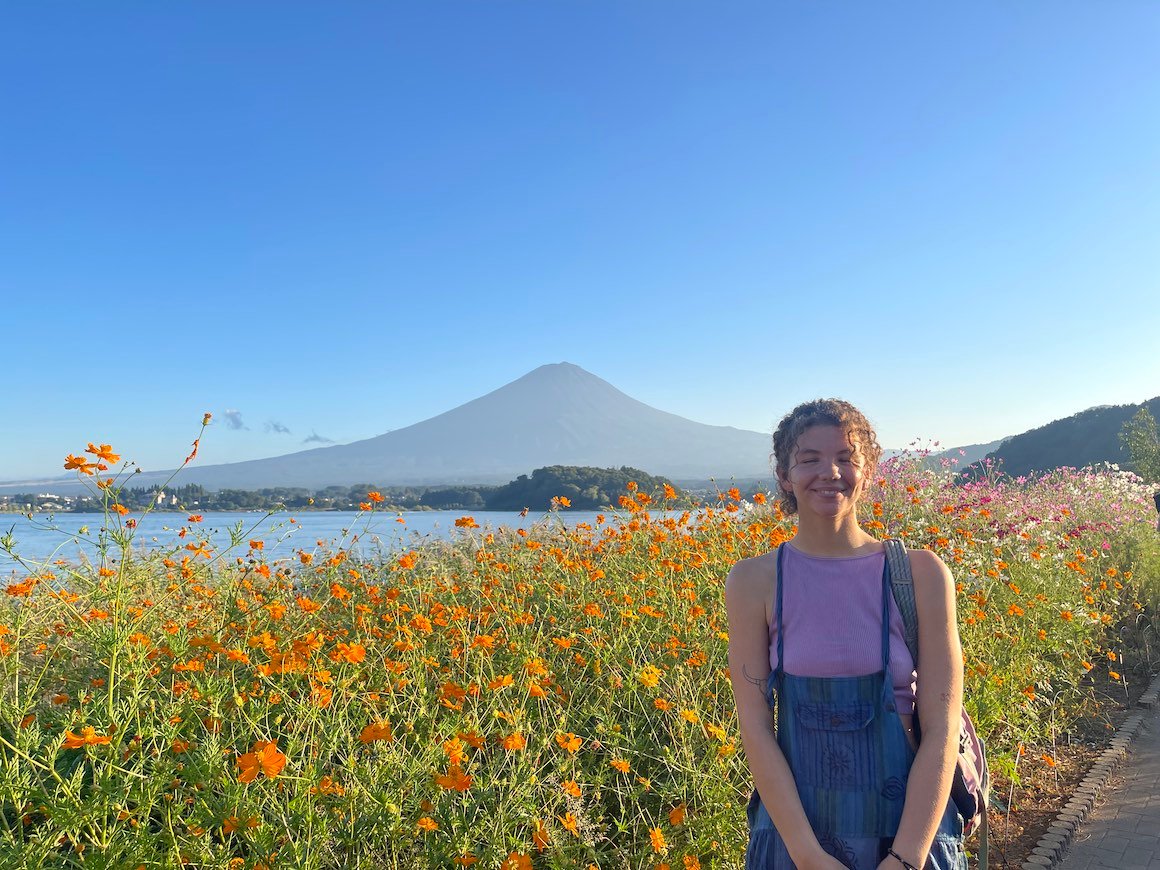
If you don’t enjoy partaking in anything pre-planned, and prefer to do things your own way at your own pace, the good news is that you can do it! It is the ideal situation for any of you adventurous folks who wanna touch down without a concrete plan and just wing it!
You will have to take responsibility for your own visa, flights, local bank account, paperwork, and maybe need to save a little extra – in case you don’t find your dream job right away.
When DIY-ing it, the time of year you apply could affect your success. Applying in May, after the end of the last financial year is the best time. As I mentioned above, there may be a limit per country as to how many Japan working holiday visas they grant, so getting in nice and early gives you the best chance of being accepted.
Your best bet for finding a job is to do it on the ground. Employers will normally want to be sure of your visa, check you have a tax number, and a local bank account etc. before making a commitment to you. This website has a ton of part-time jobs (don’t be deterred that the website is in Japanese, as they specifically state they accept foreigners).
If you want to fill up your time with something a little different from the classic 9-5 job, sites like WWOOF, Worldpackers , and Workaway are fab options to find some unique experiences in exchange for accommodation and possible meals. They are a great way to immerse yourself in local culture as you could be living with a local family and working with local people.
I don’t know about you, but I am about ready to leave it all and start a new life abroad. As far as working holidays abroad go… Japan seems like the ideal place. You will be fully immersed in an incredible culture that will not only challenge you, but teach you a whole lot about yourself at the same time.
I mean, spending ANY amount of time in Japan has got to be the dream, let alone up to a year. This would be the perfect opportunity to explore the country in-depth, from discovering the coral reefs of Okinawa to scouting out the best ramen houses in Tokyo. Not to mention all the incredible friends you’ll make. This could be fellow teachers in the local school you’re teaching at or other servers at the ski resort you’ve decided to spend the winter season working in.
Whatever job you choose (whether DIY-ing it or going through a trusted agency), I am positive that you will have the most fantastic time ever. One thing to remember is to take lots of photos and take it all in, as this could be the best year of your life!

Share or save this post

Leave a Reply Cancel reply
Your email address will not be published. Required fields are marked *
Save my name, email, and website in this browser for the next time I comment.
Notify me of followup comments via e-mail.
The Ministry of Foreign Affairs website uses JavaScript. Please turn on "JavaScript" and use it.

The Working Holiday Programmes in Japan
The working holiday programmes are, based on bilateral arrangements, intended to make it possible for the youth of Japan and its partner countries/regions to enter each country/region primarily for the purpose of spending holidays while allowing them to engage in employment as an incidental activity of their holidays for the purpose of supplementing their travel funds.
The programmes are designed to provide the youth with wider opportunities for them to appreciate the culture and general way of life in the partner countries/regions for the purpose of promoting mutual understanding between Japan and its partner countries/regions.
Japan started the working holiday programmes first with Australia in 1980. As of 1st August 2023, Japan has introduced the programmes with the following 29 countries/regions.
[Note] Provisionally initiated in December 1999.
2. Eligibility to participate in the working holiday programmes
To participate in the working holiday programmes, an applicant must satisfy the following requirements.[Note]
[Note]The requirements may differ depending on the nationality of the applicant. Further information on visa application procedures can be obtained from Embassies or Consulates-General of Japan in your country/region or Interchange Association (Taipei Office or Kaohsiung Office) .
- For a national of Australia, New Zealand, Canada, the Republic of Korea, the United Kingdom, Ireland, Denmark, Norway, Portugal, Poland, Slovakia, Hungary, Spain, Argentina, Chile, Iceland, Czech, Lithuania, Sweden, Estonia, Netherlands, Uruguay, Finland or Latvia, an applicant must be currently residing in his or her country of nationality; for a resident in Hong Kong, an applicant must possess a valid HKSAR or British National Overseas passport; for a resident in Taiwan, an applicant must possess a valid passport of Taiwan.
- Intending primarily to spend holiday in Japan for a specific length of time.
- Being between 18 and 30 years of age both inclusive at the time of application for the visa; As for Australia, Canada, Republic of Korea and Ireland, an applicant should be between 18 and 25 years of age except in those cases where the competent authorities of Japan agree to extend the limitation of age to 30 years. In the case of Iceland, the applicant should be between 18 and 26 years of age.
- Not being accompanied by dependents or children.
- Possessing a valid passport of his or her country/region and a return travel ticket or sufficient funds with which to purchase such a ticket.
- Possessing reasonable funds for the maintenance of his/her stay during the initial period of stay in Japan.
- Being in good health.
- Never having been issued a Japanese working holiday visa in the past.
3. Procedure of the working holiday visa application
The application for the visa must be made to Embassies or Consulates-General of Japan in your country/region or Interchange Association (Taipei Office or Kaohsiung Office) .
4. Work Conditions
Participants in the working holiday programmes are allowed to engage in employment as an incidental activity of their holidays for the purpose of supplementing their travel funds.
The working holiday participants are strictly prohibited from working at bars, cabarets, nightclubs, gambling establishments and other premises affecting public morals in Japan. If a participant works at such a place, he or she is deemed to violate Immigration Control and Refugee Recognition Act and will face deportation except where he or she is deemed to be victims of human trafficking.
It is also to be noted that those who are engaged in having the working holiday participants work at these establishments could face criminal charges for promoting illegal work or the buying or selling of persons.
5. Procedure at a municipal office
6. other information.
Please beware of fraudulent entities that may offer help in obtaining working holiday visas as there is no organization, including incorporated associations, in Japan with which the Ministry of Foreign Affairs cooperates in operating the working holiday programmes.
Sometimes we request consenting working holiday participants to answer a questionnaire afterwards. We would appreciate it if you could kindly cooperate with us.
- Log in
- Site search
Work in Japan
Japan's blend of ancient traditions and cutting-edge technology offers workers the potential for career advancement and the opportunity to experience a unique culture
Japan has long been a popular tourist destination for those seeking a unique cultural experience. Visitors can expect to explore Japan's magnificent gardens, marvel at the traditional geisha dance, and savour its world-famous cuisine.
The Japanese government has introduced several initiatives to attract and retain foreign workers. For example, they have expanded the list of eligible occupations for the Working Holiday Visa program and created a new visa for highly skilled workers.
The cost of living is higher in major cities such as Tokyo, but these bustling urban areas also offer a vibrant expat community and a sense of belonging.
Learning Japanese before arrival is certainly beneficial, but there are also many opportunities to take language courses once you arrive. Getting around Japan is also easy and affordable, thanks to highly efficient public transport. During your free time, you can catch the bullet train to the volcanic island of Kyushu or travel north to Hokkaido, a popular ski and snowboarding destination.
For the latest guidance on entering Japan for work, see GOV.UK - Foreign travel advice - Japan .
Jobs in Japan
Japan is home to some of the world's leading companies in technology, such as Sony, Toyota, and Panasonic. If you are interested in working in a cutting-edge field, Japan is a great place to be.
Other major Japanese industries include:
- agriculture
- consumer products (electronics)
- manufacturing (mining)
- information technology
- pharmaceuticals
- services (banking, retail, telecommunications)
- transport (aerospace, automobiles, shipbuilding).
Most overseas workers from Europe are transferred from a multinational company in their own country that has a presence in Japan - such as Unilever, Nissan, and IBM.
The 10 biggest technology corporations in Japan in 2023, according to Disfold , are:
- Keyence Corp
- Sony Group Corporation
- Tokyo Electron Ltd
- Murata Manufacturing Co. Ltd
- Renesas Electronics Corp
- Panasonic Corp
- Advantest Corp
- Canon Inc.
- Fujitsu Ltd
- NTT Data Corp
When looking for English-speaking jobs, these will mostly be based in Tokyo, the commercial centre of the country. You might also find work in Osaka, Kanagawa, Bin and Shinagawa.
Teaching English as a foreign language (TEFL) is one of the main ways to secure employment in Japan.
You can search for jobs in Japan at:
- CareerCross
- GaijinPot Jobs
- Glassdoor - English-speaking jobs in Japan
- Jobs In Japan
- Tokyo Connections
- WeXpats Jobs
Popular graduate jobs
- Commerce and trading
- Food service
- Manufacturing
- Non-manufacturing
How to get a job in Japan
If you have not been able to secure a secondment from a company in your own country, you will almost certainly need to have a strong grasp of Japanese before applying for work. This is especially true if you are applying for permanent roles at Japanese companies.
To apply for jobs, your CV should ideally be translated into Japanese. Be aware that it will take a different format than you may be used to. For example, a Japanese CV typically contains personal information, such as age, gender, and marital status.
Job interviews in Japan are strict, and formal and follow set protocols. It's therefore important to be aware of what's expected of you. For instance:
- you must dress conservatively and formally
- you knock on the door three times before entering the room and shouldn't sit down until you're told to
- you may be expected to bow before sitting down
- a candidate's personality is often viewed just as highly as their skills and qualifications
- the interview could last for an hour to an hour-and-a-half
- it's possible you'll be questioned by a large panel of native Japanese speakers.
Japanese workers traditionally stay with the same company for most of their careers and view their coworkers almost like family. As a result, interviewers may ask detailed questions about your motivation for applying to work for them and your hobbies and interests.
If you are unsuccessful in your job search, there are organisations available to help you find temporary work and secure a one-year working holiday visa in Japan. To be eligible for BUNAC's Work Japan programme , you'll need to be a UK or Irish passport holder, aged 18-30, and looking to work in Japan for up to 12 months. The program provides support in converting your CV into Japanese and finding a job, as well as the opportunity to learn Japanese.

Summer jobs
If you're considering working in Japan for the summer (typically June-September), there are several summer job opportunities available for foreign workers, including:
- Holiday resort worker - as a beach resort worker, sales assistant, summer camp leader, etc.
- Teaching English - in a school or privately.
- Casual hospitality work - in bars, restaurants, and hotels.
- Volunteering - to expand your skillset and gain valuable work and life experience. Keep in mind that you will need to save up to fund this type of trip.
Specialist organisations advertising summer work opportunities in Japan include:
- boobooSKI - representing various providers of ski and beach resort jobs, you could choose to work in Okinawa while enjoying the summer weather. Options are available from April to October.
- One World 365 - offers the chance for 18-30 year olds to work or volunteer in Japan during the summer, winter or for an entire year.
Teaching jobs
English teaching jobs are one of the most popular sources of employment for native English speakers in Japan, especially in large urban areas like Tokyo. You could work as a high school teacher, teach English at a private school, or even offer private lessons.
While you don't need a teaching degree to teach English in Japan, you will need to be a confident English speaker and ideally hold a recognised teaching English as a foreign language certificate, such as TEFL or IELTS . Learn more about these qualifications at Teach English Abroad .
Search for teaching vacancies at:
- Go Overseas - Teach English in Japan
- i-to-i - Teach English in Japan
- Teach Away - Japan
- TEFL - TEFL jobs in Japan
Internships
The Japanese government is keen to promote internships as a way for companies to benefit from the expertise of foreign students. Internships provide valuable experience in Japanese business practices and enhance your language and communication skills.
Students enrolled at Japanese universities have the most opportunities for internships during their spring and summer academic breaks, as well as after graduation. Learn more about internships for foreign students at Study in Japan - Internship .
If you're based in a country within the European Union (EU), you can explore internships with Japanese businesses at the EU-Japan Centre for Industrial Cooperation .
Japanese internships can also be arranged by the following organisations:
- Absolute Internship - a summer internship programme based in Tokyo for English-speaking students and graduates, with employment options in areas including business development, finance and marketing.
- AIESEC UK - its Global Talent programme offers paid six to 12-month international internships for students and recent graduates.
- CRCC Asia - an organiser of internship programmes in Osaka and Tokyo.
- Go Overseas - browse internship programmes across Japan.
- IAESTE - for full-time science, engineering, technology and applied arts students working towards a Bachelors or Masters. These paid placements usually last for between eight and 12 weeks during the summer but can be longer at other times of the year.
- Internship in Japan - this Tokyo-based provider organises business, creative and technical internships through a network of over 300 companies. These range from 3-4 weeks to 21-24 weeks at any time of year. You can also learn Japanese at its partner language school while you work.
- Internship Japan - a voluntary organisation helping those from overseas to secure internship opportunities in Japan.
- The Intern Group - a leading international internship provider with a programme in Tokyo for those who've completed their high school education, plus university students and graduates.
Japanese visas
If you're a British citizen, a visa is required before you can travel to work in Japan. However, the type of working visa you need depends on the length of your stay and the nature of the employment you'll be undertaking.
To take up an offer for a permanent or fixed-term position, you'll need to obtain a highly skilled professional working visa . The categories covered by this visa include:
- artist - photographer, artist, sculptor.
- business manager - director, owner.
- engineer/specialist in humanities/international services - copywriter, designer, foreign language teacher, IT engineer.
- instructor - high school teacher.
- intra-company transferee - worker from a global company with a Japanese branch.
- skilled labour - pilot, animal trainer, chef.
- journalist - editor, cameraperson, newspaper journalist.
- legal/accounting services - accountant, solicitor.
- medical services - nurse, dentist, physician.
- professor - university professor or assistant.
- religious activities – bishop, pastor, monk.
- researcher - investigator, institute researcher.
- technical intern training - technical intern.
Before you can put forward a visa application, you're expected to obtain a Certificate of Eligibility , issued by Japan's Ministry of Justice. Your sponsor (employer) should contact their local immigration office and make the application on your behalf.
Only with a Certificate of Eligibility can you apply for a work or long-term stay visa through your country's Japanese embassy - and then you'll need to visit the embassy in person to present the following:
- a valid passport
- a completed and signed Visa Application Form
- a passport photo taken within the last six months
- an original and a photocopy of the Certificate of Eligibility.
The turnaround time on processing a visa is normally four working days, but the Certificate of Eligibility will expire three months after the date it was issued.
For more information on applying for Japanese working visas, see the Embassy of Japan in the UK .
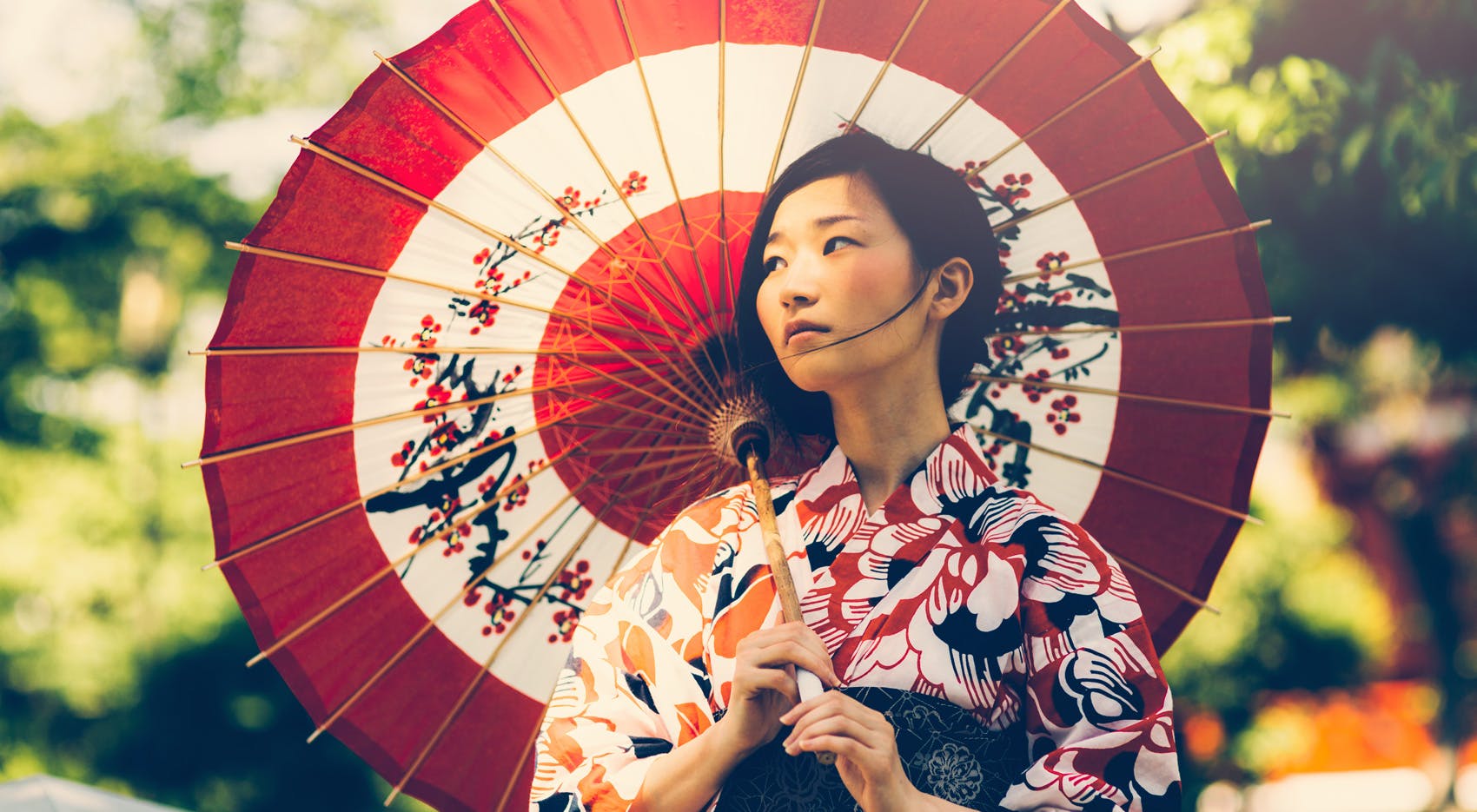
Language requirements
English-speaking jobs in Japan are mainly advertised by multinational businesses, so to work for a traditional Japanese company, you will likely need to demonstrate fluency in Japanese. Learning Japanese will also help you to embrace the culture.
In large cities such as Tokyo, Osaka, and Kyoto, you should be able to get by without speaking Japanese, but with English fluency rates in the country being as low as 475 on the English Proficiency Index , it is worth taking some lessons at home before you accept a job offer.
Japanese can be one of the most difficult languages for native English speakers to learn, so you will need to dedicate time and effort to mastering the pronunciation challenges. If you plan to learn Japanese while you are living in Japan, you will find language schools in most major cities. For example, GenkiJACS is a language school based in Tokyo and Fukuoka. For information on the recognition of qualifications in Japan, see ENIC-NARIC - Japan .
What it's like to work in Japan
Japanese management style is based on group harmony, and open-plan office spaces are common. In this promotion-oriented culture, firmly rooted in a seniority system, the number of hours worked is highly valued.
While Japanese labour law stipulates a maximum of 40 hours per week (eight hours per day), employees of traditional Japanese companies may work up to 12 hours per day, with some overtime unpaid. Even then, it is socially acceptable to go for after-work drinks with colleagues.
Foreign workers are not expected or pressured to follow suit in working these longer hours. Japanese nationals often start at 9am and stay in the office until 6-7pm, usually once their manager/supervisor leaves.
However, the government is attempting to change the demands of Japanese working culture
by encouraging an early finish on the last working Friday of each month and implementing other measures to increase efficiency and ensure a better work-life balance.
With a five-day working week from Monday to Friday, the daily rush hours in busy cities are usually 7-9am and 5-8pm. During these times, public transport will be crowded.
Holiday entitlement in Japan is relatively low and typically depends on the length of employment. Workers are entitled to a minimum of 10 paid vacation days each year, with an average of 18.5 days. However, very few employees take up their full allotment. There are also 16 public holidays, which often fall on either side of a Saturday or Sunday.
If you are considering taking a position with a Japanese firm, your holiday entitlement should be clearly stated in your contract.
Find out more
- Discover what it's like to study in Japan .
How would you rate this page?
On a scale where 1 is dislike and 5 is like
- Dislike 1 unhappy-very
- Like 5 happy-very
Thank you for rating the page
- Join as a Workawayer
- Join as a host
- Buy a gift membership

Travel differently, connect globally
The largest and safest community for cultural exchange, working holidays, volunteering and house sitting in 170 countries. Cultural exchange, working holidays and volunteering
Connect with travellers
Last activity : about 2 seconds ago
Last activity : about 1 minute ago
Last activity : about 2 minutes ago
Find your perfect host
Germany
India
Nepal
Portugal
Switzerland
Slovenia
New Zealand
Latest from the Workaway community
Stay updated on projects from around the world
Check out the latest hosts in your next destination
Take a sneak peek at what the Workaway team is up to
Get inspired by our community's adventures
Meet and connect with fellow workawayers or a new travel buddy
What kind of exchange are you looking for?

Discover more about Workaway
A selection of posts from our blog can be seen below

Watch the official
Workaway video
Please accept marketing-cookies to watch this video.
Your membership also entitles you to:

Workaway Fighting Climate Change
Help us plant more trees across the globe
Your next adventure begins today
Join the Workaway community today to unlock unique travel experiences with over 50,000 opportunities around the globe.
Forgotten your password?
Workaway has committed over $20,000 USD from the Workaway foundation to help refugees from Ukraine.
Upon request all workawayers based in Ukraine will have their accounts extended for free until further notice.
Hosts in Ukraine have been temporarily disabled for safety reasons.
If you are a host and are able to take in refugees please add the information in your account and you will be added to our last minute host list .
Should you wish to donate and help please click here .
- Search Jobs Search Jobs
- Company List Company List
- Found a Job? 🎊 Found a Job? 🎊
For Employers
Get job alerts, how to live in japan and work remotely for an overseas employer [2024 guide].
Updated January 19, 2024

Japan Dev Team
Japan Dev contributor
- Career Development
In today’s digital world, working remotely is becoming increasingly commonplace. In fact, it’s the norm for many of us who work in tech, be it partially or full-time.
In previous posts, I talked about companies in Japan that hire candidates from overseas , allowing them to work remotely , but what about working for an overseas company while you’re living in Japan as a foreigner?
Certainly, there are visa types that allow you to work in Japan if you have a contract here, but coming to Japan just to work remotely falls under more of a grey area. To pull this off, you'll need to be a bit creative.
This is why many foreign professionals who want to stay in Japan for a while consider the working holiday visa . It doesn’t involve a limitation on work hours, and it doesn’t limit your field of work, either.
So, is the working holiday visa really the best way to go? Are there other visa types that might do the trick? I’ll answer all of these and more in today’s post.
First, let’s talk briefly about the distinct nature of the working holiday system.
In this article: 📝
All About Working Holiday Programs
Can i work remotely for a foreign company in japan with a working holiday visa, regarding taxes on foreign income while on a working holiday, other options to work remotely in japan for an overseas company, why work visas and the dependant visa won’t work, extending your stay on a working holiday visa, frequently asked questions on working remotely in japan.
Unlike other visa types that allow you to work in Japan as a foreigner, the working holiday visa is special in that it’s based on specific bilateral treaties between nations.
This means that the rules and regulations regarding the visa can change, depending on your country of origin and the specifics of the agreement it has made with Japan.
The working holiday treaties are created to allow young individuals to experience and learn about partner countries’ cultures, broadening their horizons. Simply put, they’re designed to grant individuals the right to stay and travel in Japan while working for a maximum of twelve months.
An important point to keep in mind is that this visa type is for young individuals, which means between the ages of 18 and 30 for most countries. For some countries, however, the eligibility age is capped at 26 or 25 years.
As a natural implication of the unique nature of working holiday programs, the working holiday visa may not be available to nationals of all countries, as they require the existence of a prior agreement.
To be more specific, Japan currently has working holiday agreements with 29 countries. Each year, new treaties are signed with new nations to extend this list even further. For instance, 2023 brought Uruguay, Finland, and Latvia to the steadily growing list.
To check which countries are added to the list and the specific requirements for nationals of specific countries, you can check the official working holiday programs page on the Ministry of Foreign Affairs website.
While it sounds good on paper at first glance, is the working holiday visa the perfect solution to working remotely in another country while staying in Japan?
Let’s dig deeper.
As I already mentioned, the working holiday visa, unlike a regular work visa, is designated to help you experience the country and its culture. This is the main objective of this visa, and the working part is only secondary.
In simpler terms, the main reason the working holiday visa exists is that it allows you to finance your travels yourself while you’re on holiday .
This means that even if there are no work-hour limits, unlike with the student visa which only allows you to work for a certain number of hours, you’re still obligated to put holiday first, and treat your job as a means to support yourself financially.
So, the “no work hour limitation” rule is actually limited by this requirement, and you’re supposed to only work part-time or do minor freelance work while you travel.
Speaking of limitations, another rule that limits the jobs you can work at is regarding jobs that may disrupt public morals, such as working at nightclubs.
All that being said, given that its main objective is to allow you to stay in Japan and travel/vacation, finding work isn’t among the working holiday visa requirements.
But if you choose to work remotely for a foreign company in Japan with a working holiday visa, there’s one big thing to consider – taxes.

A working holiday is part holiday and part working , enabling you to earn income. If you continue working remotely while on a working holiday visa instead of getting a mini job in Japan, the status of your earnings will be “foreign income.”
Naturally, this income will be subject to tax, however, it won’t be subject to your country of origin’s tax regulations. This is where it gets tricky.
During your stay in Japan, the authority responsible for taxing your earnings will be the Japanese Tax Authority. So, even if it’s possible to not get a part-time job in Japan and work remotely for your company, you’ll still face problems regarding your tax declarations.
As the visa granted to you isn’t a work visa, or a digital nomad visa which hasn’t yet been introduced, declaring your earnings from your job abroad will be quite tricky.
I’ll expand on this later below along with a few alternative solutions, but while we’re on the topic, here’s what you need to know about your tax responsibilities in Japan and your foreign income.
Taxes on Working Holiday and Foreign Income
Depending on whether you’re “selling labor”, i.e. you’re an employee, or working on a contractual basis as a freelancer, you’ll have to file differently.
If you’re providing paid labor as an employee, you will need to file an Article 172 Declaration the day before leaving Japan at the latest. You will be taxed at a rate of 20.42% on your earnings.
If you provide work on a contractual basis , i.e. as a freelancer, on the other hand, you’ll need to file a regular tax return in Japan. This means paying your taxes regularly as if you’re earning income in Japan.
In any case, your tax status depends heavily on your specific situation, so make sure to consult a professional accountant to be sure about your tax-related responsibilities.
Lastly, another point to keep in mind about taxes here is double taxation. If you are subject to double taxation in your home country, you may be able to receive “Foreign Tax Credit” (外国税額控除 / Gaikoku-zeigakukojo) for this, but this isn’t a guarantee and it can also be a bit of a hassle to get.
So, currently, it seems that those on a working holiday visa have to pay taxes in Japan in one way or another. Whether the introduction of a digital nomad visa will change this in the future is still up in the air.
The working holiday visa might not be what you’re looking for, but this isn’t to say that you’re out of options.
Those wondering, “Is there any way to work remotely in Japan for an overseas company using methods other than a working holiday visa?” should know that the answer is a yes . That said, these methods may prove to be trickier to deal with.
As I mentioned in my post on moving to Japan as a software developer , the main issue you’ll face is the visa. There are other options where this isn’t an issue, but they’re situational, like having a spousal visa.
While the working holiday visa can work for you with a few workarounds, you have to be careful when it comes to taxes. This is why, in some cases, it may be best to apply for a different type of visa to work in Japan for an overseas company.
Here are your options.
Short-Term Stay: The Tourist Visa is Remote Work-Friendly

If you plan on visiting Japan and continuing to work at your remote job during your stay, why not apply for a tourist visa instead? This is a common way to work while on vacation utilized by many foreign professionals.
Of course, a glaring downside of the tourist visa is that it allows for a much shorter stay, a maximum of 90 days, to be specific, whereas a working holiday visa allows staying up to a whole year. That said, this shorter stay ensures that you won’t have to deal with the Japanese tax system, as your earnings during your stay won’t be taxable by Japan’s tax authority.
The reason why working remotely while on a tourist visa is allowed is simple: it’s considered to be a temporary work activity that’s part of your work engagement abroad. As this is a part of daily life in today’s digital world and it’s normal for people to take care of business while on vacation, the tourist visa is perfect for you as long as you plan to stay less than 90 days.
Employer of Record Services (EORs): A Simple Workaround
If you’re a full-time employee in your country of origin and want to stay in Japan while continuing to work remotely, another option is using an EOR service.
Short for “Employer of Record”, EOR services act as a third party from Japan that employs you on your company’s behalf.
You can use a company like Deel to do this. Essentially, the company will provide you with an employment contract in Japan, and even sponsor your visa. To do this, you need to have good communication with your employer, seeing as your employer has to be the one who applies to the EOR company for this.
Alternatively, the EOR company can also hire you as a freelancer, and bill your original company of employment as well. In this case, you’ll have to handle taxes as a freelancer in Japan, so it will be the same basic process as with a work holiday visa.
The Intra-Company Transferee Visa
I have a detailed post on this already, but the intra-company transferee visa can be another good option that allows you to continue working remotely while you stay in Japan.
Essentially, this visa is issued to employees of overseas companies who are transferring to a Japanese office or branch of said company.
Of course, this visa is only an option if you’re an employee of a global company that has operations in Japan, such as large corporations like Google or Indeed . This may not be a reality for everyone, but if you play the long game, you may eventually end up in Japan.
If you want to find good global companies to work at that have offices in Japan, as well as ones that hire from overseas and offer visa sponsorship , you can always check Japan Dev where we post new job listings every day.
One important caveat to point out here is that the intra-company visa requires you to be employed at the company for at least a year before you can transfer, so, keep that in mind if you plan to pick this option.
Starting Your Own Company
If nothing else works, starting your own company and continuing to work for your company remotely as a freelancer or contract worker can allow you to stay in Japan. It’s a costly one, but an option nonetheless.
Most people don’t prefer this route because it’s not just expensive but also a bit of a hassle to deal with. Running a company requires accurate bookkeeping and a stronger comprehension of the tax system, which you’ll need an accountant for.
So, with all the responsibility and costs attached, this option seems to be only feasible if you’re willing to invest substantially to open the business (or branch) in Japan.
Student Visa
A student visa is another option that gets you residence in Japan, but, of course, this requires you to be enrolled in an official educational institution. It also requires you to be a full-time student.
The student visa does allow some part-time work, though. You need to apply for a special permit , which allows you to work for a maximum of 28 hours a week (40 hours during school vacation seasons).
While this visa isn’t for everyone, an important point to keep in mind if you pick this option is that you’ll be required to attend classes regularly. As you’re primarily a student, failing your student duties and missing too many classes will result in getting your visa revoked.
I’ve covered a wide range of possibilities and different visa types that can allow you to work remotely in Japan in one way, shape, or form. However, I didn’t mention the dependent visa that’s issued to spouses and the work visa for a reason.
For one, the dependent visa doesn’t recognize remote work from abroad as a relevant work activity, which puts it in an illegal territory. This means that you’ll have to apply for this non-qualified activity, which will only allow you to work 28 hours weekly at a maximum.
The dependent visa, as it is today, doesn’t allow for full-time work. This is because being dependent on someone is the primary requirement of this visa, which also means that your earnings can’t exceed your dependee’s.
Alternatively, a work visa is another non-option if you want to work remotely in Japan. Working for an overseas company isn’t a valid reason to qualify for a work visa, as your contract has to be with a public or private Japanese company/institution.
So, without a workplace in Japan, the Engineer/Humanities/International Services (技術・人文知識・国際業務)" and "Highly Skilled Professional (高度人材) visas aren’t an option for those looking to work remotely while staying in Japan.

The working holiday visa allows staying in Japan for up to a year, and, sadly, it can’t be extended .
It’s possible to cut your stay short and leave early, but staying longer than twelve months isn’t possible on a working holiday visa. You’ll have to leave before your visa expires and reapply for another visa if you want to reenter Japan.
Similarly, those who want to “convert” their working holiday visas to another type, such as the work visa, should also know that this, as a general rule, isn’t possible. Emphasis on the “general” here.
For one, a visa can’t be “converted” but you can apply for another visa should you cease to qualify for the one you’ve applied for or your status changes. This means that even if you get hired and sign a contract with a Japan-based company during your working holiday, you’ll have to apply for a work visa instead of “converting” your current visa.
So, as it stands, the general rule seems to be that if you do find a job that makes you qualified for a work visa, you’ll still have to leave Japan and apply from your country of origin.
That said, it’s important to keep the unique nature of the working holiday programs in mind, which stems from bilateral treaties signed between Japan and individual countries. What this means is that while there are general rules that govern these programs, the specific rules for each country depend on the bilateral treaty between the two countries.
So, depending on the agreements, there may be specific rules for nationals of certain countries that might allow them to apply for a work visa while on a working holiday, but as I said, this isn’t a guarantee and you should check the specific regulations for your country.
Before I go, I’d like to provide some quick answers to some of the biggest burning questions online regarding working holiday visas and working remotely during your stay in Japan.
Can I Live in Japan and Work For a US Company?
Yes, you can work remotely while you’re in Japan using an Employer of Record (EOR) service, or by obtaining an “intra-company transferee visa” if you’re eligible. Alternatively, you can start a company in Japan and work for your employer as a contractor, which may be costly.
Lastly, you can find a new job in Japan, at a subsidiary of a US-based corporation, which you can find plenty of on the Japan Dev company list .
Can I Work Remotely in Japan on a Working Holiday Visa?
Technically, yes, you can. However, what you need to be careful about is filing taxes and declaring your foreign income, given that your earnings will need to be taxed by the Japanese Tax Agency.
Can You Work Remotely While on a Tourist Visa in Japan?
Yes, you can. The tourist visa allows you a short-term stay in Japan, and the work you temporarily engage in as part of a work conducted abroad is allowed during your stay.
Can I Move to Japan With a Remote Job?
Yes, you can move to Japan while remaining employed at a remote job. However, it isn’t easy.
You can obtain a working holiday visa, but this is limited to one year, and you also need to be under 30 years old (under 25 or 26 for nationals of certain countries ). In addition to this, you can use an EOR service, which involves a 3rd party company employing you on behalf of your company.
If your employer is willing to be involved, instead of using an EOR service, your company can hire you as a freelance contractor for the term you stay in Japan. Lastly, if you have the resources, you also have the option to start your own company in Japan.
Of course, if you like Japan, looking for a full-time job while on a working holiday visa can be another option. You can find great opportunities on the Japan Dev job board where we feature jobs from companies with best practices, and some even allow remote work and don’t require any Japanese skills !
Can I Get a Full-Time Job in Japan on a Working Holiday Visa?
If you want to work for a company in Japan full-time while you’re in the country on a working holiday visa, you technically can, as this visa type doesn’t involve any work hour limitations.
That said, the main purpose of the working holiday visa is vacationing, and theoretically, you’re only supposed to be working to finance your travels. If you’ve found a full-time job in Japan, it’s recommended to apply to change your residence status to a more appropriate one, like the work visa types I explored in my How to get an Engineering Visa post.
References:
The Ministry of Foreign Affairs - The Working Holiday Programs in Japan
National Tax Agency: 2023 INCOME TAX AND SPECIAL INCOME TAX FOR RECONSTRUCTION GUIDE
Kamalegal: The Immigration Will Know You Work For More Than 28 Hours
Consulate General Japan in Hong Kong: Working Holiday Visa for Japan Q&A
This post was written by our Japan Dev editorial team.
- Money Forward
- ¥7.9mil - ¥15mil
- ¥6.9mil - ¥10.008mil
- ¥6mil - ¥9mil
Want to write for Japan Dev ? ✍️ 💙 Click here to learn how!
Latest Tech Jobs 🇯🇵
Explore the top developer jobs in Japan for foreigners
- ¥6mil - ¥10mil
- Code Chrysalis
- ¥5mil - ¥7mil
Sign up for our newsletter to get hand-picked tech jobs in Japan – straight to your inbox.
Join 30k readers + get our Developer Salary Guide free ☝️

© 2024 Japan Dev. All rights reserved.
Proudly built in Tokyo.
- Python Jobs
- Backend Jobs
- Front-end Jobs
- Android Jobs
- Javascript Jobs
- Devops Jobs
- Full-stack Jobs
- Kotlin Jobs
- Machine Jobs
- Manager Jobs
- Design Jobs
Curated with 💙 in Tokyo
All our data is gathered from publicly available sources or contributed by users

90,364 + dreams turned into reality

Trip overview
Qualification, trip details.
- Trip location
Accommodation
Trip itinerary, why choose us, how it works, japanese in tokyo.
15 others looking at this too. Next opening is Jul 2024 , with limited spots.
Learn to speak Japanese – the authentic way – while living in the heart of Tokyo for up to 12 weeks on this unforgettable trip.
What better way to learn a language than to jump right into the deep end? Engaging with the community as you live like a local in one of the most advanced countries in the world.
On this done-for-you trip, you’ll get everything you need to live in Tokyo while learning Japanese, including:
- Small group classes. With a max of 8 students per class, you’ll get plenty of personal attention from your tutor during 20 structured lessons a week in a relaxed, supportive environment.
- Accommodation included. For stays of 1-3 weeks, you’ll stay in a homestay with a local family. For stays of 4+ weeks, you’ll stay in a private room in a shared house in Tokyo. Or you can upgrade to private accommodation at an extra cost.
- Certificate of completion. Your hard work and dedication throughout this experience deserve recognition. This valuable addition to your resume is sure to impress potential employers.
Japan, a cultural powerhouse, offers a fascinating blend of ancient traditions and futuristic marvels. To truly immerse yourself, why not learn the language and live amongst the vibrant locals?
Imagine your life in Japan, where old shrines blend with modern skyscrapers, and traditional Geisha share trains with manga-filled surroundings and unique fashion scenes. Engage with the culture, converse with friendly locals, and watch your Japanese language skills flourish day by day.
Explore the intriguing culture, savor the delicious cuisine, marvel at stunning natural landscapes, and experience the warmth of the polite people. This trip allows you to discover the depth of Japan beyond the surface.
Unleash the power of knowing the local language, opening doors to life-changing experiences. With Global, you'll get the best learning experience and a hassle-free trip. We have you covered from visa guidance to accommodation to class enrollment and more.
Tap to show less
Small group Japanese classes
Learn Japanese in a structured, but relaxed environment for 20 lessons per week. With intakes of only 3-8 students you'll get enough personal attention from the teacher to ensure you get the most out of it.
Dedicated Trip Coordinator
Handpicked from an experienced team who’ve been there, done that and ready to guide you through your entire journey and leave no question unanswered.
Pre-Departure Guide
Our in-depth pre-departure guide will have all the information you need about your trip & destination, at your fingertips.
Trip visa guidance
If you need a visa, it’ll get approved as cheap and easy as possible with our step-by-step instructions and personal guidance from your Trip Coordinator.
Personal Travel Concierge
You'll get a personal Travel Concierge to plan your flights, insurance or any add-ons to synchronise perfectly with your trip. Deal with a real human and get a personalised booking experience that ticks all your boxes.
Comfortable accommodation
You'll be staying in a private room in a shared house in Tokyo (4 weeks+) or a homestay (1-3 weeks). Alternatively, upgrade to a private apartment, guesthouse, or homestay (additional cost if staying longer than 3 weeks.)
Private airport transfer
A private chauffeur to take you from the Haneda or Narita Airport to your accommodation located in Tokyo.
Certificate of completion
In recognition of your hard work and dedication throughout the experience. Employers will love this addition to your resume! (For students with attendance records of at least 70%)
Ongoing local team support
From our team and in-country project partners, think of them as your family away from home. Whether you need advice or a shoulder to lean on, you’ll be provided with unlimited support.
Global Emergency Line
Feel confident knowing we have a worldwide emergency team on standby, 24 hours a day, Monday to Friday.
gWorld access
Stay organised with your personalised portal where you can keep all of your important documents and trip details in one spot and gain insider access to everything Global.
Travel alone but never lonely with Social! An exclusive social network inside our gWorld app to talk, share & meet-up with other Global Travellers in your region, with a dedicated Community Manager.
Global Academy
Gain access to an ever-growing range of skills & languages to learn before & whilst you travel.
Marketplace deals
Get exclusive access to deals and discounts through our online Marketplace. Save big on a huge range of products and services from our brand partners worldwide.
$250 off your next trip
The “Travel Bug” is a very real thing! Once you catch it, it really doesn’t go away! Book any other trip with us later and save $250. Why would you ever stop travelling?
Tap to expand
Just in case it’s not clear already, we’re not an employment or recruitment agency. Read more
To qualify for this trip you must meet the following requirements:
- Be between 18 - 85 years of age
- Be a citizen of an eligible country
- Have no criminal convictions in the past 5 years
Ask a question
Chat with us online now, or we can call you back for free, 24 hours Mon-Fri.
Our Study in Tokyo trip is designed to get you travelling, living and learning Japanese overseas as smoothly as possible.
Our partners were founded with one goal in mind: “Japanese for everyday life, rather than academic Japanese.” They’re not here to help people pass exams. Instead, they want to give you the skills to talk with the locals and let Japanese culture become a part of you.
In this trip you’ll be learning in small (the smallest in Japan) group classes with an atmosphere that will make your classmates end up feeling more like family.
After class there are a range of optional add-on activities to choose from, or you and your new friends can do what you like to unleash your new skills in Japan.
Arrive in Japan with the reassurance that you will be many steps ahead of every other traveller in search of international experience in Asia. You can hit the ground running in your studies, with everything else taken care of.
Your included accommodation will be a homestay with a local family (1-3 weeks) or a private room in a shared apartment in Tokyo (4 weeks+). Alternatively, you can upgrade to a private apartment for an additional charge. If you wish to extend your homestay beyond 3 weeks, you can do so as well, with an additional charge.
Alternatively, you can upgrade to a guest house or private apartment for an additional charge.
Spend your time studying in Japan, immersing yourself in the over-the-top (in the best possible kinds of way) culture, exploring the breathtaking landscapes and history, and jetting off to neighbouring countries, leaving the logistical stuff to us.
Embrace a once-in-a-lifetime opportunity to travel, live and teach in Japan learning a lifelong skill that will stay with you forever.
Requirements
You must take a Japanese language test before your arrival to determine your starting level. Complete beginners are not required to take a language test, but must know the hiragana alphabet.
What extra costs will I have?
Flights, travel insurance, souvenirs & spending money.
Your style of accommodation depends on how long you’ll be in Japan.
For trips of 1-3 weeks, you’ll stay in a homestay with a local family. For trips longer than 4 weeks, you’ll stay in a private room in a shared house in Tokyo.
Alternatively, you could upgrade to a private room in a guest house or private apartment at an additional cost.
The beauty of this trip is that you’re not just going to learn the language, you’re going to learn the culture too. Our partners know this and have built a range of optional extras to help you and designed an education structure with lots of time to explore Japan as you wish.
Once you’ve landed at Haneda or Narita Airport, your private airport transfer will be waiting to take you straight to your pre-planned accommodation in Tokyo.
If you’ve arrived a few days before your course starts, use this time to get out and start exploring the amazing new city on your doorstep. You’ll also have new classmates/homestay hosts to get to know.
Our Study trips are designed to get you set up in your new life overseas – learning new skills from the locals – as smoothly as possible. Our goal is to save you time, money, and stress while eliminating the risk of returning home early. Here’s how we do it:
We’re with you from the moment you get started. You’ll be assigned a dedicated Trip Coordinator. They’ll guide you through the next steps and answer all your questions. They’ll also help you with the pesky visa. No guesswork – only the right paperwork, approved the first time, in your hands before you leave.
Your Personal Travel Concierge will help with flights, insurance, visas, and any add-ons you’d like for your trip. These are real humans too – no robots here.
Once you land in Japan our local team will be waiting for you at the airport. You’ll be taken straight to your initial accommodation in Tokyo.
But our support doesn’t end there. We’ll be in touch during your trip to make sure everything is going smoothly. If you have any questions or concerns we’re one quick message, DM, email, or carrier pigeon away.
Our team is well travelled so you can rely on our experience. We’re with you every step of the way.
Join 80,000+ travellers – giving us 10,000+ 4 & 5 star reviews – by choosing Global to make your travel dreams come true.
Most travellers book their trip 6-12 months in advance. Dates are flexible, but spaces are limited. So if you’re serious about studying in Japan, don’t delay.
With our Book Now, Decide Later feature, you can get started with a small deposit today, and take a full year to choose your dates.
We’ll take over from there, helping you with visas, flights, accommodation, and setting you up with our partner in Japan.
This is the trip for you if you’re after the ultimate teaching experience in Japan, complete with everything you need and 24/7 support.
Click the red button to check dates & prices.
The main purpose of this trip is to get you speaking Japanese like a local while you live like a local. Which makes this trip perfect for those who want to connect more with the country, instead of simply stopping in for a visit.
Our in-country partners operate with one goal in mind: “Japanese for everyday life, rather than academic Japanese.”
These classes won’t teach you formal Japanese with strict rules and fancy words. It’s all about being able to communicate with Japanese people in Japanese, so you can let the Japanese culture become part of you as you get to know it more intimately.
One of the many reasons you’re encouraged to strike up conversation with locals after hours – even if you’re a newbie.
Living amongst the community while you’re learning the language will fast track your path to success. It will also help you integrate into the community so you’ll get to know Japan much better than most tourists.
New on the 'gram
Frequently asked questions.
As the world’s leading gap-year and "work & travel" company, we pride ourselves on providing a premium service for Global Travellers. Choose from a variety of awesome experiences worldwide, and let us assist you with visas, pre-departure preparations, flights, insurance, and tours. Throughout your journey, our cool tech features will support you every step of the way. As a Global Traveller, gain access to gWorld, our personalised app designed to enhance your travel experience. Keep important documents and trip details handy, and take advantage of exclusive Marketplace deals, a vibrant social network, language learning resources, side trips, meet-ups, and more. It's like having all your favorite travel apps merged into one, but even better! But our support doesn't end there. With four international offices, over 100 dedicated staff members, a 24/5 emergency team, and the backing of over 90,000 Global Travellers who have turned their travel dreams into reality with us, rest assured you're in good hands. We also proudly boast the most and best reviews in the biz, and maintain a massive following on our social channels including Instagram, TikTok, and Facebook. Embark on your next adventure with confidence and ease. Join us and discover the world in a meaningful way!
While we would love to include flights and insurance in our trip packages, it is not feasible to have a fixed price due to the diverse destinations, trip durations, and individual coverage needs of our travellers from around the globe. However, once you register for the trip, we will assign you a dedicated Travel Concierge. They will work closely with you to arrange the ideal flights and insurance tailored to your specific adventure. Rest assured, our team is here to ensure you have a smooth and hassle-free travel experience from start to finish!
With so many incredible options, we understand that selecting the perfect study trip can be tricky. That's why we recommend booking your favourite one, and your dedicated Trip Coordinator will guide you through the project details. They will consider your interests, goals, and desired outcome for the trip. If we find another trip that better suits your preferences, we can easily swap you over to ensure you have the ideal study experience. Rest assured, we're here to help you find the right fit!
Most of our study trips are designed to cater to participants of all abilities and levels of experience. You can confidently join our program without any previous background or expertise. Our courses are structured to provide a valuable and enriching learning experience for everyone, ensuring you can make the most out of your study trip adventure, and go home with a new or developed skill!
The group sizes for our study trips typically range from 4 to 12 people, with variations depending on the specific trip. Most of our participants are travelling solo and share a common enthusiasm for learning and making new connections. And as our travellers come from various countries worldwide, joining a study trip offers an exceptional opportunity to build a diverse network of friends from all corners of the globe!
Absolutely! Upon successfully completing the study course, you will be awarded a certificate to acknowledge your hard work and dedication. This valuable certificate serves as a notable achievement and an impressive addition to your resume. Future employers will recognise your commitment to personal and professional growth, reinforcing your qualifications and enhancing your career prospects. Or, frame it on your wall to show off to family and friends of the epic skill you picked up abroad!
After the last unexpected disruption to travel caused by the..c word..people are now more eager than ever to venture out and explore the world, determined not to miss out on any experiences. Global Work & Travel works on a first-in-best-dressed basis. Booking earlier ensures that you don’t miss out on the best intake, season, placements and more! We recommend our travellers take 6-12+ months to plan their trip for a reason - to make sure you’ve got everything organised perfectly, stress-free. As a Global Traveller you’ll get exclusive access to gWorld, our personalised app where you can keep all of your important documents and trip details in one spot and gain insider access to everything Global. This is where you will find exclusive Marketplace Deals, a unique social network to connect you with other like-minded Global Travellers, access to our Academy with an ever-growing range of skills & languages, and so much more. Think all of your favourite apps merged into one, but like, better? Why not give yourself something to look forward to by booking that trip!
Yes you can! Simply tell your Trip Coordinator after booking that your friend is also going and they can link your profiles. For most of our trips we should be able to have you and your friends placed together or nearby. Meaning that you can live, work, play & travel together! But wait there's more! Not only can you travel the world with your besties at your side, you can also earn some extra cash towards your own trip just by referring your friends to Global Work & Travel. You can learn more about the great referral rewards program inside your gWorld account once you join. And for those who decide to go-it-solo, we’ve made it easier to meet other Global Travellers in the same region as you. Just like any other social platform, you’ll be able to interact, share, chat and meet with some really cool people who are doing trips just like you!
At Global Work & Travel, we share a deep love for animals and fully understand the special bond you have with your pet. We recognise the challenges of embarking on a trip without them. Due to travel restrictions, requirements, and limited pet-friendly accommodations among our host organisations, we regretfully cannot facilitate their inclusion in the journey. However, many of our customers choose to entrust their pets to a family member or friend, embark on their adventure, and return home to wagging tails and furry cuddles.
We know that life can get in the way of travel, so all our trips come with a great deal of flexibility. In most cases, if you cannot travel on your selected date, you can place your trip on hold to deal with whatever is holding you back, and continue in the future without incurring any penalty. You may also have the option of transferring to an entirely different trip and destination as well, or even transferring your trip to a friend or family member. In the event that you need to outright cancel your trip, if you give us 84* days notice you can do so with only a 50% cancellation fee. Your refund of the balance will come in the form of a Store Credit which you can put toward any other trip that we offer, including tours through third-party providers, as well as holidays through DealsAway.com, and is valid for 2 years from date of issue. As international travel can be complex, your options are based on the progress of your trip organisation and our support team can assist you in finding the best solution for your needs.
1. Choose a trip style
Find your dream experience & destination, then secure your spot with a flexible & low deposit. Activate your gWorld to unlock some cool perks. Well done! The hardest part’s over!
2. We become friends
Book a time to meet your dedicated Trip Coordinator who knows all the ins & outs of your trip. They’ll be by your side and working behind-the-scenes to pull everything together.
3. Time to go!
We’ll get your tickets, accommodation & transfers ready. Our in-country team or partner will have everything prepared & waiting for your arrival. Get on the plane with no worries!
4. 24/5 support
Never stress, knowing we’re there with you when you need us with ongoing & unlimited local team support. And just in case, we’ve got an emergency team on stand-by, 24 hours, Mon-Fri.
Still have questions?
Why go global, flexible trips.
The unexpected can happen sometimes. Can't travel right now? Swap your trip, gift it or save it for later with our Lifetime Deposit Guarantee.
Worldwide support
Know that someone is always ready to assist throughout the journey & they’re only a call, tweet, comment, text or double tap away, 24/5.
We're the experts
With over 10 years in the industry and a team of over 90 passionate pros, you can bet we know our stuff better than anyone else.
Partner network
We have over 1,200 partners around the globe, so we have access to plenty of exclusive opportunities to make your trip the best it can be.
Check out these similar trips
Security Alert May 17, 2024
Worldwide caution, update may 10, 2024, information for u.s. citizens in the middle east.
- Travel Advisories |
- Contact Us |
- MyTravelGov |
Find U.S. Embassies & Consulates
Travel.state.gov, congressional liaison, special issuance agency, u.s. passports, international travel, intercountry adoption, international parental child abduction, records and authentications, popular links, travel advisories, mytravelgov, stay connected, legal resources, legal information, info for u.s. law enforcement, replace or certify documents.
Before You Go
Learn About Your Destination
While Abroad
Emergencies
Share this page:
Travel Advisory January 8, 2024
Japan - level 1: exercise normal precautions.
Japan – Level 1: Exercise Normal Precautions
Reissued after periodic review without changes.
Exercise normal precautions in Japan.
Read the country information page for additional information on travel to Japan.
If you decide to travel to Japan:
- Enroll in the Smart Traveler Enrollment Program (STEP) to receive Alerts and make it easier to locate you in an emergency.
- Follow the Department of State on Facebook and Twitter .
- Follow Embassy Tokyo’s American Citizen Services section on Facebook and Twitter .
- Review the Country Security Report for Japan.
- Visit the CDC page for the latest Travel Health Information related to your travel.
- Prepare a contingency plan for emergency situations. Review the Traveler’s Checklist .
Embassy Messages
View Alerts and Messages Archive
Quick Facts
Duration of intended period of stay. Please note you cannot travel on a passport you have previously declared as lost or stolen even if you subsequently locate it
One page required for entry stamp
Amounts equivalent to ¥1,000,000 or above subject to declaration
Embassies and Consulates
U.S. Embassy Tokyo 1-10-5 Akasaka, Minato-ku, Tokyo 107-8420 Japan Telephone: 81-3-3224-5000 Emergency After-Hours Telephone: 81-3-3224-5000 Fax: 81-3-3224-5856 Our Navigator Assistant will guide you to the information you need.
U.S. Consulate General Osaka-Kobe 2-11-5, Nishitenma, Kita-ku, Osaka 530-8543, Japan Telephone: 81-6-6315-5900 Emergency After-Hours Telephone: 81-3-3224-5000 Fax: 81-6-6315-5914 Our Navigator Assistant will guide you to the information you need.
U.S. Consulate General Naha 2-1-1 Toyama, Urasoe City, Okinawa, Japan Telephone: 81-98-876-4211 Emergency Telephone: 81-3-3224-5000 Fax: 81-98-876-4243 Our Navigator Assistant will guide you to the information you need.
U.S. Consulate General Sapporo Kita 1-jo Nishi 28-chome, Chuo-ku, Sapporo 064-0821, Japan Telephone: 81-11-641-1115 Emergency After-Hours Telephone: 81-11-641-1115 Fax: 81-11-643-1283 Our Navigator Assistant will guide you to the information you need. All assistance at the Consulate General Sapporo is by appointment only.
U.S. Consulate Fukuoka 5-26 Ohori 2-chome, Chuo-ku, Fukuoka 810-0052, Japan Telephone: 81-92-751-9331 Emergency After-Hours Telephone: 81-3-3224-5000 Fax: 81-92-713-9222 [email protected] Our Navigator Assistant will guide you to the information you need. Routine services are provided by appointment only.
U.S. Consulate Nagoya Nagoya International Center Bldg. 6th floor, 1-47-1 Nagono, Nakamura-ku, Nagoya 450-0001, Japan Telephone: 81-52-581-4501 Emergency After-Hours Telephone: 81-3-3224-5000 Fax: 81-52-581-3190 Our Navigator Assistant will guide you to the information you need. Emergency services are provided by U.S. Consulate General Osaka-Kobe.
Destination Description
See the Department of State’s Fact Sheet on Japan for information on U.S-Japan relations.
Entry, Exit and Visa Requirements
Visit the Embassy of Japan website for the most current visa information.
There are no COVID-related entry requirements for U.S. citizens.
Entry & Exit:
- You must have a valid passport and an onward/return ticket for tourist/business "visa free" stays of up to 90 days. Your passport must be valid for the entire time you are staying in Japan.
- You cannot work on a 90-day "visa free" entry.
- "Visa free" entry status may not be changed to another visa status without departing and then re-entering Japan with the appropriate visa, such as a spouse, work, or study visa.
- Visit the Embassy of Japan website for the most current information on all visa categories.
- Japanese immigration officers may deny you entry if you appear to have no visible means of support.
- All foreign nationals are required to provide fingerprint scans and to be photographed at the port of entry. Exceptions to this requirement include diplomatic and official visa holders, minors, and individuals covered under SOFA Article IX.2. For further information about landing procedures, please visit the Immigration Bureau of Japan’s website .
- Make sure your passport is valid. Note you cannot travel on a passport you have previously declared as lost or stolen even if you subsequently locate it. Japanese authorities will likely deny you entry into Japan if you attempt to do so. If you have reported your passport lost or stolen, you must apply for a new passport before travel.
Transiting Japan:
- Ensure that your passport and visa are valid and up-to-date before you leave the United States. Passport services are not available at the airport.
- Airlines in Japan may deny you boarding for transit if you do not have the required travel documents for an onward destination in another country or if your passport does not have six months of validity remaining. For the entry requirements of the country you are traveling to, visit the State Department's Country Specific Information website.
Military/SOFA Travelers: While active-duty U.S. military personnel may enter Japan under the Status of Forces Agreement (SOFA) with proper Department of Defense (DoD) identification and travel orders, all SOFA family members, civilian employees, and contractors must have valid passports to enter Japan. Please consult the DOD Foreign Clearance Guide before leaving the United States.
See the Immigration Bureau of Japan’s website for various immigration procedures.
HIV/AIDS Restrictions: The U.S. Department of State is unaware of any HIV/AIDS entry restrictions for visitors to or foreign residents of Japan.
Find information on dual nationality , prevention of international child abduction and customs regulations on our websites.
Safety and Security
For police services in Japan, dial 110. For fire or ambulance services, dial 119.
Crime: Crime against U.S. citizens in Japan is generally low and usually involves personal disputes, theft, or vandalism. In addition:
- Robberies committed after a victim has been drugged from a spiked drink can occur, especially in nightlife districts.
- Sexual assaults are not often reported, but they do occur, and victims may be randomly targeted. Victim's assistance resources or shelters are difficult for foreigners to access.
- Hate-related violent crimes rarely occur, although some U.S. citizens have reported being the target of discrimination because of their nationality or their race.
- Pick pocketing can occur in crowded shopping areas, on trains, and at airports.
- Police reports must be filed before leaving Japan, as Japanese police will not accept reports filed from overseas.
- In instances involving credit card theft or fraud, Japanese police often provide a report number rather than a police report. You can provide this report number to your credit card company to confirm the incident with the police.
Entertainment and Nightlife Districts in Tokyo:
- Exercise caution in all entertainment and nightlife districts throughout Japan, especially Roppongi, Kabuki-cho, Shibuya, and Ikebukuro.
- Incidents involving U.S. citizens in these areas include physical and sexual assaults, drug overdoses, theft of purses, wallets, cash and credit cards at bars or clubs, and drugs slipped into drinks.
- Drink spiking at bars and entertainment venues, especially in areas such as Roppongi and Kabuki-cho, near Shinjuku, has led to robbery, physical and sexual assaults, and credit card fraud. Some victims regain consciousness in the bar or club; other victims may awaken on the street or other unfamiliar locations.
- U.S. citizens have reported being threatened with gun or knife violence in such venues so that they will pay exorbitant bar tabs or withdraw money. U.S. citizens have also reported being beaten when they have refused to pay or hand over money.
- There have been reports of U.S. citizens being forcibly taken to ATMs and robbed, or made to withdraw funds after being unable to pay exorbitant bar tabs.
- Please be aware that Roppongi, Kabuki-cho, and other entertainment and nightlife districts have also been the scenes of violence between criminal syndicates.
See the Department of State and the FBI pages for information on scams.
Police reports must be filed at the nearest police station prior to departure from Japan. The Japanese police cannot accept reports filed from overseas. Report crimes to the local police at 110 and contact the U.S. Embassy at 03-3224-5000 (011-81-3-3224-5000 from overseas). Remember that local authorities are responsible for investigating and prosecuting the crime.
See our webpage on help for U.S. victims of crime overseas .
- help you find appropriate medical care;
- assist you in reporting a crime to the police;
- contact relatives or friends with your written consent;
- explain the local criminal justice process in general terms;
- provide a list of local attorneys;
- provide information on victim’s compensation programs in the U.S. ;
- provide an emergency loan for repatriation to the United States and/or limited medical support in cases of destitution
- help you find accommodation and arrange flights home; and/or
- replace a stolen or lost passport.
Contacting Police, Fire and Ambulance Services: You can reach the police throughout Japan by dialing 110. Fire and ambulance services can be contacted by dialing 119. Note that English-speaking dispatchers may not be available. Please review advice on “Calling for Help” on our website . If you need assistance, you should be able to describe your address/location in Japanese or find someone who can do so, since few police officers speak English.
Domestic Violence: Victim's assistance resources or battered women's shelters exist in major urban areas, but are difficult for foreigners to access. These types of resources are also generally unavailable in rural areas. Investigations of sexual assault crimes are often conducted without female police officers present, and police typically ask about the victim's sexual history and previous relationships.
Tourism: The Victim's assistance resources or battered women's shelters exist in major urban areas, but are difficult for foreigners to access. These types of resources are also generally unavailable in rural areas. Investigations of sexual assault crimes are often conducted without female police officers present, and police typically ask about the victim's sexual history and previous relationships.
See our webpage for more information on insurance providers for overseas coverage.
Local Laws & Special Circumstances
Criminal Penalties: You are subject to Japanese law while you are in Japan. If you violate Japanese laws, even unknowingly, you may be arrested, imprisoned, or deported. If you are arrested in Japan, even for a minor offense , you may be held in detention without bail for several months or more during the investigation and legal proceedings.
Some offences are also prosecutable in the United States, regardless of Japanese law. For examples, see our website on crimes against minors abroad and the Department of Justice website.
The vast majority of arrests of U.S. citizens in Japan are for drug-related offenses. Japanese authorities aggressively pursue drug smugglers and users, including recreational users with sophisticated detection equipment, "sniffing" dogs, blood tests, “stop and frisk” tactics, and other methods. Penalties for possessing, using, or trafficking a drug that is illegal in Japan are severe, and convicted offenders can expect long jail sentences and fines. Please note that some drugs which may be legal in certain jurisdictions outside of Japan, including marijuana and synthetic drugs, remain illegal in Japan. This also applies to certain prescription drugs that doctors in the United States may prescribe. Japanese law makes no distinction between medical and recreational marijuana; therefore, having a prescription for medical marijuana will not help you avoid arrest or prosecution. Even possession of a small amount of marijuana for personal medical or recreational use can result in a long jail sentence and fine. Japanese customs officials carefully screen incoming packages, and individuals who are mailed drugs can be arrested and prosecuted as drug traffickers.
Confiscation of Prescription Drugs and Other Medication: It is important to note that some medications that are routinely prescribed in the United States, including Adderall and marijuana, are strictly prohibited in Japan. The Japanese government decides which medications may be imported legally into Japan. The Embassy and Consulates of Japan in the United States have limited information available and do not have a comprehensive list of specific medications or ingredients. Please see more information on importing medicines into Japan.
You must carry your U.S. passport or Japanese Residence Card (Zairyu Kado) with you at all times. In Japan, you may be taken in for questioning if you do not have your passport or Japanese residence card to show your identity and status in Japan (e.g., as a visitor, student, worker, or permanent resident).
It is illegal to work in Japan while in tourist or visa-waiver status. Overstaying your visa or working illegally may lead to fines of several thousands of dollars, and in some cases, re-entry bans as long as 10 years, or indefinitely for drug offenders. For additional information, please see Japan’s Immigration Control and Refugee Recognition Act and contact the Japanese Embassy or nearest Japanese Consulate in the United States for more information.
Driving under the influence of alcohol could also land you immediately in jail. The blood-alcohol limit in Japan is 0.03%. Punishments can be up to 10,000 USD in fines and up to five years in prison.
Possession of a gun or ammunition is a crime in Japan. Carrying a knife with a locking blade, or a folding blade that is longer than 5.5 cm (a little more than two inches), is illegal in Japan. U.S. citizens and U.S. military personnel have been arrested and detained for more than 10 days for carrying pocket knives that are legal in the United States but illegal in Japan. The possession of lock-picking tools is illegal in Japan.
Establishing a Business : Individuals establishing a business or practicing a profession that requires additional permits or licensing should seek information from the competent local authorities, prior to practicing or operating a business.
A list of English-speaking lawyers located throughout Japan is available on our website .
Arrest Notification : If you are arrested or detained, ask police or prison officials to notify the U.S. Embassy immediately. See the Department of State’s webpage and the Embassy’s website for additional information.
Counterfeit and Pirated Goods: Although counterfeit and pirated goods are prevalent in many countries, they may still be illegal according to local laws. You may also pay fines or have to give them up if you bring them back to the United States. See the U.S. Department of Justice’s website for more information .
Faith-Based Travelers: See our following webpages for details:
- Faith-Based Travel Information
- International Religious Freedom Report – see country reports
- Human Rights Report – see country reports
- Hajj Fact Sheet for Travelers
- Best Practices for Volunteering Abroad
LGBTQI+ Travelers: There are no legal restrictions on same-sex sexual relations or the organization of LGBTI+ events in Japan.
Laws governing rape, sexual commerce, and other activity involving sexual relations do not apply to same-sex sexual activity. This leads to lower penalties for perpetrators of same-sex rape and sexual assault and greater legal ambiguity surrounding same-sex prostitution.
See our LGBTQI+ Travel Information page and section 6 of our Human Rights report for further details.
Travelers with Disabilities: The law in Japan prohibits discrimination against persons with disabilities. Japanese disability laws require the public sector to provide reasonable accommodations and the private sector to make best efforts in employment, education, access to health care, or the provision of other services; however, there are no penalties for noncompliance. Social acceptance of persons with disabilities in public is not as prevalent as in the United States.
Although Japan’s accessibility laws mandate that new construction projects for public use include provisions for persons with disabilities, older buildings are not likely to have been retrofitted for accessibility. At major train stations, airports, and hotels, travelers with disabilities should encounter few accessibility problems. Note that many smaller stations are inaccessible to those who cannot climb stairs. Information on travel in Japan for travelers with disabilities is available at Accessible Japan .
Travelers with disabilities can learn more about resources available in country from the Japan National Tourism Organization’s traveling with a disability page .
Students: See our Students Abroad page and FBI travel tips .
Women Travelers: See our travel tips for Women Travelers .
Conditions at Prisons and Detention Facilities: Japanese prisons and detention facilities maintain internal order through a regime of very strict discipline. U.S. citizen prisoners often complain of stark, austere living conditions and psychological isolation. Heating in winter can be inadequate in some facilities, food portions can be significantly smaller than what many may be accustomed to, and access to specialized medical care, particularly mental health care, at detention facilities and prisons is sometimes limited. Additional information on arrests in Japan is available on our embassy website.
Customs Regulations: Please contact the Japanese Embassy or nearest Japanese consulate in the United States, or visit the Japanese Customs website for specific information regarding import restrictions and customs requirements.
Japanese customs authorities encourage the use of an Admission Temporaire/Temporary Admission (ATA) Carnet in order to temporarily import professional equipment, commercial samples, and/or goods for exhibitions and trade fairs into Japan. For additional information, please call (212) 354-4480, or email the U.S. CIB for details.
Pets: The Japanese Animal Quarantine Service (AQS) sets procedures for importing pets. At a minimum, the process will take seven to eight months, though the process can take up to a year before a pet may enter Japan. Advance planning is critical. You can find more information about importing a pet into Japan or information about exporting a pet from Japan on our Embassy website.
Employment Issues: U.S. citizens should not come to Japan to work without having the proper employment visa arranged ahead of time. Teaching English, even privately, and serving as hosts/hostesses are both considered "work" in Japan and are illegal without the proper visa.
Some U.S.-based employment agencies and Japanese employers do not fully or correctly represent the true nature of employment terms and conditions. A minimum requirement for effectively seeking the protection of Japanese labor law is a written and signed work contract. If there is no signed contract, Japanese authorities are not able to act on behalf of foreign workers. If you are coming to Japan to work, carefully review your contract and the history and reputation of your Japanese employer before traveling to Japan. Complaints against U.S.-based employment agencies or recruiters may be directed to the Better Business Bureau or the Office of the Attorney General in the relevant state(s).
Disaster Preparedness : Japan is prone to natural disasters, including earthquakes, typhoons, tsunamis, and landslides. See the Embassy’s webpage for recommendations and steps you can take to prepare for an emergency. The Japan Tourism Organization’s Safety Tips app and NHK World app provide Japanese government emergency “J-Alerts” to your cell phone in English through push notifications. “J-Alerts” can provide early warning emergency alerts on earthquakes predicted in a specific area, sometimes seconds before an earthquake hits.
Radiation: Fukushima Daiichi Nuclear Power Plant : The Government of Japan continues to closely monitor the conditions at and around the Fukushima Daiichi Nuclear Power Plant. You should comply with all travel restrictions and cautions put into place by the Government of Japan for areas surrounding the plant. For more information, contact the Japan Nuclear Regulation Authority .
For police service in Japan, dial 110. For fire or ambulance, dial 119.
Ambulance services are widely available but receiving hospitals may decline to accept inbound patients unless they can provide proof of funds to pay for services.
COVID-19 Testing:
- Travelers should contact Japanese local health providers to determine the location of testing facilities within Japan. A non-comprehensive list of some COVID-19 testing facilities can be found here on the Embassy website.
COVID-19 Vaccines:
- The COVID-19 vaccine is available for U.S. citizens to receive in Japan.
- Review the Government of Japan’s English language website on COVID-19 vaccinations in Japan.
- Visit the FDA's website to learn more about FDA-approved vaccines in the United States.
The Department of State does not pay medical bills. Be aware that U.S. Medicare/Medicaid does not apply overseas. Most hospitals and doctors overseas do not accept U.S. health insurance.
Medical Insurance: Make sure your health insurance plan provides coverage overseas. Some care providers in Japan only accept cash payments. See our webpage for more information on insurance providers for overseas coverage. Visit the U.S. Centers for Disease Control and Prevention for more information on type of insurance you should consider before you travel overseas.
We strongly recommend supplemental insurance to cover medical evacuation.
If traveling with prescription medication, check with the government of Japan’s Ministry of Health website to ensure the medication is legal in Japan; possession, use, or importation of a prescription drug that is illegal in Japan may result in arrest and criminal prosecution. Always carry your prescription medication in original packaging with your doctor’s prescription. U.S. prescriptions are not honored in Japan, so if you need ongoing prescription medicine, you should arrive with a sufficient supply for your stay in Japan or enough until you are able to see a local care provider.
Vaccinations: Be up-to-date on all vaccinations recommended by the U.S. Centers for Disease Control and Prevention.
Further health information:
- World Health Organization
- U.S. Centers for Disease Control and Prevention (CDC)
Japan has a national health insurance system which is available only to those foreigners with long-term visas for Japan. National health insurance does not pay for medical evacuation. Medical caregivers in Japan may require payment in full at the time of treatment or concrete proof of ability to pay before they will treat a foreigner who is not a member of the national health insurance plan.
U.S.-style and standard psychological and psychiatric care can be difficult to locate outside of major urban centers in Japan and generally is not available outside of Japan's major cities. Extended psychiatric care can be very difficult to obtain.
Air Quality: Visit AirNow Department of State for information on air quality at U.S. Embassies and Consulates.
Travel and Transportation
Road Conditions and Safety : Driving in Japan can be complicated and expensive. Traffic moves on the left side of the road. Those who cannot read the language will have trouble understanding road signs. Highway tolls can be very high, and city traffic is often very congested. A 20-mile trip in the Tokyo area may take two hours. There is virtually no legal roadside or curbside parking; however, traffic is commonly blocked or partially blocked by those illegally parked curbside. In mountainous areas, roads are often closed during the winter, and cars should be equipped with tire chains. Roads in Japan are much narrower than those in the United States.
Traffic Laws : Japanese law provides that all drivers in Japan are held liable in the event of an accident, and assesses fault in an accident on all parties. Japanese compulsory insurance (JCI) is mandatory for all automobile owners and drivers in Japan. Most short-term visitors choose not to drive in Japan. Turning right or left on red lights is not permitted in Japan, and all passengers are required to fasten their seat belts.
Japan has a national 0.03 percent blood-alcohol-level standard for driving, and drivers stopped for driving under the influence of intoxicants will have their licenses confiscated. If you are found guilty of driving under the influence, speeding, or blatantly careless driving resulting in injury, you are subject to up to 15 years in prison.
See our Road Safety page for more information. The National Police Agency (NPA) oversees the administration and enforcement of traffic laws in Japan. You can find further information in English on the NPA English website . Information about roadside assistance, rules of the road, and obtaining a Japanese driver's license is available in English from the Japan Automobile Federation (JAF) web site . See the Japan National Tourism Organization’s website for car rental and driving in Japan.
Emergency Assistance : For roadside assistance, please contact the Japan Automobile Federation (JAF) at 03-5730-0111 in Tokyo, 072-645-0111 in Osaka, 011-857-8139 in Sapporo, 092-841-5000 in Fukuoka, or 098-877-9163 in Okinawa.
International Driving Permits (IDPs): An international driving permit (IDP) issued in the United States by the American Automobile Association (AAA) or the American Automobile Touring Alliance (AATA) is required of short-term visitors who drive in Japan. You must obtain an IDP issued in your country of residence prior to arriving in Japan. The U.S. Embassy andU.S. consulates do not issue IDPs. IDPs issued via the Internet and/or by other organizations are not valid in Japan.
Foreign residents in Japan who use an IDP may be fined or arrested. In practice, the term “resident” involves more than simply visa status or length of stay in Japan and is determined by the police. In short, a driver license from country outside Japan is not a substitute for a valid Japanese license for foreign residents. See the U.S. Embassy’s website for more information on driving in Japan.
Aviation Safety Oversight : The U.S. Federal Aviation Administration (FAA) has assessed the government of Japan’s Civil Aviation Authority as being in compliance with International Civil Aviation Organization (ICAO) aviation safety standards for oversight of Japan’s air carrier operations. Further information may be found on the FAA's safety assessment page .
Maritime Travel : Mariners planning travel to Japan should also check for U.S. maritime advisories and alerts in the Alerts section of the Embassy’s messages. Information may also be posted to the U.S. Coast Guard homeport website , and the National Geospatial-Intelligence Agency (NGA) broadcast warnings website portal select “broadcast warnings.”
For additional travel information
- Enroll in the Smart Traveler Enrollment Program (STEP) to receive security messages and make it easier to locate you in an emergency.
- Call us in Washington, D.C. at 1-888-407-4747 (toll-free in the United States and Canada) or 1-202-501-4444 (from all other countries) from 8:00 a.m. to 8:00 p.m., Eastern Standard Time, Monday through Friday (except U.S. federal holidays).
- See the State Department’s travel website for the Worldwide Caution and Travel Advisories .
- Follow us on Twitter and Facebook .
- See traveling safely abroad for useful travel tips.
Review information about International Parental Child Abduction in Japan . For additional IPCA-related information, please see the International Child Abduction Prevention and Return Act ( ICAPRA ) report.
Travel Advisory Levels
Assistance for u.s. citizens, learn about your destination, enroll in step.

Subscribe to get up-to-date safety and security information and help us reach you in an emergency abroad.
Recommended Web Browsers: Microsoft Edge or Google Chrome.
Make two copies of all of your travel documents in case of emergency, and leave one with a trusted friend or relative.
Afghanistan
Antigua and Barbuda
Bonaire, Sint Eustatius, and Saba
Bosnia and Herzegovina
British Virgin Islands
Burkina Faso
Burma (Myanmar)
Cayman Islands
Central African Republic
Cote d Ivoire
Curaçao
Czech Republic
Democratic Republic of the Congo
Dominican Republic
El Salvador
Equatorial Guinea
Eswatini (Swaziland)
Falkland Islands
France (includes Monaco)
French Guiana
French Polynesia
French West Indies
Guadeloupe, Martinique, Saint Martin, and Saint Barthélemy (French West Indies)
Guinea-Bissau
Isle of Man
Israel, The West Bank and Gaza
Liechtenstein
Marshall Islands
Netherlands
New Caledonia
New Zealand
North Korea (Democratic People's Republic of Korea)
Papua New Guinea
Philippines
Republic of North Macedonia
Republic of the Congo
Saint Kitts and Nevis
Saint Lucia
Saint Vincent and the Grenadines
Sao Tome and Principe
Saudi Arabia
Sierra Leone
Sint Maarten
Solomon Islands
South Africa
South Korea
South Sudan
Switzerland
The Bahamas
Timor-Leste
Trinidad and Tobago
Turkmenistan
Turks and Caicos Islands
United Arab Emirates
United Kingdom
Vatican City (Holy See)
External Link
You are about to leave travel.state.gov for an external website that is not maintained by the U.S. Department of State.
Links to external websites are provided as a convenience and should not be construed as an endorsement by the U.S. Department of State of the views or products contained therein. If you wish to remain on travel.state.gov, click the "cancel" message.
You are about to visit:
We’re sorry, this site is currently experiencing technical difficulties. Please try again in a few moments. Exception: request blocked
Japan On Sale: Why It’s Summer’s Big Travel Bargain
Americans are flocking to Japan in droves, thanks to the strong greenback that makes everything seem 15% cheaper than last year.
- Share to Facebook
- Share to Twitter
- Share to Linkedin
Thanks to the strong U.S. dollar, Japan feels 35% cheaper than five years ago.
T he U.S. dollar is going strong relative to many foreign currencies right now, which translates to international travel bargains for savvy shoppers. One of the easiest way for American travelers to grab a “deal” on an overseas trip is to choose a destination where the comparatively strong dollar delivers a built-in automatic discount for on-the-ground costs like hotels, dining and attractions.
Right now, a trip to many countries in Asia is easier on the wallet than in recent years. Is Bangkok or Phuket on your bucket list? The dollar buys 8.5% more Thai baht than a year ago. The greenback also buys 8.5% more Vietnamese dong and Indonesian rupiah, 6.2% more Malaysian ringgit and 5% more Taiwan dollars.
But far and away the Asian currency most impacted by the strong U.S. economy is the Japanese yen. Today one U.S. dollar buys 156.36 yen, 15% more than one year ago, and an eye-popping 43% more than five years ago.
The weak yen has helped propel Japan to be the most popular destination in Asia. In March 2024, the number of visitors to Japan exceeded three million foreign tourists in a single month for the first time ever, according to the Japan National Tourism Organization (JNTO). That was 69.5% more than the same month the previous year and 11.6% more compared to March 2019.
While the lion’s share of those visitors came from neighboring Asian countries, American travelers are also getting the memo. In March, a record 290,100 Americans visited Japan in a single month—a 42% jump year over year and a 64% increase compared to the same month in 2019.
Unsurprisingly, the weaker yen has goosed spending by vacationers whose money goes further than in decades. Foreign visitors to Japan spent 1.75 trillion yen ($11.2 billion) in the January to March period, according to data from the JNTO. That’s an increase of 52% compared to pre-pandemic 2019.
Airfare to Japan
Japan is now so popular that it grabs 29% of all U.S.-based searches for trips to Asia and 8% of all international searches for the summer this year, according to the airfare-tracking site Hopper.
That huge demand has kept airfares ticking upward. For May departures, tickets from the U.S. to Japan are averaging $1,281 per ticket, up 4% from this time last year. Flights this summer are averaging $1,379 per ticket, up 2% from last year and up 26% from this time in 2019, according to Hopper data.
Meanwhile, additional supply is keeping airfare inflation in check as U.S. and Japanese airlines ramp up service between the two countries. Today about 60 flights leave the U.S. for Japan every day, 6% less than before the pandemic. Still, that’s a big improvement over this time last year, when only 49 daily flights were departing to Japanese destinations.
From June to August, carriers will be flying 9% more seats than last summer. And by midsummer, the market between the US and Japan will be nearly restored to pre-pandemic capacity.
Four U.S. airlines currently fly to Japan: United Airlines, with 19% share of the seats; Delta Air Lines, with 10%; and Hawaiian Airlines and American Airlines, each with 7% share of capacity. (Three Japanese airlines—Japan Airlines, All Nippon Airways and Zipair—make up over half of all scheduled seats.)
Hopper data shows that 92% of U.S. travelers planning trips to Japan want to fly into Tokyo, but a finite number of flights are allowed in and out of Haneda airport. The Japanese government determines how many slots to make available to U.S. carriers, which need to apply to the U.S. Department of Transportation (DOT) for the right to a route.
Last year, United Airlines and American Airlines applied to DOT to launch nonstop U.S.-to-Tokyo flights. United had wanted a new nonstop from Houston’s George Bush Intercontinental Airport (IAH) to Haneda. Instead, it was awarded a new Guam-to-Tokyo route, which it launched on May 1, joining United’s other Tokyo-bound flights from Newark, Los Angeles, San Francisco, Honolulu, Washington D.C. and other cities.
American Airlines’ newest route to Japan will launch on June 28. Flights from New York’s John F. Kennedy International Airport to Tokyo will be the carrier’s fourth daily nonstop to Haneda, joining existing service from Dallas, New York, Chicago, Los Angeles, San Francisco and other cities.

- Editorial Standards
- Reprints & Permissions
Join The Conversation
One Community. Many Voices. Create a free account to share your thoughts.
Forbes Community Guidelines
Our community is about connecting people through open and thoughtful conversations. We want our readers to share their views and exchange ideas and facts in a safe space.
In order to do so, please follow the posting rules in our site's Terms of Service. We've summarized some of those key rules below. Simply put, keep it civil.
Your post will be rejected if we notice that it seems to contain:
- False or intentionally out-of-context or misleading information
- Insults, profanity, incoherent, obscene or inflammatory language or threats of any kind
- Attacks on the identity of other commenters or the article's author
- Content that otherwise violates our site's terms.
User accounts will be blocked if we notice or believe that users are engaged in:
- Continuous attempts to re-post comments that have been previously moderated/rejected
- Racist, sexist, homophobic or other discriminatory comments
- Attempts or tactics that put the site security at risk
- Actions that otherwise violate our site's terms.
So, how can you be a power user?
- Stay on topic and share your insights
- Feel free to be clear and thoughtful to get your point across
- ‘Like’ or ‘Dislike’ to show your point of view.
- Protect your community.
- Use the report tool to alert us when someone breaks the rules.
Thanks for reading our community guidelines. Please read the full list of posting rules found in our site's Terms of Service.
- Share full article
Advertisement
Supported by
One Japanese Word Changed the Course of Her Career
Devin Halbal had amassed hundreds of thousands of TikTok followers with her inspirational videos. Then she went to Asia.

By Jessica Roy
In January, the travel and fashion influencer Devin Halbal decided to take a trip to Kurashiki, a city in the Okayama Prefecture of Japan. Ms. Halbal, a Queens-born 26-year-old who goes by the username “Hal Baddie” on TikTok, had spent four years traveling around Europe with an extra-long selfie stick and a dream, sharing videos with hundreds of thousands of followers.
Ms. Halbal had become known for coining inspirational phrases, like “ doll check-in ” as a proud calling card to her fellow trans girls, and “ Met Gala behavior ,” for when you’re feeling and acting confident about what you’re wearing. Her fame seemed to peak in 2022 when she was profiled by W magazine and Rolling Stone, and invited on a brand trip to Ibiza by Loewe. But after globe-trotting and a few months off with friends in New York, she wanted to do more than “fashion and affirmations,” she said in a recent interview.
It was with this mind-set that she set off for Asia. Ms. Halbal said she loves finding places that are off the beaten path and close to nature — and Kurashiki, a small city of less than half a million people known as the birthplace of jeans in Japan , fit the bill.
She was experimenting, posting different types of travel videos. At the same time, she was learning Japanese, and there was one word she kept hearing everywhere: kudasai, which translates to “may I please have.”
“It kept on ringing in my head,” she said. “I would just be sitting down on a random Tuesday and I would just be thinking to myself: kudasai , kudasai .” She decided to make a video of herself using the word while walking down the street: “Sushi, kudasai,” (sushi, please) she says in a sing-songy voice while strutting with her selfie stick. “Ocha, kudasai.” (Tea, please.)
To date, the video has gotten more than 13.5 million views.
@hal.baddie The only words I know in Japanese. ♬ original sound - Devin Halbal
“I had no idea, out of all my content, that the one video that just goes super, super viral all throughout Asia is me saying five words,” Ms. Halbal said.
The video’s success convinced her to extend her stay in Japan; she went to Tokyo, Takamatsu, Mt. Fuji and Yamanashi, making videos about food , travel and the Japanese language. She made friends and volunteered on a farm . She started not just getting recognized on the street, but swarmed by fans . A quick trip to pick up some bubble tea became a two hour meet-and-greet. Then the fan accounts started cropping up, as did media coverage , calling her the “kudasai girl.”
“Now, ‘kudasai’ is the trend word in Japan,” a Japanese TikToker named Sorari said in a video posted last month, expressing surprise about how quickly and thoroughly Ms. Halbal’s content spread.
Ms. Halbal’s trip, originally planned for two weeks, turned into two months, and her reach expanded beyond Japan to other countries.
She started getting comments in Korean, Thai, Hindi, Nepali and Mandarin. “I’m like, ‘I have to do an Asia tour,’” she said. “What better way to continue learning about other cultures and continue learning about languages?”
Ms. Halbal attributes her success to the way she tries to actually speak the language and engage with different cultures wherever she goes. “I’m actually trying to pronounce the food in the way that they pronounce it — I’m not doing it with an American accent,” she said.
Last month, Ms. Halbal left Japan and traveled to Busan, South Korea. She’s still saying kudasai, but now she’s also started incorporating Korean into her vernacular, including the word for please, juseyo .
Now, the largest percentage of her followers on Instagram , where Ms. Halbal also shares her videos, are from the United States, but South Korea comes in second. At a recent meet-up at Korea University in Seoul, hundreds of fans crowded around her on the street, jostling to take selfies with her, or to give her food recommendations and ask her to speak in their language.
“Showcasing people’s food, showcasing people’s culture, in a way is a sense of community,” Ms. Halbal said. “You’re saying: I respect you, I value you and I value your food.”
She is continuing to tour Asia, with plans to potentially go to China, the Philippines and Malaysia. She said she was also weighing a permanent move to South Korea or Japan.
“I feel really at home here,” Ms. Halbal said. “People are so sweet. They treat me like I’m their family. So even though I’m ‘solo traveling,’ I never feel alone here.”
In South Korea, she said, some fans have started asking her to get into pop music.
“Especially in Korea, I think there’s a certain rhyme and cadence to the way that I’m speaking that they really want me to make music,” she said.
Is she ready to make the leap?
“I’m entering my K-pop star era,” Ms. Halbal teased.
Explore Our Style Coverage
The latest in fashion, trends, love and more..
The Uncool Chevy Malibu: The unassuming car, which has been discontinued by General Motors, had a surprisingly large cultural footprint .
A Star Is Born: Marisa Abela was not widely known before being cast as the troubled singer-songwriter Amy Winehouse in “Back to Black.” That’s over now .
A Roller Rink’s Last Dance: Staten Island’s Roller Jam USA closed for good after almost two decades. Here’s what some patrons had to say on its final night .
The First Great Perimenopause Novel: With her new book, “All Fours,” Miranda July is experimenting again — on the page and in her life.
Mocktails Have a New Favorite Customer: As nonalcoholic cocktails, wines and beers have become staples on bar menus across America, some children have begun to partake .
- Subscribe Digital Print

- Nasu murders
- Latest News
- Deep Dive Podcast
Today's print edition
Home Delivery
- Crime & Legal
- Science & Health
- More sports
- CLIMATE CHANGE
- SUSTAINABILITY
- EARTH SCIENCE
- Food & Drink
- Style & Design
- TV & Streaming
- Entertainment news
Japan's workers turning to agencies that help them quit jobs

If you had a hard time going back to work on Tuesday following the long Golden Week holiday period , and even considered handing in your two weeks’ notice right then and there, just know: you weren’t alone.
The company, cleverly named Momuri — the Japanese phrase for “I can’t take it anymore” — said this is the highest number of requests it has ever received in a single day since it opened in March 2021.
“There has always been a trend for the number of requests to go up following the Golden Week in previous years as well, since it is the first long consecutive holiday of the fiscal year, ” said Shiori Kawamata, a representative of the company.
“As there is the term ‘ gogatsubyō ,’ there is a tendency for an increasing number of people to request resignations for psychological reasons (following the Golden Week), given that people had time to take a break and think about various things,” she added.
Gogatsubyō, translated directly as “May disease,” is a widely known phenomenon in Japan where people experience post-Golden Week blues or demotivation over having to return to school or work after the long break. Since many people start new jobs or the new school year at the beginning of the fiscal year in April, the month of May can be especially difficult for many as they look to return to business as usual.
Of the clients the agency aided on Tuesday, 29 were new hires who had just started work last month. However, it would be wrong to assume that only young people use this service — roughly 40% of the company's clients are over the age of 40.
This year has been especially busy for the firm, with Tuesday's tally besting the previous record of 134 clients set just days earlier, after the conclusion of the first half of the Golden Week holiday.
Kawamata said the uptick was also due to agencies such as Momuri becoming more well-known among the public in recent years thanks to growing media coverage.
A survey by major human resource company En Japan last year showed that more than 70% of respondents knew of the existence of such companies.
The services they provide — the agency submits a client's intention to resign and negotiates with their employers on their behalf — are attracting interest as many workers in Japan struggle to quit their jobs on their own for various reasons.
For instance, a worker who had just started working at an information technology company in April used the service after experiencing so-called power harassment at work. Her boss had shouted at her using remarks such as “you’re useless.”
But she was not alone: two other new hires at the same company also used the service to resign.
Clients often visit the agencies for help in dealing with these kinds of toxic work environments that make it difficult for them to bring up the topic of quitting or even deny resignation requests. Many also have been pushed to the brink psychologically, and need support to take steps toward quitting.
“That said, we don’t want people to develop the habit of quitting — resignation services like ours don't exist so that people can quit right away whenever they want to,” said Kawamata. “We’d like people to use our resignation service as a last resort that they can rely on as protection so that they can move forward (with their lives).”
She said the recent spike in resignation requests should also be a wake-up call for companies in Japan to develop a sense of urgency over employee turnover rates and make changes to improve work conditions.
“This high number of resignation requests may cause controversy,” said Kawamata. “But by drawing attention to it, if more companies reconsider their working environments and improve relationships with their employees, there would be meaning in the existence of resignation services like ours — that's what our company believes.”

In a time of both misinformation and too much information, quality journalism is more crucial than ever. By subscribing, you can help us get the story right.
- Weird But True
- Sex & Relationships
- Viral Trends
- Human Interest
- Fashion & Beauty
- Food & Drink
trending now in Lifestyle

Bride and groom blasted for 15 outrageous wedding-day rules for...

I'm a doctor — here's my 'game-changer' trick to quickly fall...

Ozempic dupe costs just $5 at your local gas station — and Gen...

Guy Fieri reveals the key piece of fitness gear that helped him...

Plus-size influencer rips airport worker who allegedly refused to...

This Asian nation grappling with invasive raccoon population...

I used to work for the Queen — now I live in a bug-infested...

Dear Abby: My husband is creating a hostile home for me and my...
Japan grappling with invasive raccoon population nearly 40 years after bringing them to the country.
Thanks for contacting us. We've received your submission.
Japan’s raccoon infestation has gotten considerably worse over the last decade, multiple Japanese news sources are reporting.
Nearly 1,300 raccoons were captured during the 2022 fiscal year, said Tokyo’s government.
This is about five times the number that were captured 10 years ago, reported Kyodo News, a Japanese news agency.
In 2013, the Japanese government reiterated the need to combat raccoons as an invasive species.
Raccoons are not native to Japan, but were brought to the country in the 1970s following the popularity of the 1977 anime “Rascal the Raccoon.”
The anime was based on the autobiographical novel “Rascal, A Memoir of a Better Era” by Sterling North. In the book, North recounts raising a baby raccoon, Rascal.
In response to the show, people in Japan began importing raccoons to keep as pets.
At its peak, more than 1,500 raccoons were being imported to Japan each year, said Smithsonian Magazine.
But while the Japanese government moved quickly to ban both the import of raccoons, and the practice of keeping them as pets, it was too little, too late.

Raccoons are not easy pets, Jaime Arslan, owner of two rescue raccoons, wrote on her Instagram page for her raccoons Louie and Lucy.
Raccoons, she said, “can be very destructive in a home” and need to be constantly entertained. Additionally, raccoons “can and will bite,” either as aggression or as a form of play.
Their care, too, is extremely expensive, as most veterinarians will not see a raccoon.
Many Japanese families learned these lessons the hard way, and simply released their pet raccoons into the wild after they became unmanageable for their homes.
As raccoons have no natural predators in Japan, they were quickly able to establish a population, and are now found in each of the country’s 47 prefectures, said Kyodo News.
In addition to the damage to the environment, the raccoon invasion has also wreaked havoc on the country’s agricultural industry, said Kyodo News.
In 2022, raccoons were blamed for causing nearly $3 million in damage to crops, they said.

Combating the raccoons has proven to be extremely difficult due to their intelligent natures, said Kyodo News.
Local efforts to trap the raccoons or to immediately contact officials upon seeing damage inflicted by a raccoon have “so far proved ineffective.”
Start and end your day informed with our newsletters
Morning Report and Evening Update: Your source for today's top stories
Thanks for signing up!
Please provide a valid email address.
By clicking above you agree to the Terms of Use and Privacy Policy .
Never miss a story.
“Our traps are sometimes broken as raccoons are also desperate to live. Only a fraction is actually caught, so we are unable to grasp their overall range,” said an official from a municipality in western Tokyo to Kyodo News.
Japan is not the only country that is dealing with invasive raccoons.
In Germany, raccoons were imported there in the 1930s for their fur. The animals were released into the wild, where, similarly to Japan, they were able to establish a population.
In 2023, there were multiple reports of raccoons entering German homes, making a mess, and stealing beer, said the magazine Food & Wine. And in 2019, a drunk raccoon visited a Christmas market in Erfurt, Germany.
The raccoon, who reportedly drank leftover mulled wine, was shot dead by a hunter, said German media.
Share this article:
- 2024 Sexiest Men Of the Moment
- Of The Essence
- Celebrity News
- If Not For My Girls
- The State Of R&B
- Time Of Essence
- SSENSE X ESSENCE
- 2023 Best In Black Fashion Awards
- 2023 Fashion House
- Fashion News
- Accessories
- 2024 Best In Beauty Awards
- Girls United: Beautiful Possibilities
- Relationships
- Bridal Bliss
- Lifestyle News
- Health & Wellness
- ESSENCE Eats
- Food & Drink
- Money & Career
- Latest News
- Black Futures
- Paint The Polls Black
- Essence Holiday Gift Guide 2023
- 2024 Black Women In Hollywood
- 2024 ESSENCE Hollywood House
- 2024 ESSENCE Film Festival
- 2024 ESSENCE Festival Of Culture
- 2023 Wellness House
- 2023 Black Women In Hollywood
- Girls United
WHERE BLACK CULTURE, COMMUNITY AND CONSCIOUSNESS MEET
Sign up for essence newsletters the keep the black women at the forefront of conversation., the black girl's guide to getting lost and getting grillz in tokyo.

Tokyo’s a traveler’s dream. It’s clean. It’s fly. It’s overflowing with modern conveniences. And over the past few years, the city’s rising global popularity has intensified, making the destination—that was once closed off to the rest of the world—a top pick for Black and Brown travelers . In October 2022, Japan lifted a majority of its strict entry requirements. Americans can finally visit the country without a visa, which is likely why our social feeds have been drizzled with our favorite creatives stepping through Tokyo and neighboring Kyoto, Osaka, and Shizuoka, home to Mount Fuji, Japan’s highest and most iconic mountain.
Made up of 23 districts, each distinctively unique, no matter your travel style, there’s a vibe for you in Tokyo.
I visited with my partner for the first time in October 2023. He’s basically a local. He’s been over a dozen times and was the perfect person to uncover and indulge in next-level, off-the-beaten-path experiences in the largest and one of the most populated cities in the world. We moved from ward to ward easily by e-bike , a fun and efficient way to take the town. But more on that later.
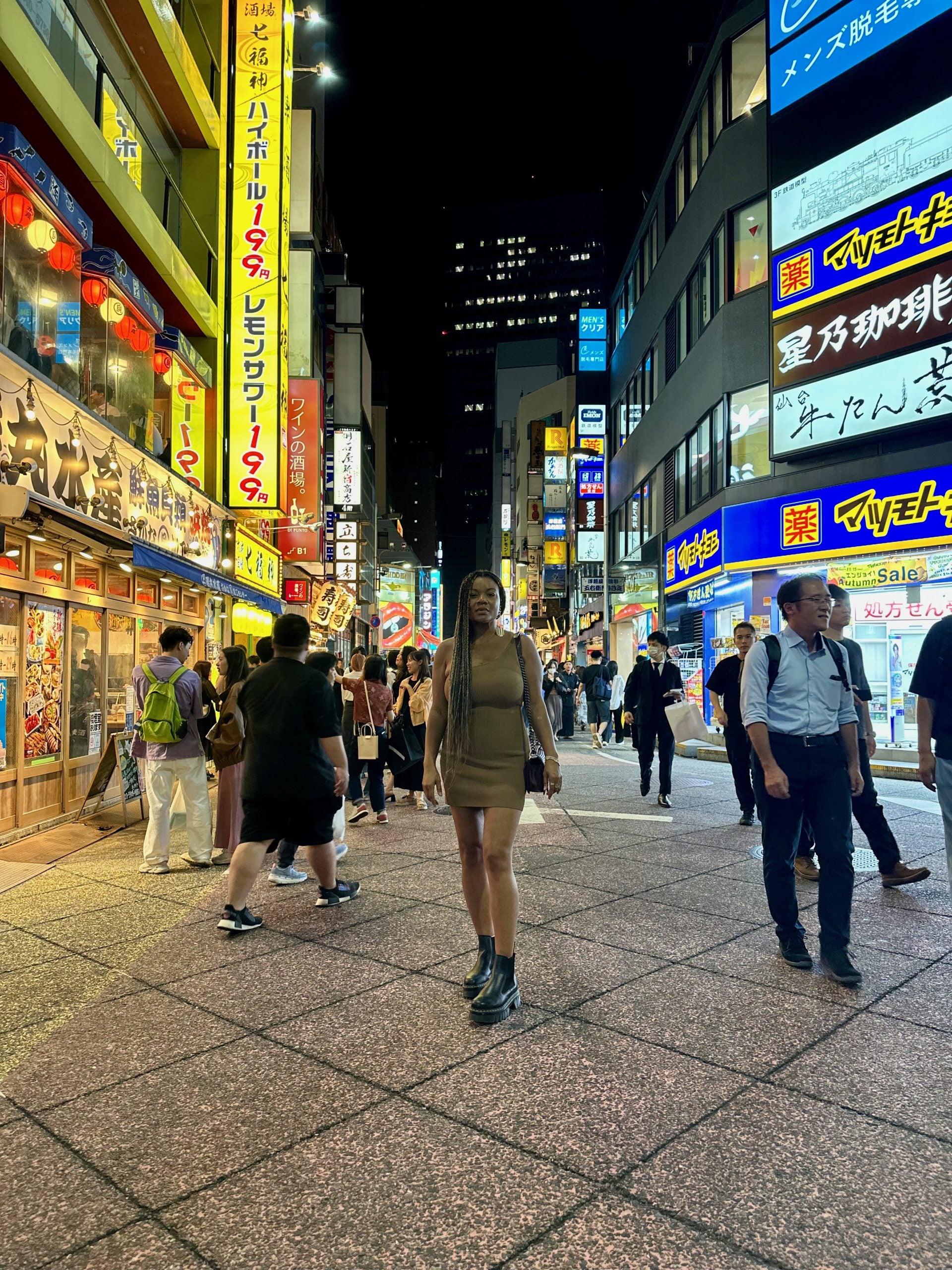
From narrow neon alleyways flaunting the best hole-in-the-wall eateries and cozy jazz kissas spinning Curtis Mayfield and Rufus on vinyl to underground whiskey bars and an evolved art, food, and hotel scene designed with rooftop pools hidden in plain sight, Tokyo is smooth. It’s one of those destinations where if you know, you know. Yes, the language is a barrier, and the voyage from the U.S. is long , but the spirit of Japan and the warmth of its people make it worth it.
Travelers of color need to go to Japan. Explore the landscape. Experience the culture—one of the oldest and most revered in the world—with honor, family, and tradition at its core. Interact with the people. My most memorable moments during our trip were random and unrehearsed and involved connecting with natives in an authentic way. We learned slang among locals and ate homemade carrot cake at Paddlers Coffee in Shibuya. We got fitted for Grillz by Japanese jeweler Tetsuya Akiyama. The man responsible for ASAP Rocky’s custom mouth bling has been running Grillz Jewelz in the Okachimachi district for 17 years. We sat with expats-turned-Japanese citizens in the backstreets of Harajuku for what felt like hours, dissecting what it’s like to be Black in Japan.
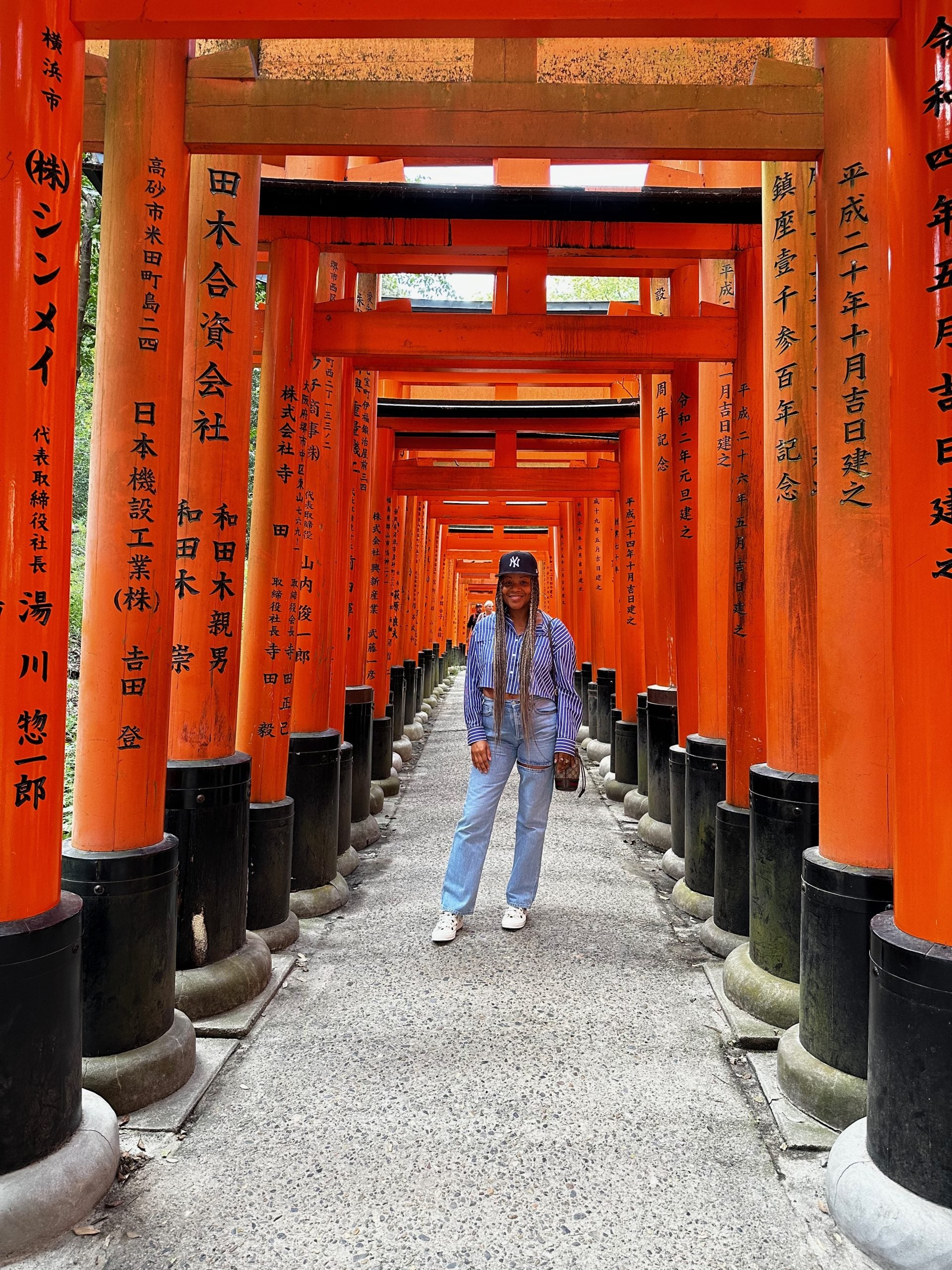
Get lost in Tokyo. And when you’re done, board the bullet train to Kyoto for Imperial Palaces, Geisha culture, and 500-year-old Kaiseki cuisine. Thank me later.
Trunk Hotel Yoyogi Park
When we return to Tokyo, Trunk Hotel in Yoyogi Park will be our base. The latest outpost of the chic Trunk trilogy is the largest, with 20 guest rooms, five suites, and a heated rooftop infinity pool that offers panoramic views of Yoyogi Park—one of the most enchanting parks in Tokyo. Trunk’s ethos is deeply rooted in local culture, which means the atmosphere is intimate with an elevated edge, the design is minimal and peaceful, and the call to action to unwind and indulge is undoubtedly understood.

Hoshinoya Tokyo
Located in Otemachi, one of the city’s financial centers, Hoshinoya Tokyo feels like a traditional Japanese ryokan with the fixings of a contemporary luxury hotel. If you’re looking for an enriching experience with next-level hospitality, this is it. Every tatami-lined floor functions as a private ryokan with six rooms and an ochanoma—a central lounge with tea and sweets readily on deck. Don’t miss the rooftop Onsen, traditional tea ceremony, Nippon Cuisine, and 4-course Japanese breakfast.
Serving up Japanese-style and Indian-style curry, Curr y Up, Nigo’s hole-in-the-wall eatery named by Pharrell, is a no-frills comfort food haven. Try a two-in-one combo plate with butter chicken, beef, keema, or go straight veg.

Uogashi Nihon-Ichi
Experiencing a standing sushi bar is essential while you’re in Tokyo and Uogashi Nihon-Ichi is the one. If there’s a line outside, join it. The chefs are quick, the fish is fresh, and there’s an English menu on deck, so you can order with speed and confidence.
The atmosphere is cozy and chill. The dishes are tasty and creative. The owner/chef is humble and incredibly kind. Go for the food and drink, but stick around for the music. The Internet, Erykah Badu , and ASAP Ferg were in rotation while we dined.

Confession: I first tried jollof rice at Palava Hut , a West African joint in Minato City. Believe the hype, because the rice is right. As is the chicken, fish and plantain. It was all made-to-order in a curtained-off kitchen by the sweet chef, Nora, a kind soul with an even kinder smile.
Grillz Jewelz
Even if you have zero interest in owning custom bottoms, tops, or fangs, pull up on Tetsuya Akiyama, owner and creator of Grillz Jewelz. The gallery wall, case of mouthpieces, and stack of books showcasing the breadth and depth of his work make it tough not to tap in. Plus, Akiyama is mad cool.
I walked into his shop skeptical about getting grillz and left two hours later with an order placed. It’s worth noting that it takes at least three months for your bling to be ready. And yes, he ships internationally, so don’t stress.

Luup Electric Bikes
If you’re looking for a fun and efficient way to move from ward to ward with ease, look to Luup . The popular micromobility company has delegated parking spots set up around the city, with electric scooters and bikes up for grabs. Luup’s app allows riders to check ports in real time to reserve an available bike or scooter in a location closest and most convenient for them. I highly recommend downloading the app before you depart for Japan.
With centuries-old temples and imperial palaces, quaint cobblestone streets, Zen gardens, vibrant markets, and hip shopping complexes, Kyoto preserves Old Japan while openly embracing the new. Geisha are one of the most sought-after sights in Kyoto. Spotting one around town is rare but not impossible; however, experiencing Kaiseki Cuisine is equally as neat. The traditional multi-course dinner, consisting of small dishes with different tastes and textures, dates back to the 16 th century.
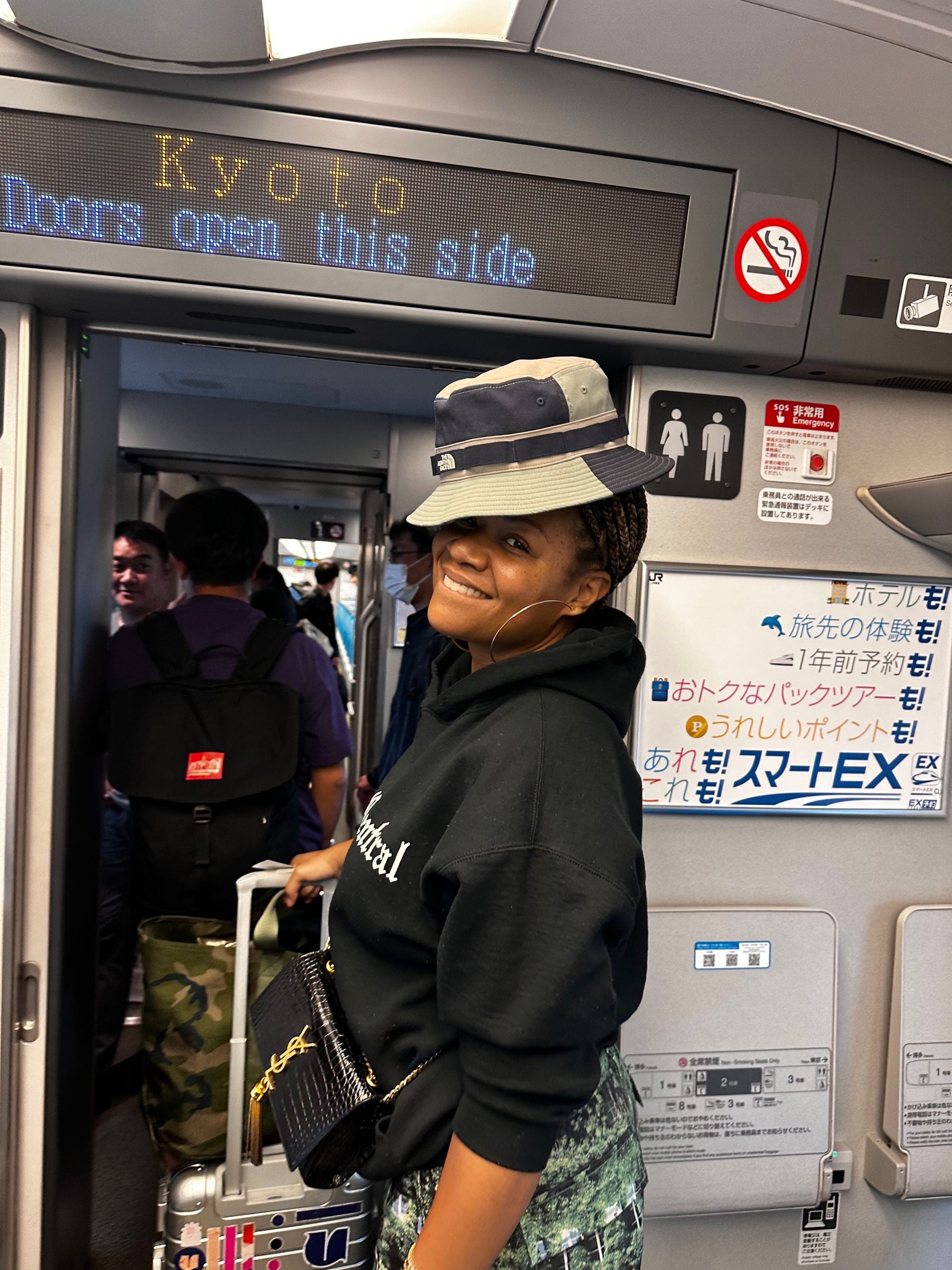
Eat at Toki and Honke Owariya . Experience Nishiki Market, Fushimi Inari-Taisha and Kinkau-ji—Kyoto’s famed Golden Pavilion. Rest at Hotel The Mitsui and spend a full day indulging in their award-winning spa. Reserve a private Onsen and enjoy natural spring bathing in complete privacy.
COMPANY INFORMATION Our Company Customer Service Essence Ventures Change Your Address Contact Us Job Opportunities Internships Media Kit SUBSCRIBE Newsletters Give a Gift of ESSENCE Magazine Tablet Edition FOLLOW US MORE ON ESSENCE Home Love Celebrity Beauty Hair Fashion ESSENCE festival ESSENCE.com is part of ESSENCE Communications, Inc.

IMAGES
COMMENTS
2. Teaching English at cram schools. Teaching English as a native speaker is the most common position for foreigners looking to work and travel in Japan. The jobs often don't pay very well, but backpackers can find work teaching at any time of year, and therefore is a great starting point for new arrivals looking to learn about Japanese culture.
With Worldpackers you can do volunteer work in Japan for a year, a month or a few weeks. You can travel as much as you want to any place you like, paying for membership just once a year. Worldpackers allows you to have an affordable trip, even to a country that is usually expensive for tourists, like Japan. Check our host list and talk to our ...
Native English speaker to join our family in Fuchu City, Tokyo, Japan. We are looking for 2 workawayers who can start from Jun 28th 1. Au Pair (spend time with my son and teach English (from july 29th ~) 2. Pet Sitter (take care of my dog, Ron and take him out for walk. (after September) We prefer females only.
About Working Holidays in Japan. In Japan, a working holiday is a visa classification that falls under the "Designated Activities" category. It allows you to live, travel, and work in Japan for a limited period of time, usually about a year, although it varies by country. Working holiday programs are bilateral agreements Japan enters into with ...
Working Holiday Period in Japan. The maximum period of stay in Japan on a working holiday is one (1) year. The period of stay cannot be extended. Those who want to work and travel in Japan should check their schedule in advance to make adjustments so they can stay for the maximum period. Many people take a long break (months or a year) from work.
Working Holiday Visas are free. However, you Embassy/Consulate-General of Japan may charge a processing, issuing, or visa fee of some kind. If you extend your visa after arriving in Japan, you will have to pay a fee of US$26.43 *. at the Immigration Office when you pick up your new visa. Written by: Maria Danuco.
Our Work Japan program supports you with finding work in Tokyo for the whole year, with the option for a pre-arranged ski season job in Niseko, Rusutsu or Furano over the winter. ... the United Kingdom and in other jurisdictions. Company registration number: 1391030. Trading as BUNAC Travel Services Limited, 5 Richbell Place, London, WC1N 3LA ...
Securing employment during your stay in Japan is an essential part of your work and travel experience. We'll discuss different job opportunities available for foreigners, including English teaching positions, hospitality and tourism-related jobs, seasonal work options, and the possibility of remote work.
Working Holiday Jobs in Japan. When you are on a Working Holiday Visa in Japan, there are no restrictions on weekly working hours or wages. Depending on your preferences and your financial situation, you can work part-time or full-time. Many Working Holiday travelers take on 2 or 3 part-time jobs simultaneously.
1. Travel Around Japan. The main purpose of this visa is technically still traveling, so do travel as much as you can and as your budget allows! After all, Japan has plenty to offer, from North to South. 2. Work! Most people come to Japan under a Working Holiday visa so they could both work and travel with relative ease.
Travel to Japan. Combining two worlds - modern and ancient, Japan will leave you speechless with its futuristic wonders and unique traditions. It's a cultural powerhouse that offers so much from ancient temples to modern architecture on the forefront of innovation and technology. And we can't forget the amazing food including the freshest ...
Visas. A Word About Covid. Route #1: Teach English. Route #2: Apply for JET or MEXT. Route #3: Job Hunt as a Tourist. Route #4: Job Hunt While Studying Japanese in Japan. Route #5: Serious Shuukatsu for Students. Route #6: Typical Job Hunt. Route #7: Move to Japan as an Expat.
Estimated Salaries. Average salaries vary greatly depending on the type of position and the location of your work abroad in Japan. Working in the tourism and hospitality industry can earn you an average of $3,000 per month in Tokyo. Working in hostels and hotels often provide a lower salary, but offer you free housing.
Visas to Japan and Immigration Information. Visas for U.S. citizens hoping to travel, study or work in Japan are controlled by the Japanese government. While the Japanese Government is the ultimate authority on visa matters, we include some general information on visas for U.S. citizens to aid in your planning.
The Japan working holiday visa is great and diverse! You could find yourself doing all kinds of jobs like working in a restaurant, being an au pair for a local family, light factory work, or sales. Legally, most jobs are allowed, with part-time (28 hours per week) or full-time (40 hours per week) available.
April 1, 2024. Japanese. Tweet. 1. Outline. The working holiday programmes are, based on bilateral arrangements, intended to make it possible for the youth of Japan and its partner countries/regions to enter each country/region primarily for the purpose of spending holidays while allowing them to engage in employment as an incidental activity ...
For the latest guidance on entering Japan for work, see GOV.UK - Foreign travel advice - Japan. Jobs in Japan. Japan is home to some of the world's leading companies in technology, such as Sony, Toyota, and Panasonic. If you are interested in working in a cutting-edge field, Japan is a great place to be. Other major Japanese industries include:
Workaway is here to promote fair exchange between budget travellers, language learners or culture seekers who can stay with 1000s of families, individuals or organizations that are looking for help in over 165 countries.
Hotel, Travel and Hospitality job information. Work in Japan · Jobs with International Companies · Jobs that Use English · "CareerCross" is your number 1 resource for finding bilingual jobs with global companies in Japan, Japanese companies, and abroad!
Yes, you can move to Japan while remaining employed at a remote job. However, it isn't easy. You can obtain a working holiday visa, but this is limited to one year, and you also need to be under 30 years old (under 25 or 26 for nationals of certain countries ).
Japan, a cultural powerhouse, offers a fascinating blend of ancient traditions and futuristic marvels. To truly immerse yourself, why not learn the language and live amongst the vibrant locals? ... Global Work & Travel works on a first-in-best-dressed basis. Booking earlier ensures that you don't miss out on the best intake, season ...
Enroll in the Smart Traveler Enrollment Program (STEP) to receive security messages and make it easier to locate you in an emergency. Call us in Washington, D.C. at 1-888-407-4747 (toll-free in the United States and Canada) or 1-202-501-4444 (from all other countries) from 8:00 a.m. to 8:00 p.m., Eastern Standard Time, Monday through Friday ...
The ceremony also featured a video message from U.S. Secretary of Commerce Gina Raimondo, who highlighted the opportunity to work together with the public and private sectors to promote travel, tourism, and cultural exchanges between the United States and Japan throughout the Tourism Year.
Foreign visitors to Japan spent 1.75 trillion yen ($11.2 billion) in the January to March period, according to data from the JNTO. That's an increase of 52% compared to pre-pandemic 2019.
I work at Kanazawa and plan to go to Tokyo only for more or less 2 days. Here are my plan: Day 1 : arrive at Tokyo station at around 8am. ... or have questions about planning your travel to Japan. You can also join our Discord community, comment in our stickied weekly discussion thread, or check out r/JapanTravelTips for quick questions. Thank you!
They are a favorite among business people who work late into the night (locals and tourists are also fans of this feature as well). In this article, we will introduce some of the best 24-hour restaurants in Tokyo that are open 24 hours a day and are full of attractions. ... Japan Wonder Travel Tours . Japan Wonder Travel is a travel agency that ...
Ms. Halbal's trip, originally planned for two weeks, turned into two months, and her reach expanded beyond Japan to other countries. She started getting comments in Korean, Thai, Hindi, Nepali ...
JAPAN / Society Japan's workers turning to agencies that help them quit jobs A member of staff at Momuri responds to a request for assistance in submitting a resignation in Tokyo on April 18.
Japan's raccoon infestation has gotten considerably worse over the last decade, multiple Japanese news sources are reporting. Nearly 1,300 raccoons were captured during the 2022 fiscal year ...
Get lost in Tokyo. And when you're done, board the bullet train to Kyoto for Imperial Palaces, Geisha culture, and 500-year-old Kaiseki cuisine. Thank me later. Stay. Trunk Hotel Yoyogi Park ...